#and turns out he was out in the pasture surrounded by our cattle cause he passed out while changing pipe
Explore tagged Tumblr posts
Note
What's the most wholesome thing Gladstone has ever done for Donald? ps: this blog gives me life
Gladstone can't cook. Sure, he could probably whip up something and have it taste moderately ok, but that was just his luck kicking in. It’s not like he knew what he was doing.
‘Oatmeal’s so easy it’s practically cheating,’ he remembers Della saying a forgotten amount of years ago. And if Della could cook anything even remotely edible, then surely Gladstone would have no problems. It would be fine. He totally had this in the bag.
He looked up from his table of ingredients to the home phone hanging on the wall and had the fleeting thought of calling Gran. Not because he couldn’t do it or needed any help or anything, but just to be sure for assurance's sake.
But no, he couldn’t call her even if he wanted to. Gran had taken Del and Feth up to the mountains for an overnight Woodchuck retreat and wouldn’t be within phone service till Sunday.
Meaning Gladstone was on his own.
Gladstone rolled up his sleeves and gave a huff of determination. Like he thought, he’d be fine. Making dumb oatmeal was totally within his capabilities. Prepare yourself world, Gladstone was about to rewrite history and make the best freaking oatmeal ever!
He turned on the stovetop under a saucepan of water and brought it to a boil before adding in a cup of oats. He doesn’t really know what else you put into oatmeal besides, well, oats, but he had a distinct memory of Don’s oatmeal always tasting sweet and cinnamony, so he adds a spoonful of cinnamon and honey and keeps stirring.
Somewhere in the back of his head, Gladstone thinks Don usually puts more stuff into his, making it taste creamy and sweet and delicious. But asking Don about it would seem like he lost this battle and Gladstone would not give Donald that satisfaction, so he pushes the thought out of his head and keeps stirring till the oats seemed soft enough.
Turning the stovetop off and letting the oats cool down a bit, Gladstone cuts up an orange and makes some honey lemon tea before putting everything on a tray and making his way upstairs.
He knocks on his cousins’ door twice, but doesn't wait for an answer as he opens it anyway and walks into the dark room.
“Wakey wakey, eggs and.. well... ok so I didn’t make any bacon. Or eggs. But get up anyway, I have something better,” Gladstone sing songs as he balances the tray on his hip and uses his other hand to flip the light switch on.
The lump of blankets in Donald’s bed shifted as soon as Gladstone walked in the door, but it was another few seconds of jostled movement before a head poked out of the pile of quilts and glared at Gladstone.
“Go away,” Donald practically growled, and Gladstone had to forcibly stop himself from flinching at how scratchy and gravely Don’s voice was.
“No can do patient zero, I’m your self designated nurse for the next two days whether you like it or not,” Gladstone says, grabbing Della’s desk chair as he walked over to Don’s bed.
“Since when?” Donald croaks again, and buries his head under the blankets once more just as Gladstone took a seat beside him.
“Since you collapsed in the field a couple of hours ago with a 102-degree fever and nearly gave Gus and I a heart attack,” Gladstone comments as he sets the tray down on the bedside table beside them. “Gus is fine by the way, I sent him back to Cuthbert’s a little while ago after he helped carry you in. What have you been eating lately anyway? Took us nearly five minutes to haul you up here.”
“Shut up,” Donald groaned again before poking a one-eyed glare at Gladstone from under the blanket. “They couldn’t send a prettier and nicer nurse?”
“Excuse you, I’m the prettiest and nicest nurse in this joint. You’re lucky to have me, there’s a teddy bear down the hall that’s in dire need of a stitch job and here I am tending to your dumb ass instead,” Gladstone remarks as a heated joke, but quickly regrets it when Donald just breathes haggardly and stays a little too still under the blanket for Gladstone’s taste. “Anyway, can you sit up? You need to eat something. I made you some oatmeal.”
Donald didn’t reply back for a few quiet moments, and Gladstone almost thought he had gone back to sleep. But before Gladstone could shake his shoulder to check, Donald rolled over from his side and slowly sat up, the bed creaking the entire time as Donald rubbed his eyes to adjust them to the light. “You... you made oatmeal?”
Gladstone swallowed hard at the sight of his older cousin, and didn’t think it was possible to look so pale and so flushed at the same time. His cheeks and forehead were tinted a soft red, but his hands and arms looked clammy and washed out. There were dark bags like bruises under his eyes, a combination of stress and sleep deprivation that had overworked him to the point of getting a fever and Gladstone felt absolutely sick with how tired Don looked.
His eyes were a glazed over blue, unfocused, and hazy as he lazily made eye contact with Gladstone. “I... I didn’t know you knew how to make oatmeal. I didn’t know you knew how to make anything.”
“Please, oatmeal is so easy, it’s practically cheating,” Gladstone rolled his eyes and hoped he could get away with quoting Della without Donald noticing.
It must have been a testament to how rotten Donald was feeling because he didn’t question it a second time and just nodded sluggishly, stifling a yawn as he balanced his head against his knee and closed his eyes.
“...Don’t need it.... I’m ok,” Donald muttered halfheartedly into his knee, like he was desperately trying to convince himself instead, and the worried knot in Gladstone’s stomach tightened into something angry and frustrated.
“Still dizzy? Need any more ibuprofen?” Gladstone asked, trying not to let the worried knot that had tied itself in his gut over the past few hours tighten, but Donald just shook his head softly.
“Don’t lie to your nurse, dude. You’re obviously not ok,” and Gladstone hated this side of Donald. The stupid stubborn side that refused to let anyone in and help him when he needed it. It reminded Gladstone too much of himself, which honestly made him hate it even more. “You can barely sit up and talk to me. Can you suck up your stupid pride for like, two seconds, and just tell me what you need?”
Donald gave Gladstone another one-eyed glare, but there was hardly any fight in his words when he mumbled a, “Really... I’m ok... Just tired.” And Gladstone was seriously starting to get pissed off now.
“If you say you’re ok one more time, I don’t care if I’m your nurse or not, I swear I’m gonna smack you,” Gladstone snapped, and was surprised when Donald let out a low and wheezy chuckle.
“Are you... really trying to pick a fight with a sick guy right now?” Donald mused and Gladstone almost rolled his eyes so hard, he would have hurt himself if he wasn’t a pro at it.
“Oh, so NOW you’re sick. But when you’re hauling irrigation pipe around in 100-degree weather while being so dizzy you can barely walk straight and with a high enough fever to boil an egg, you’re all, ‘oh, don’t worry about me gran,’ and ‘I’m totally fine Della, go have fun.’ And by the time we figure out you’re not, it’s too late and you’re already half-dead in a creek somewhere,“ Gladstone complained, throwing his arms up in the air exhaustedly.
“I was in a field, not a creek.”
“My point is,” Gladstone rubbed his brow in annoyance, and tried to remember that he was indeed trying to take care of Donald, not pick a fight with him. But Gladstone was his cousin first, caretaker later, and it was high time someone spoke up to Donald about his self-sabotaging tendencies. “You always do this. You always push yourself too hard and never let any of us help you when you need it, and I’m getting sick and tired of having to worry all the time about you lying to us about whether you’re ok or not.”
Gladstone crossed his arms over his chest tightly and let his words hang in the air, his eyes glued to Donalds in a fierce sort of way that practically dared Don to try and argue back with him.
But to Gladstone’s surprise, Don just knitted his brows tightly and shifted his gaze. Hugging his legs to his chest and resting his forehead on top of his knees, Donald muttered a soft “...I know... Sorry,” that caught Gladstone completely off guard.
And Gladstone had never seen Donald cry in all his 13 years, and Donald wasn’t crying now, but his eyes got an intense watery that made Gladstone’s heart turn ice cold and sink all the way to his feet.
And maybe it was just that Donald was really sick and tired and wasn’t in the right headspace to put up a fight and defend himself against Gladstone, but still, Gladstone couldn’t help but feel the guilt of his earlier accusation tear through his angry exterior like a knife through butter, and Gladstone melted into something soft and forgiving and far less intimidating and hard-pressed.
He was still frustrated with Donald, but to be fair to his cousin, it wasn’t like Donald tried to be difficult like this on purpose.
Donald’s always tried to do things by himself, ever since they were little kids. He always tried to carry the world on his shoulders and be the singular pillar holding all his family up. When they all moved into Gran’s for the first time, Gran made a comment to Donald that he was the man of the house now, and she would be needing his help to take care of everyone. Gladstone knows Gran only meant it as a way to cheer Donald up, but Don took it all too seriously, and used it as an excuse to do things on his own.
It really wasn’t like Donald was too prideful to ask for help, like Gladstone. It was just that he didn’t know how or when it was ok too. And he’d much rather burn up completely at both ends before he ‘burdened’ his family with what he considered ‘his’ responsibilities.
And it was frustrating cause in the same light, Gladstone didn’t know how to offer help without it seeming like he was looking or picking a fight.
“You don’t have to apologize, it’s just,” Gladstone sighed, and ran a tired hand through his hair before leaning forward and resting his elbows on the edge of Don’s bed, craning his neck so that he could make eye contact with Don from where he was leaning his head against his knee. “I don’t like doing this. I’m not good at doing this.”
“What... taking care of my ‘dumb ass’?” Donald muttered sarcastically.
“Seeing you sick and being useless to help you,” Gladstone stated flatly, staring at Don’s eyes with a heated deadpan as they got wide and electric with surprise.
“Helping you is the easy part dude. Getting you to let me is what I’m not good at. You know it’s ok to take a break, right? I know I complain about doing chores and all, but it’s not like I won’t help pick up the slack if you need it.” And Donald's eyes were large and blue and glued to Gladstones as he continued, trying with every once of his luck to get Donald to understand his wishes. “You don’t always have to do everything yourself all the time. You’re allowed to take a step back and breathe once in a while. It’s not like everything will fall apart without you there to hold it together, ya know. We’re not so fragile that we’ll fall into ruin if you don’t run yourself into an early grave to fix everything yourself. You’re allowed to ask for help.”
Gladstone leaned forward and tapped Donald’s forehead a couple of times and gave him a wry smile. “So I don’t need you to apologize. I just need you to be ok. Like, really be ok. And to not try to take on the world by yourself. You’re not alone, dude. Stop acting like it.”
Donald didn’t retort with anything witty or spitfire back, which Gladstone half expected him to, but he nodded honestly and clearly, and gave Gladstone a wry smile of his own.
“Ok,” was all he said, and that was as good as gold for Gladstone.
“Ok, good!” Gladstone straightened up in his seat and reached over for the bowl of oatmeal on the nightstand. “It should be cool enough now for you to eat. I can’t promise it’s like, the best thing ever, but you need to eat something and I’m pretty sure this won’t make you feel any worse.
Donald took the bowl slowly, and raised an eyebrow of surprise in Gladstone’s general direction.
“I still can’t believe... you made me oatmeal.”
“What, like it’s hard?” Gladstone answered back, leaning forward on his elbows once again and looking at the bowl with a nervousness he didn’t quite know what to do with other than to not show it to Donald at ALL costs. “Just eat it before it gets cold, ya skeptic.”
Donald took an unhurried bite, and chewed for what seemed like a torturous forever to Gladstone, before breaking into a gentle smile.
“It’s good,” Don commented while he chewed, and smiled even bigger when Gladstone physically beamed on the spot.
“What, really? You mean it? I knew it wouldn’t be like, horrible, but it was my first time making it so I wasn’t sure and-,”
“Try it,” Donald interrupted, still smiling as he held out a spoonful towards Gladstone, who, in his defense, took it immediately in his excitement over his first real cooked dish. And didn’t even think twice about possibly getting Donald’s sick germs, (even though he never gets sick anyway.)
As soon as the spoon entered his mouth, Gladstone started coughing and gagging, and almost downed Donald’s entire cup of tea in one swig to try and wash the oatmeal down.
It wasn’t like it was horrible, it definitely was by anyone's standards edible. But it wasn’t good by any means either. Gladstone had definitely put too much cinnamon in it, and the honey was almost nonexistent, making it all together just taste way too bitter and chalky.
“UGH! You liar! You said it tasted good!” Gladstone barked, wiping his mouth with his sleeve and staring daggers into Donald as his cousin smiled innocently back.
“I said it was good, not that it tasted good,” Donald supplied simply, taking his spoon back from where Gladstone had thrown it back onto the bed and taking another bite. “Not that is matters. I’m pretty sure this fever made me lose my sense of taste.”
“What’s the difference then?” Gladstone demanded, and Donald just continued to smile softly into his bowl, his soft blue eyes practically illuminated against the red of his cheeks.
“It’s warm,” Donald replied back plainly, not looking at Gladstone as he took another big bite out of it. “I like it.”
And Gladstone didn’t really understand what Donald meant by that, but a pull in his stomach told him it was a compliment, and he could feel his own cheeks get hot with pride. So he stood up abruptly and said something about getting Donald a glass of water as he walked toward the door, not wanting to show Donald how pleased he was by the praise.
Even though the oatmeal wasn’t a huge success, Donald still liked it, which meant Gladstone won the battle in the end.
Once he had gotten a glass of cold water from the kitchen and a cold wash rag for Donald’s forehead, he made his way back up the stairs towards his cousin’s bedroom.
Gladstone had left Don’s bedroom door open when he left, but before he could announce his arrival, he heard Don’s quiet snoring. Donald had fallen back asleep, with half of his body uncovered by his blanket and with the lights still on. Gladstone shook his head and smiled, but when he walked over to put the glass of water down on Donald’s nightstand, he noticed the bowl of oatmeal completely empty against Donald's side. The spoon was still hanging out of his mouth.
“Dummy,” Gladstone said with more affection then he’d ever let Donald hear while he was awake, and took the spoon out of his mouth with the utmost care. He put the empty bowl and spoon on the tray and recovered Donald with the blanket, making sure to tuck in any stray limbs. He brushed some of Donald's wild bed hair out of the way before placing the cold washcloth on his forehead. Donald sighed quietly at the contact, but otherwise made no show of waking up anytime soon. Gladstone noticed that his fever didn’t feel nearly as hot as it did earlier, and felt a sigh of his own escape his lips in relief.
Gladstone gathered the empty bowl and spoon on the tray, leaving all but a single slice of orange that he stole for himself on Donald's nightstand, and put Della’s desk chair by where he had found it.
“Call me when you need me,” Gladstone said, and didn’t care that Donald was fast asleep and couldn’t hear what he had said when he turned off the light and closed the door.
#tcs#Teenage Cousin Shenanigans#tcs ask#tcs fic#donald duck#Gladstone Gander#fucking WHOOPS#Here i am supposed to be finishing up the first chapter of the abner story and instead#i just went fucking apeshit on this ask without meaning too#oh well i don't regret it but#huh this was not where i imagined the night to go#anyway here ya go#it's probably not the most wholesome but#it's been a sweet story of the two in my head for like 3 years now and i didn't know how to fit it in anywhere#glad is 13 and donald is 14#i based this on my brother who this has actually happened to#he one time was so sick but just like???#ignored it and kept working#and then night came and the rest of us were like??? where the fucking is mike#and turns out he was out in the pasture surrounded by our cattle cause he passed out while changing pipe#his excuse was that he had shit to do and didn't have time to have a fever or heat stroke and we were all like#BRO THAT'S NOT HOW THAT WORKS YOU NEED TO FUCKING LISTEN TO YOUR BODY HOLY SHIT YOU COULD HAVE DIED#But anyway yeah some soft glad and don fluff for your viewing pleasure
174 notes
·
View notes
Text
D&D AU - Elf Kid Adventures, Pt. 2
Electric Boogaloo
I actually have two more scenes planned to tie up this little story arc in my D&D AU where Stan is half-orc and half-elf. I originally was going to include those scenes in this post, but then these two scenes on their own were much longer than I expected. So, uh, here’s some awkward stuff, some angst, some “aww” moments, and most importantly, a whole mess of Stan being head over heels for Angie.
Enjoy.
——————————————————————————————
Stan couldn’t decide whether the expectation he did chores was the worst part or the best part of staying at the McGucket farmstead. On the one hand, he had to get up when Ole Tinbeak – the earliest rising rooster – crowed. On the other hand, the praise from Mr. McGucket never seemed to end.
“Excellent!” Mr. McGucket said cheerfully, watching Stan lug a bale of hay twice his size. “I must say, Stanaximus, yer the strongest elf I’ve ever seen, and yer only a child right now!” Stan grinned despite the straws of hay poking his face. “Would ya consider employment as a farmhand?”
“Thanks,” Stan said, slipping into the manners that Mrs. McGucket had insisted on drilling into him. “But I like being a ranger with Angie and Lute.”
“Fair enough,” Mr. McGucket said. Stan set down the bale of hay. His vision now unobscured, he spotted Lute standing a few feet away. Lute had never seemed that intimidating to Stan before, and his new age (and matching immature wardrobe with many pairs of shorts) only served to hinder his continued attempts. He was in his thirties, according to Mrs. McGucket, which made him like a human five-year-old.
“He’s only bein’ nice to you ‘cause yer a guest,” Lute hissed. Stan snorted.
“If you could see through all that hair, you’d know that’s not true,” he replied. Lute lifted the dark bangs that covered his eyes to glare at Stan.
“I can see just fine,” Lute snapped. Stan grinned.
“Aw, is someone grumpy ‘cause he’s overdue for a nap?” Stan teased. Lute blushed fiercely. The McGucket parents had insisted Lute have at least one nap a day at this age. Something about the extra rest being particularly important for growing elves. “Maybe you should go sleep.”
“You-” Lute started. Mr. McGucket came over. He took his youngest son’s hand.
“He’s right, Lute. Stan, think ya can finish the chores if Angie helps?”
“Uh, sure. But I don’t know where she is,” Stan said slowly. Someone jumped down from the barn’s loft, landing lightly in front of Stan. Angie beamed at him. “…How long were you up there?” Angie shrugged.
“It’s startin’ to get a bit dark, so ya best check the fence fer breaks first, ‘fore night falls,” Mr. McGucket said, leading Lute out of the barn. Stan and Angie nodded. Once Mr. McGucket was gone, Stan turned to Angie.
“We’re supposed to check the fence?” he asked.
“Yep! Follow me.” Angie walked out of the barn. Stan followed. They went to the enclosed cattle pasture and began to follow the fencing. “Luckily, breaks ‘re pretty easy to spot,” Angie said cheerfully. “And easy to fix, too. Just a quick Mending.” Stan nodded silently, trying to ignore how the setting sun made her golden hair turn a fiery orange. They continued to walk in silence for a few moments. “Don’t let Lute get ya down,” Angie said in a low tone.
“Huh? Oh, I’m not.” Stan shrugged. “I actually kinda like being a kid again.”
“Really?”
“Yeah. I’m-” Stan rubbed the back of his neck and laughed awkwardly. “I’m not in that big of a rush to get this curse removed, to be honest.” Angie came to a stop, leaning against the fencing. Stan did the same. His hands gripped the wooden slats. Angie turned her head to face him. A few long golden strands of hair loose from her braid bounced with the movement. The sun cast her form in a brilliant halo.
“Why’s that?” she asked. Distracted by how she looked in the fading light, Stan didn’t hear her question.
“Huh?” he mumbled. Angie rolled her silver eyes. As dusk encroached, they began to glow with a faint foxfire.
“Why are ya not in a hurry to be back to normal?” she asked. “I thought ya missed yer tusks.” Stan sighed.
“I mean, I do.”
“Then what’s goin’ on?”
“I…” Stan trailed off. Angie scooted closer to him. Her hand rested next to his, their skin touching. Stan’s heartrate picked up. Unable to stop himself, he blurted out the truth. “I forgot how much better people used to treat me.” Angie’s eyes widened.
“…Pardon?” she asked.
Shit. Way to go, Stan. This is what you get for being so easily distracted by pretty girls.
“I grew up in a mostly human settlement,” Stan said quietly. “The only elf who lived in town was my mom. Looking like her, I got attention. But it was good attention, ‘cause a lotta humans are obsessed with elves. Even travelers passing through would sometimes stop and talk to me and my twin brother. I think…” Stan furrowed his brow. “I think my mom said that, if we had grown up in a proper elf environment, we wouldn’t be allowed to interact with visitors. I guess elf kids are considered really important, so they get kept away from outsiders. At least, that’s how it was where my mom grew up.”
“Ma says things were the same way where she came from,” Angie said. “She ‘n Pa had some disagreements ‘bout it when we were little. So it’s probably a high elf thing, not a specific place thing.”
“Yeah.” Stan took a breath. “I liked getting all that positive attention. But then my tusks started growing in, and my hair got darker, and I got bigger in a way that elves just aren’t.” Stan looked down at the dirt. He nudged a clump with the toe of his borrowed boot. “I stopped looking like my mom and started looking like my pops. And I don’t have a lick of human in me, so I don’t look like a proper half-orc. By the time I was sixteen, I looked full orc.” Angie made a strangled sound. Stan looked at her.
“Sixteen?” she choked out, shocked.
“Orcs don’t live that long. Until I became an adult, I aged close to the same rate humans do. I think I was about twenty when my elf side kicked in to slow it down.”
“Oh. Right.” Angie nodded. “You told me ‘fore that you were in yer sixties.”
“Yep. Haven’t aged a day in the last forty years, thanks to Mom.”
“Yes. Okay, continue yer story.”
“Well, I dunno how much there is left to tell. I looked like an orc, and you know how people treat orcs. Visitors stopped giving me treats and started putting their hands on their weapons when they saw me. Since that’s how it’s been for the last few decades, I forgot that people didn’t always look at me like I was about to kill them.”
“Even if you don’t get the curse reversed, you’ll start agin’ on yer own,” Angie pointed out. Stan’s stomach twisted into a knot. “Sooner rather than later, you’ll look like yer father again.”
“Yeah. I know.” Stan’s head drooped. “It’s just-”
“No need to explain. I understand,” Angie said firmly. She placed her hand over Stan’s. Stan’s heart skipped a beat. “It’s easier to be an elf than an orc.” She quirked a half-grin. “Though, just so’s ya know, I prefer yer orcish self to yer elvish self.”
“R-really?” Stan stammered. Angie nodded.
“Tusks ‘n all.”
-----
Stan had just finished his breakfast when Mr. McGucket entered the kitchen.
“Stanaximus?” he said. Stan looked over.
“Yeah?”
“Walk with me, son.”
“Um. Okay.” Stan deposited his plate in the sink and followed Mr. McGucket outside. “Did you need me for something?”
“I just need to have a lil chat with ya,” Mr. McGucket said airily. “But I think you’d prefer the chat happen where there aren’t ears to listen.” Dread began to build in Stan’s gut. The two walked off the main, cleared area that constituted the farmstead, and into the surrounding woods. Mr. McGucket moved through the trees like he was one with his surroundings, effortlessly silent and graceful. It was actually almost difficult for Stan to keep track of the man, as he blended in so well.
I mean, he is a wood elf. Makes sense.
“What did you wanna talk about?” Stan asked. Mr. McGucket smiled.
“You courtin’ my youngest child,” he said simply. Stan stumbled over a root. Mr. McGucket caught him. “You all right?”
“Yeah, I’m- I’m-” Stan swallowed. “What makes you think I wanna court Angie?”
“I see the way ya look at her. Like she’s the sun, moon, ‘n stars. There’s no mistakin’ what that means.” Mr. McGucket looked at Stan. “You can deny all ya want after this conversation, but I want ya to be truthful durin’ it, okay?”
“…Fine,” Stan mumbled. He clenched his hands into fists and ground them into his eyes. “I…I really like Angie, and being a kid again has made it a lot worse.”
“Makes sense. Children have lesser control over their emotions, after all. Thank you fer bein’ willin’ to talk blunt with me.”
“Yeah, whatever.”
“Now, I encourage ya to court Angie, once you’ve all been returned to yer proper ages. But I needed to warn ya that a courtship with her won’t go without difficulties.”
“What- what do you mean?” Stan asked. Mr. McGucket sighed.
“Politics. Yer a noble, and my wife, she…she was somethin’ sim’lar ‘fore she left her home to be with me. I don’t know whether she still has her title or not, and our children certainly don’t have any titles, but they do technically belong to a very powerful sun elf house. If you were a wood elf, or even just a reg’lar sun elf, I doubt it would be a problem. As it is, it might not be. But it could be. So I figured I’d warn ya.”
“But I’m not noble,” Stan said. Mr. McGucket frowned at him. “You guys keep insisting I am, but I’m not! Maybe my mom is, or was, but my pops, he was about as far from noble as you can get.”
“Was?”
“…Pops passed away a few decades ago,” Stan said quietly.
“My condolences.”
“I don’t need ‘em. He was a kinda shit father.”
“Hmm.” At Mr. McGucket’s thoughtful, though noncommittal, sound, Stan looked up. There was a troubled look on the man’s face. “Would that be related to the scars on yer back and arms?”
“How- how do you-”
“Harper saw when he took ya to the lake to swim last week,” Mr. McGucket explained. Stan stifled a curse. The oldest McGucket son, Harper, had showed up unexpectedly with his adopted children, then insisted on them all doing activities during his visit. Harper was an incredibly odd person, but Stan thought he was at least tolerable.
At least, I used to think that. Now that I know he’s a snitch? Nah.
“I want to revisit this at a later time,” Mr. McGucket said after a moment. “Right now, we need to talk about you courtin’ my daughter.”
Do we?
“There’s no doubt you have noble blood, Stan. Just yer full name is one that’s indicative of high status. Even if ya don’t have a noble title or upbringing, ya have it in yer heritage.” Mr. McGucket cocked his head thoughtfully. “Though not havin’ a title will prob’ly make it so Angie’s own royal blood ain’t a factor.”
“Did you say ‘royal’?” Stan croaked. A twinkle entered Mr. McGucket’s eye.
“Yes.” Stan’s jaw dropped. “Now, I will say- wait.”
“What?” Stan asked. Mr. McGucket now looked at him with visible concern.
“Open yer mouth, son.” Before Stan could comply or refuse, Mr. McGucket carefully pried his jaws open, looking at his teeth like he was determining a horse’s age. “Oh, no. Are these…fangs?” Instantly, Stan broke into a cold sweat.
Fuck! My tusks! They started coming in! Mr. McGucket released his hold and took a step back, worry etched on his face. Stan closed his mouth.
“It’s okay,” Stan said quickly.
“Son, you have two teeth what shouldn’t be there, and what look awful dif’rent from yer other teeth.”
“It’s, um…” Stan’s mind raced. “My pops, he got cursed when he was younger, and it got passed down to me somehow.”
“Really.”
“Yeah.” Stan rubbed the back of his neck. “It’s not a problem.”
“Maybe. But when we get this main curse off ya, we’ll take a look at this one that made ya grow fangs.”
“Maybe…”
Gods, no, there’s no way in any of the planes that I’d let some elf take my tusks away. Stan and Mr. McGucket entered a large clearing. Stan blinked at the farmhouse before them. Without him realizing, they’d walked back to the McGucket farmstead. Mr. McGucket put a hand on his shoulder.
“Yer a very interestin’ young man,” he said.
Damn, and he doesn’t even know I’m half-orc.
“I’d like to have many more conversations with ya. But since yer likely to woo my daughter, I have no doubt I’ll have plenty of opportunities to chat.”
“I might not court her,” Stan said quietly. The second he spoke, he knew it was a lie. There was no chance he wouldn’t shoot his shot.
“It’d be a shame if ya didn’t, since ya have not just my blessin’, but that of my wife, too.” Mr. McGucket squeezed Stan’s shoulder. “And not to mention, we wouldn’t push ya to court if we didn’t think it would go well.” Stan swallowed. “All right, ya can go back to denyin’ now. I have to go run a few errands, and you have some chores.”
Recognizing the dismissal for what it was, Stan headed for the barn. As he approached, Angie emerged from it. She caught sight of him and waved. Stan’s heart did yet another backflip upon seeing her. She came over to him.
“Were ya in the woods with my pa?” she asked.
“Yeah. Don’t worry, he didn’t try to hunt me or anything. He just wanted to talk.”
“What were you talkin’ ‘bout?”
“How you’re actually a long-lost elven princess,” Stan said casually. Angie gasped and punched his shoulder. “Nah, it was just weird stuff where he called me ‘son’ a lot and wanted to know about my family.”
“He called ya ‘son’, huh?”
“Yeah.”
“Sounds to me like he was askin’ ‘bout yer fam’ly ‘cause he considers ya part of ours.” Angie winked. “Good luck with that.” Stan grinned confidently.
“I think I can handle your family. I mean, I handle you all right,” he said. Angie threw her head back and laughed.
“I’ll let ya continue to think that.”
#hhhhhh I love writing Stan simping for Angie and vice versa. just love me some Stangie#btw no clue when I'll write the finale for this story arc#hopefully during my days off for Thanksgiving next week#Stangie#Stanley Pines#Angie McGucket#Lute McGucket#Pa McGucket#McGucket Family#DnD AU#ficlet#my writing#my stuff#speecher speaks
18 notes
·
View notes
Photo
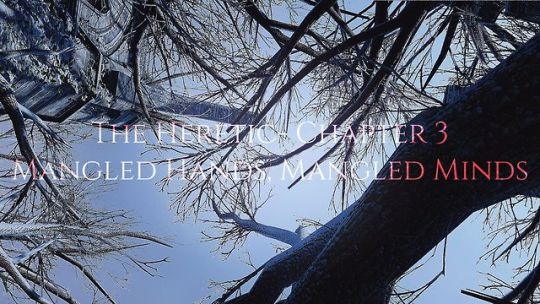
It's been a while. This chapter was hard to write. Lately it's been difficult to pull my thoughts together. I normally write scene by scene in no particular order and then string them together later on. Probably not the best way to do it. I hope you enjoy the third installment of the Heretic! In the near distance smoke climbed out of chimneys mixing in with the gray juggernauts adrift in the sky, burdened with rain or snow--I could not tell. Horses and a herd of feet had traveled this path, leading down to the village below. The Inquisition had been here. But there were no banners that occupied the front gate. Perhaps they already deemed this place inconsequential to my capture, considering I could not be located there. If they moved on, then many opportunities lie in those wooden structures and pastures full of hay. There was also a large possibility of a trap, beckoning me with warm houses and food for my horse. The need for comfort was overwhelming, diminishing reason's voice down to an ignorable whisper. I suppose I had let myself become spoiled, living on my mountain castle after all. The barn was distinguished as was its utter abandonment. A widow, outliving previous ownerships, enduring. Sitting alone in a giant pasture next to an imposing lake. There was no impressions left in the patchy snow of feet or livestock. However in the next enclosure there were cattle, it was a low lying fence, clearly not for horses but it would do, for now. It was on the edge of clustered farmsteads and the town bundled farther in. I loosened the mare's bridle to a point at which the bit hung under her muzzle. Now she could eat. I opened the gate and she trotted right to the yellow target in sight, not minding the cows and their wariness. This would be better than the tiny rations I put past her. Upon my investigation of the barn, I found an old pair of leather gloves, darker than midnight and thick as bark. Next to them was enchantment equipment. I stood perplexed, this is no ordinary barn. Sure there were stalls and a loft full of snow, but enchanting too? The structure itself was barely liveable. The chill was indomitable and bled right through the holes in the walls. The ceiling being the worst. It was a wonder in itself that it was still standing. It seemed like all was needed but a gust of wind to knock it over. I decided to keep the gloves. Although oversized, they were warm combined with the thinner gloves I had on. Amazingly the anchor's light could not penetrate through the gruff material. Hiding it, caging it, I was content not to see it. It had been a little over four days since my escape. I thought about Varania, Morigan and Dal'Nim. The replay in my head of everything that went so horribly wrong. With so much silence, it was monstrously loud in my head. Here, there were distractions. Noise to overpower the gnawing grind of worry. I ventured into the town alone, unknowing of what I would find. The village people acted how I expected in a settlement as small as this. It was large enough to have an inn for pilgrims and travelers and a chantry with a few stalls selling goods nearby. Trade was incredibly localized and self circulating. They must all work in harmony somehow. The locals carried on with their daily duties and left me alone. A few stared. Only for the purpose of gawking at an outsider. Not in four years had I experienced the luxury of being anonymous and unassuming until now. Leaving skyhold granted a cloak of incognitum. Without the parade of attendants, soldiers, banners and flashy armor; I was faceless. There was a food stall, it looked to be selling dried fruit and jerky. The primary meal of travelers, dried anything. Odd for a tiny village, especially off season but desperation drove me. "Hello traveler!" He waved me over, already seeing my slight approach. My feet led me to him. "Pardon me, you look like you've traveled far to get here. May I ask where you are from?" I browsed through his crude display, " Free Marches," technically, it was not a lie. "Heading up to Skyhold? Or maybe Orlais? Not often people traverse all the way down here for leisure." I sampled some of the jerky, not particularly worried about his probing questions. Simple conversation was welcome after the solitude I had endured. "I have never left the Free Marches, I thought I would explore Ferelden for a time." That's when I noticed he would not meet my eyes. He didn't dare look above my shoulders. The jerky tasted familiar too. "Is that so? Well I hope you enjoy yourself, though early spring is a bit nasty down here. More like a continuation of winter I say." "I will take all of your jerky and these and those there." I pointed. "We also have a Travelers basket! Would you like to see it?" I nodded. "All you ever need prepacked with a bow on top!" I sampled a second piece. My suspicion was confirmed. He came out from the back and presented it to me. Dried fish, Jerky, dried plums, figs and dates, last were a pouch of mixed nuts. "Are all of these locally sourced?" I pondered out loud. "Of course!" "I'll take this instead." He smiled brightly and I gave him the required coin. I emptied the basket immediately into my pack. I noticed him peering into it. When he saw the lack of space he commented, "We have the most wonderful selections of aged cheese, Inquisitor." He realized his mistake. Wide eyed he stared at me and his lips quivered. "Did that come from Skyhold's stores as well?" I stared back and revealed a sliver of my dagger, just enough to twinkle in the reflection of his straining eyes. "Was it Leliana? Are you hers?" Voice low and guarded but he still heard it. "H-have m-m-mercy." He stuttered. "I won't ask again." My eyes narrowing in on his hazel ones. He nodded. I took off towards the barn and he sunk behind the stand in relief. Was everyone in this town planted here? I had to leave immediately. This time everyone looked, and in their eyes they knew. Out of doors, windows and small alleys they revealed themselves. Following after me slowly, they were in no rush. The cold air stung my lungs like a nest of bees and I coughed as I ran. The pack trembled against by back and my legs were much in the same situation. The barn was insight and I noticed I was being herded right there by the spy's behind me. That's when I halted all movement just a few strides away from the barn. There was a heavy crunching of snow and squishing of mud. The inquisition's army filled out from behind it. 700 foot soldiers and 300 Calvary, among them was Commander Cullen. He stepped out of the shadows casted by the barn. The spy's caught up and finished the circle. I was completely surrounded. Cullen strolled towards me, unafraid. Still too trusting in his former leader to expect hostility. I relaxed my posture and slowed my breathing. He held his hand up when his army followed, still they readied their weapons just in case. All of them wanted a drop of my blood, I could see it in their barely hidden rage. "Inquisitor." He breathed. "Commander." I acknowledged him coldly. "You need to return with me." It was a thinly veiled order. "Cullen, I am disappointed." His face lit up in alarm. "You moved our army without my command." Granted it was only a portion. It could still be considered an act of treason. "I never expected you to turn rogue." It took him a while to gather his thoughts. He sighed heavily and grimaced, making his sleepless nights well defined on his face. "This isn't--enough, you are surrounded. You can't slip out this time!" He rose his voice and the army took one step closer. Cullen lowered his mouth to my ear. "Come with me. Come back to Skyhold." He placed his hand on the gold corded grip of his sword and the other on my shoulder. "Do not make me kill you." It came out gruffly but it was no more than a plead. "This doesn't need to become worse than it already is..." I turned my head to stare into his eyes, "You are correct. It doesn't. Call off the army." It was a command. Old habits caused him to stand straight and accept but he resisted it. He looked crushed, the weight of what had to come next made his shoulders sag. "Be reasonable." He whispered hoarsely. "Stop hesitating." I growled. I was challenging him and he knew it. "I cannot use a Commander who lets emotional burdens stop his blade! See to your duty!" He grabbed me by the forearms, "Bring me the shackles!" A lone soldier darted out with said instrument in hand. It was then I fulfilled something only he and I knew about. I stretched up and stole his dry lips, he froze and so did the shackles boy. An unspoken affection. One last wish. "Inquisi--" I head butted him and he fell backwards on to the lad with the shackles. A war cry was torn out of a soldier's throat and they charged. The chaos began. I back flipped and in mid air delivered a shower of daggers. I hit the ground and into a black cloud pluming in every direction. Their arrows flew into it, but I was already gone. I hurried to any exit but found there was none. I would have to make one. An indecisive Archer stood still with his weapon raised. There was so much confusion that the army started slaying each other, he simply didn't know where to aim. I rushed him and slung a small dagger at his throat. He choked and sent his arrow flying into another archer's horse, sending it to the ground. I pushed him off and at that time my shroud of invisibility had dissipated. I took the horse and kicked it into a full gallop. "After her!" I heard Cullen roar. "Permission to engage!" My hardened heart cracked a little, I knew it was coming, everything so far had been leading up to it. To hear him say it, that they were given authority over my death, brought me to my knees. We neared the frozen lake and despite the horse's protest continued on to it. It was rather hard to distinguish the ice from the surrounding pasture other than a few handfuls of tall weeds by the shore. The ice gave way under it's hooves and an arrow sliced my cheek. I collapsed onto the ice, sliding for a bit, the arrows skidded past me. I scrambled to my feet and another arrow pinned my right leg. I didn't stop. In the center of the reservoir was a fishing hole. Now on foot I didn't stand a chance against the men on horses. I could hear the cracking in the ice as more soldiers and horses boarded it. They weren't thinking anymore, no longer individuals, they became a single functioning wave of wraith. "Halt!" I heard Cullen call out. I didn't dare look back, I could feel their breath on my neck. Their horses screamed as the ice broke underneath, one by one they were going down. They were right behind me. I lurched toward the hole without a plan. "Inquisitor!" His fingertips barely holding on to my pack as I ripped myself from him and plunged into the freezing depths. Arrows followed me into the murky abyss. Spinning with bubbles inches from my head. The chill decreased my rapid strokes. Soon my breath would let out. Frantic, I swam in the direction of what I believed to be the shore. I didn't make it far. Gagging and In a frenzy, I drove my daggers into the ice above, cutting and slashing, grinding my way out. Blackness pricked at my eyes and my mind grew foggy. Up and down, up and down I repeated in my head. Eventually less and less pressure was applied to the ice and my grip faltered as I stabbed at my icy imprisonment. My body stiffened and I could hardly move. 'You must come up for air sometime, Inquisitor. Otherwise you'll drown.' her voice creeped into my head somewhere distant. I drew in gasping breaths of the blackness that was consuming me. 'I knew her. The kitchen server with the chestnut long hair. So long that when braided, it wrapped around her head twice. Now it was splintered and frizzy forming a fuzzy halo snaking around her head. An assortment of bodily fluids puddled at the woman's bound feet, though, no one paid any mind. Her elbows tied back to the arms of the chair, she sat motionless. Dainty fingers resembled talons of the predetory kind. Twisted and skewed at sharp angles; broken in all places. They hung limp from the pain. Hot brands of the label "traitor" singed into her forehead and cheeks. Teeth had been dug out by the roots, caking blood to her lips and chin. Describing her current appearance as haggard would be putting it nicely. Yet her head and neck remained defiant. She met Leliana's cold glare with her own and with an added smirk. This was the kind Elvhen girl who brought me sweet cakes late into night unprompted, when I was still knee deep in analyzing reports just hours before dawn. Her catch phrase always the same, "You must come up for air sometime, Inquisitor. Otherwise you'll drown." Bodies of her comrads either left piled on the floor or lifelessly strung from the dungeon ceiling, deceased from the excessive torture. Faces almost unrecognizable and distorted. She was the last thorn stuck in leliana's side and the most quiet. Much to her withheld frustration. "Your strength will not last you." Leliana circled the withering elf. "Your leader will not save you. Clearly he did not come for the others." I swayed on my feet, noticeably agitated with my arms crossed. Days had gone by and no answers were found. "Be patient Inquisitor, fingers are easy to break but minds can be much harder." Leliana's second in command whispered into my ear. She stopped in front of her and pulled her hair back sharply. "Your silence gains you nothing." Leliana did not need to raise her voice to be frightening. Rather, it was her collected and calm demeanor that was most unnerving. It could rattle the bones of any prisoner caught in her question. "You and that gang whom targeted key members of the Inquisition and that of the Herald herself is an unforgivable treasonous act." "Ah, Sister Nightingale, denial is such an ugly color on you" The servent gave a toothless grin, "You wish so desperately to pull the herald into this...that you imagine one of us holding a knife to her neck to misconstrue the obvious truth? When you know not one of us infiltrated her chambers that night. Not a single strand on her head touched..." "Enough!" "Who Do You Work For?!" 'She raised a shaking hand and pointed a crooked finger at me. My eyes followed her fingernail up her arm and into her steadfast eyes. Her mouth curling at the ends, she aimed her gaze, hurling a silent dialogue at my own , not caring if I understood or not. "Don't you dare look at her." Leliana seethed. Slowly she tilted her head back to leliana and cursed "May the dread wolf take you." Her body convulsed and the chair shook with each thrash. "Shit! Get her still!" The room erupted in chaos. "We need her alive! Keep her conscious damn it!" I could not die this way, not yet! I felt the ice give and pockets of light could now be seen sinking into the frigid water. One more push. With every little crumb of might I had left, I slammed my daggers into the unyielding surface and they broke through. Just before I lost consciousness I was hauled out of the water roughly. "Are you fucking mad?!" Cullen vented. I sputtered and coughed, water seizing the new air in my lungs. It felt like the water in my lungs were freezing all over again from the chilly air. "I will die on my terms." I grunted. "No. You are hereby in my custody, Moon'Hwa." It was the first time he said my name. He held on to me, locked me in his arms as I shivered. I whistled, choppy and unclear but it would have to do. "Don't you dare." He warned. Luckily, I knew the gaps in his armor. A pounding of hooves could be heard in the distance. "Inquisitor!" He screamed into my ear. His pent up stress released into my title. Now he was shaking. He pushed me forward abruptly and I almost face planted into the creaking ice. His horsemen had backed off of the ice, hoping not to lose any more numbers but the footsoldiers stood not 30 steps away. He pulled out his sword and held it to my chin. Struggling to keep it steady, "I will...not hesitate." He whispered, eyes bearing great pain. I lunged for him and my knives met his sword. "You will not stand between me and Fen'Harel." I eyed my horse cantering along the bank and so did he. The sword swung and almost lacerated my neck, making me focus back on him. Tears were crawling down his cheek as I countered another jab. His soldiers were restless, waiting for a command to kill. He pushed his weight into me and I barely held his blade back. With a roar he swung down and I dashed to the right, targeting the gap and slicing my blade right through it. Arrows pelted into my heavy leather duster and I retracted the dagger. He fell to his knee, punching the sword into the ice to balance himself. I ran and did not look back. My horse was trotting uneasily by the shore. The men were charging after me, some falling into thin pockets of the ice and others slipping. I leapt into the saddle and we raced to the cover the surrounding forest provided. I cried out when an arrow tore into the flesh of my forearm. Ducking, I held on to the horse's neck for dear life and we cloaked ourselves behind the trees and boulders. Hopefully the next chapter won't take so long.
#solavellan#theheretic#moonhwa#lavellan#fanfic#daifanfic#dragonageinquisition#dai#dragonage#dragonagefanfic#fanfiction#dragon age inquisition#da: inquisition#rogue
1 note
·
View note
Link
The True Story of the ‘Free State of Jones’
A new Hollywood movie looks at the tale of the Mississippi farmer who led a revolt against the Confederacy By Richard Grant.
With two rat terriers trotting at his heels, and a long wooden staff in his hand, J.R. Gavin leads me through the woods to one of the old swamp hide-outs. A tall white man with a deep Southern drawl, Gavin has a stern presence, gracious manners and intense brooding eyes. At first I mistook him for a preacher, but he’s a retired electronic engineer who writes self-published novels about the rapture and apocalypse. One of them is titled Sal Batree, after the place he wants to show me.
I’m here in Jones County, Mississippi, to breathe in the historical vapors left by Newton Knight, a poor white farmer who led an extraordinary rebellion during the Civil War. With a company of like-minded white men in southeast Mississippi, he did what many Southerners now regard as unthinkable. He waged guerrilla war against the Confederacy and declared loyalty to the Union.
In the spring of 1864, the Knight Company overthrew the Confederate authorities in Jones County and raised the United States flag over the county courthouse in Ellisville. The county was known as the Free State of Jones, and some say it actually seceded from the Confederacy. This little-known, counterintuitive episode in American history has now been brought to the screen in Free State of Jones, directed by Gary Ross (Seabiscuit, The Hunger Games) and starring a grimy, scruffed-up Matthew McConaughey as Newton Knight.
Knight and his men, says Gavin, hooking away an enormous spider web with his staff and warning me to be careful of snakes, “had a number of different hide-outs. The old folks call this one Sal Batree. Sal was the name of Newt’s shotgun, and originally it was Sal’s Battery, but it got corrupted over the years.”
We reach a small promontory surrounded on three sides by a swampy, beaver-dammed lake, and concealed by 12-foot-high cattails and reeds. “I can’t be certain, but a 90-year-old man named Odell Holyfield told me this was the place,” says Gavin. “He said they had a gate in the reeds that a man on horseback could ride through. He said they had a password, and if you got it wrong, they’d kill you. I don’t know how much of that is true, but one of these days I’ll come here with a metal detector and see what I can find.”
We make our way around the lakeshore, passing beaver-gnawed tree stumps and snaky-looking thickets. Reaching higher ground, Gavin points across the swamp to various local landmarks. Then he plants his staff on the ground and turns to face me directly.
“Now I’m going to say something that might offend you,” he begins, and proceeds to do just that, by referring in racist terms to “Newt’s descendants” in nearby Soso, saying some of them are so light-skinned “you look at them and you just don’t know.”
I stand there writing it down and thinking about William Faulkner, whose novels are strewn with characters who look white but are deemed black by Mississippi’s fanatical obsession with the one-drop rule. And not for the first time in Jones County, where arguments still rage about a man born 179 years ago, I recall Faulkner’s famous axiom about history: “The past is never dead. It’s not even past.”
After the Civil War, Knight took up with his grandfather’s former slave Rachel; they had five children together. Knight also fathered nine children with his white wife, Serena, and the two families lived in different houses on the same 160-acre farm. After he and Serena separated—they never divorced—Newt Knight caused a scandal that still reverberates by entering a common-law marriage with Rachel and proudly claiming their mixed-race children.
The Knight Negroes, as these children were known, were shunned by whites and blacks alike. Unable to find marriage partners in the community, they started marrying their white cousins instead, with Newt’s encouragement. (Newt’s son Mat, for instance, married one of Rachel’s daughters by another man, and Newt’s daughter Molly married one of Rachel’s sons by another man.) An interracial community began to form near the small town of Soso, and continued to marry within itself.
“They keep to themselves over there,” says Gavin, striding back toward his house, where supplies of canned food and muscadine wine are stored up for the onset of Armageddon. “A lot of people find it easier to forgive Newt for fighting Confederates than mixing blood.”
I came to Jones County having read some good books about its history, and knowing very little about its present-day reality. It was reputed to be fiercely racist and conservative, even by Mississippi standards, and it had been a hotbed for the Ku Klux Klan. But Mississippi is nothing if not layered and contradictory, and this small, rural county has also produced some wonderful creative and artistic talents, including Parker Posey, the indie-film queen, the novelist Jonathan Odell, the pop singer and gay astronaut Lance Bass, and Mark Landis, the schizophrenic art forger and prankster, who donated fraudulent masterpieces to major American art museums for nearly 30 years before he was caught.
Driving toward the Jones County line, I passed a sign to Hot Coffee—a town, not a beverage—and drove on through rolling cattle pastures and short, new-growth pine trees. There were isolated farmhouses and prim little country churches, and occasional dilapidated trailers with dismembered automobiles in the front yard. In Newt Knight’s day, all this was a primeval forest of enormous longleaf pines so thick around the base that three or four men could circle their arms around them. This part of Mississippi was dubbed the Piney Woods, known for its poverty and lack of prospects. The big trees were an ordeal to clear, the sandy soil was ill-suited for growing cotton, and the bottomlands were choked with swamps and thickets.
There was some very modest cotton production in the area, and a small slaveholding elite that included Newt Knight’s grandfather, but Jones County had fewer slaves than any other county in Mississippi, only 12 percent of its population. This, more than anything, explains its widespread disloyalty to the Confederacy, but there was also a surly, clannish independent spirit, and in Newt Knight, an extraordinarily steadfast and skillful leader.
On the county line, I was half-expecting a sign reading “Welcome to the Free State of Jones” or “Home of Newton Knight,” but the Confederacy is now revered by some whites in the area, and the chamber of commerce had opted for a less controversial slogan: “Now This Is Living!” Most of Jones County is rural, low- or modest-income; roughly 70 percent of the population is white. I drove past many small chicken farms, a large modern factory making transformers and computers, and innumerable Baptist churches. Laurel, the biggest town, stands apart. Known as the City Beautiful, it was created by Midwestern timber barons who razed the longleaf pine forests and built themselves elegant homes on oak-lined streets and the gorgeous world-class Lauren Rogers Museum of Art.
The old county seat, and ground zero for the Free State of Jones, is Ellisville, now a pleasant, leafy town of 4,500 people. Downtown has some old brick buildings with wrought-iron balconies. The grand old columned courthouse has a Confederate monument next to it, and no mention of the anti-Confederate rebellion that took place here. Modern Ellisville is dominated by the sprawling campus of Jones County Junior College, where a semiretired history professor named Wyatt Moulds was waiting for me in the entrance hall. A direct descendant of Newt Knight’s grandfather, he was heavily involved in researching the film and ensuring its historical accuracy.
A large, friendly, charismatic man with unruly side-parted hair, he was wearing alligator-skin cowboy boots and a fishing shirt. “I’m one of the few liberals you’re going to meet here, but I’m a Piney Woods liberal,” he said. “I voted for Obama, I hunt and I love guns. It’s part of the culture here. Even the liberals carry handguns.”
He described Jones County as the most conservative place in Mississippi, but he noted that race relations were improving and that you could see it clearly in the changing attitudes toward Newt Knight. “It’s generational,” he said. “A lot of older people see Newt as a traitor and a reprobate, and they don’t understand why anyone would want to make a movie about him. If you point out that Newt distributed food to starving people, and was known as the Robin Hood of the Piney Woods, they’ll tell you he married a black, like that trumps everything. And they won’t use the word ‘black.’”
His current crop of students, on the other hand, are “fired up” about Newt and the movie. “Blacks and whites date each other in high school now, and they don’t think it’s a big deal,” said Moulds. “That’s a huge change. Some of the young guys are really identifying with Newt now, as a symbol of Jones County pride. It doesn’t hurt that he was such a badass.”
Knight was 6-foot-4 with black curly hair and a full beard—“big heavyset man, quick as a cat,” as one of his friends described him. He was a nightmarish opponent in a backwoods wrestling match, and one of the great unsung guerrilla fighters in American history. So many men tried so hard to kill him that perhaps his most remarkable achievement was to reach old age.
“He was a Primitive Baptist who didn’t drink, didn’t cuss, doted on children and could reload and fire a double-barreled, muzzle-loading shotgun faster than anyone else around,” said Moulds. “Even as an old man, if someone rubbed him the wrong way, he’d have a knife at their throat in a heartbeat. A lot of people will tell you that Newt was just a renegade, out for himself, but there’s good evidence that he was a man of strong principles who was against secession, against slavery and pro-Union.”
Those views were not unusual in Jones County. Newt’s right-hand man, Jasper Collins, came from a big family of staunch Mississippi Unionists. He later named his son Ulysses Sherman Collins, after his two favorite Yankee generals, Ulysses S. Grant and William T. Sherman. “Down here, that’s like naming your son Adolf Hitler Collins,” said Moulds.
When secession fever swept across the South in 1860, Jones County was largely immune to it. Its secessionist candidate received only 24 votes, while the “cooperationist” candidate, John H. Powell, received 374. When Powell got to the secession convention in Jackson, however, he lost his nerve and voted to secede along with almost everyone else. Powell stayed away from Jones County for a while after that, and he was burned in effigy in Ellisville.
“In the Lost Cause mythology, the South was united, and secession had nothing to do with slavery,” said Moulds. “What happened in Jones County puts the lie to that, so the Lost Causers have to paint Newt as a common outlaw, and above all else, deny all traces of Unionism. With the movie coming out, they’re at it harder than ever.”
Although he was against secession, Knight voluntarily enlisted in the Confederate Army once the war began. We can only speculate about his reasons. He kept no diary and gave only one interview near the end of his life, to a New Orleans journalist named Meigs Frost. Knight said he’d enlisted with a group of local men to avoid being conscripted and then split up into different companies. But the leading scholar of the Knight-led rebellion, Victoria Bynum, author of The Free State of Jones, points out that Knight had enlisted, under no threat of conscription, a few months after the war began, in July 1861. She thinks he relished being a soldier.
In October 1862, after the Confederate defeat at Corinth, Knight and many other Piney Woods men deserted from the Seventh Battalion of Mississippi Infantry. It wasn’t just the starvation rations, arrogant harebrained leadership and appalling carnage. They were disgusted and angry about the recently passed “Twenty Negro Law,” which exempted one white male for every 20 slaves owned on a plantation, from serving in the Confederate Army. Jasper Collins echoed many non-slaveholders across the South when he said, “This law...makes it a rich man’s war and a poor man’s fight.”
Returning home, they found their wives struggling to keep up the farms and feed the children. Even more aggravating, the Confederate authorities had imposed an abusive, corrupt “tax in kind” system, by which they took what they wanted for the war effort— horses, hogs, chickens, corn, meat from the smokehouses, homespun cloth. A Confederate colonel named William N. Brown reported that corrupt tax officials had “done more to demoralize Jones County than the whole Yankee Army.”
In early 1863, Knight was captured for desertion and possibly tortured. Some scholars think he was pressed back into service for the Siege of Vicksburg, but there’s no solid evidence that he was there. After Vicksburg fell, in July 1863, there was a mass exodus of deserters from the Confederate Army, including many from Jones and the surrounding counties. The following month, Confederate Maj. Amos McLemore arrived in Ellisville and began hunting them down with soldiers and hounds. By October, he had captured more than 100 deserters, and exchanged threatening messages with Newt Knight, who was back on his ruined farm on the Jasper County border.
On the night of October 5, Major McLemore was staying at his friend Amos Deason’s mansion in Ellisville, when someone—almost certainly Newt Knight—burst in and shot him to death. Soon afterward, there was a mass meeting of deserters from four Piney Woods counties. They organized themselves into a company called the Jones County Scouts and unanimously elected Knight as their captain. They vowed to resist capture, defy tax collectors, defend each other’s homes and farms, and do what they could to aid the Union.
Neo-Confederate historians have denied the Scouts’ loyalty to the Union up and down, but it was accepted by local Confederates at the time. “They were Union soldiers from principle,” Maj. Joel E. Welborn, their former commanding officer in the Seventh Mississippi, later recalled. “They were making an effort to be mustered into the U.S. Service.” Indeed, several of the Jones County Scouts later succeeded in joining the Union Army in New Orleans.
In March 1864, Lt. Gen. Leonidas Polk informed Jefferson Davis, the president of the Confederacy, that Jones County was in “open rebellion” and that guerrilla fighters were “proclaiming themselves ‘Southern Yankees.’” They had crippled the tax collection system, seized and redistributed Confederate supplies, and killed and driven out Confederate officials and loyalists, not just in Jones County but all over southeast Mississippi. Confederate Capt. Wirt Thompson reported that they were now a thousand strong and flying the U.S. flag over the Jones County courthouse—“they boast of fighting for the Union,” he added.
That spring was the high-water mark of the rebellion against the Rebels. Polk ordered two battle-hardened regiments into southeast Mississippi, under the command of Piney Woods native Col. Robert Lowry. With hanging ropes and packs of vicious, manhunting dogs, they subdued the surrounding counties and then moved into the Free State of Jones. Several of the Knight company were mangled by the dogs, and at least ten were hanged, but Lowry couldn’t catch Knight or the core group. They were deep in the swamps, being supplied with food and information by local sympathizers and slaves, most notably Rachel.
After Lowry left, proclaiming victory, Knight and his men emerged from their hide-outs, and once again, began threatening Confederate officials and agents, burning bridges and destroying railroads to thwart the Rebel Army, and raiding food supplies intended for the troops. They fought their last skirmish at Sal’s Battery, also spelled Sallsbattery, on January 10, 1865, fighting off a combined force of cavalry and infantry. Three months later, the Confederacy fell.
In 2006, the filmmaker Gary Ross was at Universal Studios, discussing possible projects, when a development executive gave him a brief, one-page treatment about Newton Knight and the Free State of Jones. Ross was instantly intrigued, both by the character and the revelation of Unionism in Mississippi, the most deeply Southern state of all.
“It led me on a deep dive to understand more and more about him and the fact that the South wasn’t monolithic during the Civil War,” says Ross, speaking on the phone from New York. “I didn’t realize it was going to be two years of research before I began writing the screenplay.”
The first thing he did was take a canoe trip down the Leaf River, to get a feel for the area. Then he started reading, beginning with the five (now six) books about Newton Knight. That led into broader reading about other pockets of Unionism in the South. Then he started into Reconstruction.
“I’m not a fast reader, nor am I an academic,” he says, “although I guess I’ve become an amateur one.” He apprenticed himself to some of the leading authorities in the field, including Harvard’s John Stauffer and Steven Hahn at the University of Pennsylvania. (At the urging of Ross, Stauffer and co-author Sally Jenkins published their own book on the Jones County rebellion, in 2009.) Ross talks about these scholars in a tone of worship and adulation, as if they’re rock stars or movie stars—and none more so than Eric Foner at Columbia, the dean of Reconstruction experts.
“He is like a god, and I went into his office, and I said, ‘My name’s Gary Ross, I did Seabiscuit.’ I asked him a bunch of questions about Reconstruction, and all he did was give me a reading list. He was giving me no quarter. I’m some Hollywood guy, you know, and he wanted to see if I could do the work.”
Ross worked his way slowly and carefully through the books, and went back with more questions. Foner answered none of them, just gave him another reading list. Ross read those books too, and went back again with burning questions. This time Foner actually looked at him and said, “Not bad. You ought to think about studying this.”
“It was the greatest compliment a person could have given me,” says Ross. “I remember walking out of his office, across the steps of Columbia library, almost buoyant. It was such a heady experience to learn for learning’s sake, for the first time, rather than to generate a screenplay. I’m still reading history books all the time. I tell people this movie is my academic midlife crisis.”
In Hollywood, he says, the executives were extremely supportive of his research, and the script that he finally wrestled out of it, but they balked at financing the film. “This was before Lincoln and 12 Years a Slave, and it was very hard to get this sort of a drama made. So I went and did Hunger Games, but always keeping an eye on this. ”
Matthew McConaughey thought the Free State of Jones script was the most exciting Civil War story he had ever read, and knew immediately that he wanted to play Newt Knight. In Knight’s defiance of both the Confederate Army and the deepest taboos of Southern culture McConaughey sees an uncompromising and deeply moral leader. He was “a man who lived by the Bible and the barrel of a shotgun,” McConaughey says in an email. “If someone—no matter what their color—was being mistreated or being used, if a poor person was being used by someone to get rich, that was a simple wrong that needed to be righted in Newt’s eyes....He did so deliberately, and to the hell with the consequences.” McConaughey sums him up as a “shining light through the middle of this country’s bloodiest fight. I really kind of marveled at him.”
The third act of the film takes place in Mississippi after the Civil War. There was a phase during early Reconstruction when blacks could vote, and black officials were elected for the first time. Then former Confederates violently took back control of the state and implemented a kind of second slavery for African-Americans. Once again disenfranchised, and terrorized by the Klan, they were exploited through sharecropping and legally segregated. “The third act is what makes this story feel so alive,” says McConaughey. “It makes it relevant today. Reconstruction is a verb that’s ongoing.”
Ross thinks Knight’s character and beliefs are most clearly revealed by his actions after the war. He was hired by the Reconstruction government to free black children from white masters who were refusing to emancipate them. “In 1875, he accepts a commission in what was essentially an all-black regiment,” says Ross. “His job was to defend the rights of freed African-Americans in one of Mississippi’s bloodiest elections. His commitment to these issues never waned.” In 1876, Knight deeded 160 acres of land to Rachel, making her one of very few African-American landowners in Mississippi at that time.
Much as Ross wanted to shoot the movie in Jones County, there were irresistible tax incentives to film across the border in Louisiana, and some breathtaking cypress swamps where various cast members were infested with the tiny mites known as chiggers. Nevertheless, Ross and McConaughey spent a lot of time in Jones County, persuading many county residents to appear in the film.
“I love the Leaf River and the whole area,” says Ross. “And I’ve grown to love Mississippi absolutely. It’s a very interesting, real and complicated place.”
On the website of Jones County Rosin Heels, the local chapter of the Sons of the Confederate Veterans, an announcement warned that the film will portray Newt Knight as a civil rights activist and a hero. Then the writer inadvertently slips into the present tense: “He is actually a thief, murderer, adulterer and a deserter.”
Doug Jefcoate was listed as camp commander. I found him listed as a veterinarian in Laurel, and called up, saying I was interested in his opinions on Newt Knight. He sounded slightly impatient, then said, “OK, I’m a history guy and a fourth-generation guy. Come to the animal hospital tomorrow.”
The receptionist led me into a small examining room and closed both its doors. I stood there for a few long minutes, with a shiny steel table and, on the wall, a Bible quotation. Then Jefcoate walked in, a middle-aged man with sandy hair, glasses and a faraway smile. He was carrying two huge, leather-bound volumes of his family genealogy.
He gave me ten minutes on his family tree, and when I interrupted to ask about the Rosin Heels and Newt Knight, he stopped, looked puzzled, and began to chuckle. “You’ve got the wrong Doug Jefcoate,” he said. “I’m not that guy.” (Turns out he is Doug Jefcoat, without the “e.”)
He laughed uproariously, then settled down and gave me his thoughts. “I’m not a racist, OK, but I am a segregationist,” he said. “And ol’ Newt was skinny-dipping in the wrong pool.”
The Rosin Heel commander Doug Jefcoate wasn’t available, so I went instead to the law offices of Carl Ford, a Rosin Heel who had unsuccessfully defended Sam Bowers, the imperial wizard of the White Knights of the Ku Klux Klan, in his 1998 trial for the 1966 murder of civil rights activist Vernon Dahmer. Ford wasn’t there, but he’d arranged for John Cox, a friend, colleague and fellow Rosin Heel, to set me straight about Newt Knight.
Cox, an animated 71-year-old radio and television announcer with a long white beard, welcomed me into a small office crammed with video equipment and Confederate memorabilia. He was working on a film called Free State of Jones: The Republic That Never Was, intended to refute Gary Ross’ film. All he had so far was the credits (Executive Producer Carl Ford) and the introductory banjo music.
“Newt is what we call trailer trash,” he said in a booming baritone drawl. “I wouldn’t have him in my house. And like all poor, white, ignorant trash, he was in it for himself. Some people are far too enamored of the idea that he was Martin Luther King, and these are the same people who believe the War Between the States was about slavery, when nothing could be further from the truth.”
There seemed no point in arguing with him, and it was almost impossible to get a word in, so I sat there scribbling as he launched into a long monologue that defended slavery and the first incarnation of the Klan, burrowed deep into obscure Civil War battle minutiae, denied all charges of racism, and kept circling back to denounce Newt Knight and the simpering fools who tried to project their liberal agendas on him.
“There was no Free State of Jones,” he concluded. “It never existed.”
Joseph Hosey is a Jones County forester and wild mushroom harvester who was hired as an extra for the movie and ended up playing a core member of the Knight Company. Looking at him, there’s no reason to ask why. Scruffy and rail-thin with piercing blue eyes and a full beard, he looks like he subsists on Confederate Army rations and the occasional squirrel.
He wanted to meet me at Jitters Coffeehouse & Bookstore in Laurel, so he could show me an old map on the wall. It depicts Jones County as Davis County, and Ellisville as Leesburg. “After 1865, Jones County was so notorious that the local Confederates were ashamed to be associated with it,” he says. “So they got the county renamed after Jefferson Davis, and Ellisville after Robert E. Lee. A few years later, there was a vote on it, and the names were changed back. Thank God, because that would have sucked.”
Like his grandfather before him, Hosey is a great admirer of Newt Knight. Long before the film, when people asked where he was from, he would say, “The Free State of Jones.” Now he has a dog named Newt, and describes it as a “Union-blue Doberman.”
Being in the film, acting and interacting with Matthew McConaughey, was a profound and moving experience, but not because of the actor’s fame. “It was like Newt himself was standing right there in front of me. It made me really wish my grandfather was still alive, because we were always saying someone should make a movie about Newt.” Hosey and the other actors in the Knight Company bonded closely during the shoot and still refer to themselves as the Knight Company. “We have get-togethers in Jones County, and I imagine we always will,” he says.
I ask him what he admires most about Knight. “When you grow up in the South, you hear all the time about your ‘heritage,’ like it’s the greatest thing there is,” he says. “When I hear that word, I think of grits and sweet tea, but mostly I think about slavery and racism, and it pains me. Newt Knight gives me something in my heritage, as a white Southerner, that I can feel proud about. We didn’t all go along with it.”
After Reconstruction, with the former Confederates back in charge, the Klan after him, and Jim Crow segregation laws being passed, Knight retreated from public life to his homestead on the Jasper County border, which he shared with Rachel until her death in 1889, and continued to share with her children and grandchildren. He lived the self-sufficient life of a yeoman Piney Woods farmer, doted on his swelling ranks of children and grandchildren, and withdrew completely from white society.
He gave that single long interview in 1921, revealing a laconic sense of humor and a strong sense of right and wrong, and he died the following year, in February 1922. He was 84 years old. Joseph Hosey took me to Newt’s granddaughter’s cabin, where some say that he suffered a fatal heart attack while dancing on the porch. Hosey really wanted to take me to Newt Knight’s grave. But the sacred rite of hunting season was underway, and the landowner didn’t want visitors disturbing the deer in the area. So Hosey drove up to the locked gate, and then swiped up the relevant photographs on his phone.
Newt’s grave has an emblem of Sal, his beloved shotgun, and the legend, “He Lived For Others.” He’d given instructions that he should be buried here with Rachel. “It was illegal for blacks and whites to be buried in the same cemetery,” says Hosey. “Newt didn’t give a damn. Even in death, he defied them.”
There were several times in Jones County when my head began to swim.
During my final interview, across a brightly colored plastic table in the McDonald’s in Laurel, there were moments when my brain seized up altogether, and I would sit there stunned, unable to grasp what I was hearing. The two sisters sitting across the table were gently amused. They had seen this many times before. It was, in fact, the normal reaction when they tried to explain their family tree to outsiders.
Dorothy Knight Marsh and Florence Knight Blaylock are the great-granddaughters of Newt and Rachel. After many decades of living in the outside world, they are back in Soso, Mississippi, dealing with prejudice from all directions. The worst of it comes from within their extended family. “We have close relatives who won’t even look at us,” says Blaylock, the older sister, who was often taken for Mexican when she lived in California.
“Or they’ll be nice to us in private, and pretend they don’t know us in public,” added Marsh, who lived in Washington, D.C. for decades. For simplification, she said that there were three basic groups. The White Knights are descended from Newt and Serena, are often pro-Confederate, and proud of their pure white bloodlines. (In 1951, one of them, Ethel Knight, published a vitriolic indictment of Newt as a traitor to the Confederacy.) The Black Knights are descended from Newt’s cousin Dan, who had children with one of his slaves. The White Negroes (a.k.a. the Fair Knights or Knight Negroes) are descended from Newt and Rachel. “They all have separate family reunions,” said Blaylock.
The White Negro line was complicated further by Georgeanne, Rachel’s daughter by another white man. After Rachel died, Newt and Georgeanne had children. “He was a family man all right!” said Marsh. “I guess that’s why he had three of them. And he kept trying to marry out the color, so we would all keep getting lighter-skinned. We have to tell our young people, do not date in the Soso area. But we’re all fine. We don’t have any...problems. All Knights are hardworking and very capable.”
In the film, Marsh and Blaylock appear briefly in a courthouse scene. For the two of them, the Knight family saga has continued into the 20th century and beyond. Their cousin Davis Knight, who looked white and claimed to be white, was tried for the crime of miscegenation in 1948, after marrying a white woman. The trial was a study in Mississippian absurdity, paradox, contradiction and racial obsessiveness. A white man was convicted of being black; the conviction was overturned; he became legally white again.
“We’ve come to terms with who we are,” says Blaylock. “I’m proud to be descended from Newt and Rachel. I have so much respect for both of them.”
“Absolutely,” says Marsh. “And we can’t wait to see this movie.”
0 notes
Text
Hunter One Shot
The rag in my right hand slapped against the hood of my Ford Escape as I washed the dried bugs from the hood and front bumper. It was a hot day in the August heat of Texas reaching close to 100 degrees and above 90% humidity. Sweat was dripping down my skin and saturating my thin green cotton tank top and cut off shorts as I ran the soapy rag over the small SUV. I stood up to stretch arching my back when I heard the thumping rock bass of a classic rock song from the 80's caught my attention, and I glanced over to the vacuum cleaners in front of the washing bay where I was parked. A '67 black Impala with Kansas license plates was parked less than 20 feet away from me with the front doors open and the stereo blasting over the roar of the vacuum. The chrome was polished and the black paint job was well waxed and freshly washed. It was the epitome of American made classic car and I admired the detail as it was obviously well cared for. Next to the passenger door, I noticed long legs and a very fine masculine ass swinging to the beat of the song. As he kneeled on the front seat to reach across, I saw he was wearing rugged brown leather hiking boots. I didn't want to be caught gawking, so I quickly turned back to washing my car. Since I happen to like the classic Def Leppard song playing, I started swinging my hips and dancing to the beat and singing "Pour Some Sugar on Me". I was really getting into the music as I washed my car when I suddenly noticed the man with the Impala had finished and was staring at me as he leaned against the trunk. His long legs were crossed at the ankles and his well muscled arms were crossed over his t-shirt clad broad chest. I couldn't help but slide my eyes up his body taking in the narrow waist, tight abs, well defined shoulders and thick neck. His chin was a little scruffy like it had been at least two days since a razor had touched it. His full lips were stretched into a huge smile of white teeth as he watched me and his jaw was square with a little dimple in the center of his chin. I couldn't see the color of his eyes behind the dark sunglasses perched on his nose and his hair was a darker blonde color pushed off his forehead with gel. I shot him a flirty smile back since he was very attractive, and I didn't mind the audience since I was enjoying to music. I went back to washing my Escape. When I heard the car wash sprayer turn on I looked up over the top of my car, and I saw the tall man rinsing the side I had already washed. "Thanks." I said. "No, problem. Since I enjoyed your dancing to my music, I thought I'd help you finish so I could introduce myself." His voice was a deep baritone that sent a shiver down my spine. We finished washing my Escape together. I poured the soapy bucket into the drain and rinsed the rag in the sprayer. Shutting off the water, the man turned around and held out his hand. "Hi, I'm Dean." "Nice to meet you. I'm Rachel." I smiled up at Dean since he was about six inches taller than me and took his large hand into my smaller one. He was very sexy and appeared to be in his mid-thirties. Goosebumps traveled up my arm when I felt his fingers softly stroke my sensitive palm. His bright white smile widened and crinkles formed in the corners of his eyes at my physical response to his touch. His eyes followed my tongue as I nervously licked the sweat on my upper lip. "I've got some beer on ice in the trunk if you would like a cold drink." Dean offered. "You know exactly what a woman needs, don't you, Dean?" I teased back enjoying flirting with this gorgeous man. "Absolutely." He replied with a laugh and turned to pop the trunk of the Impala reaching inside and grabbing two longneck bottles of Shiner Bock from a beat up old metal green cooler. I caught a glimpse of a complex design in white paint on the inside trunk before Dean closed it. Opening both bottles, Dean walked over and handed me a bottle. Taking a long draw of the ice cold beer I swallowed the crisp dark flavor with a hum of pleasure. "Awesome." As I lowered the bottle I noticed Dean watching a drop of sweat slide down my neck into the low cleavage of my tank top. "Enjoying the view?" "Yeah. Hot girl in more ways than one is my favorite view." Dean said as he raised his eyes to mine and they began to burn with green fire. I felt my face flush in response to his appraisal. I watched his throat and the muscles in his neck as he tipped up his own bottle taking a long drink. I resisted the urge to run my palm down his well defined chest but my eyes must have betrayed me because Dean leaned towards me to whisper, "Want to get out of here and get to know each other some place a little more private?" "I have a better idea." I whispered back coyly. I tipped the bottle up and downed the cold brew. As I flipped the bottle into the trash, I asked, "If you want to follow me, I'll take you to my favorite place to cool off." Without waiting to see if he was going to follow me, I turned and hopped into my Escape and turned the key. I pulled out of the car wash bay and took a right onto the black top road. I smiled as heard the deep growl of the Impala following me. Heading towards my brother's ranch for 15 minutes, I turned off the highway onto one of the back ranch dirt roads and bumped over the cattle guard between the barbed wire fencing. We drove down to the edge of the 40 acre lake in the back pasture. As I turned off the engine, the Impala pulled next to my Escape and the engine turned off with a rev. I dropped the keys into the console and stepped out into the Texas heat. Whistling appreciatively under his breath, Dean stepped out of the car and said, "Awesome." He walked around the front of the car to stand next to me looking out across the lake. The water was clear enough to see the rocky bottom and the small minnows swimming just under the surface. There was a small island of rocks near the center with a few mesquite trees along the shores. An earthen dam surrounded the lake on one side where the lake had been dug out providing a very private setting. "Welcome to the Rocking R ranch, Dean. This is my favorite spot and the best place to spend a hot afternoon." I waved my hand towards the lake. "Feel like a swim?" "Absolutely. I've got some cut-offs in the trunk." Dean answered. "Oh, you don't need those." I smiled wickedly as I pulled my tank top off and dropped my shorts down my legs. Dean's eyes went wide as he realized that I was stripping right there and then smiled and unbuckled his belt before pulling off his t-shirt revealing a perfectly formed chest and tight abs. Without any embarrassment I took off my matching lace bra and panties and stood proudly letting Dean look his fill. As his jeans and briefs hit the ground, I glanced down to see the impressive erection he was sporting. Before he could untie his hiking boots, I kicked out of my tennis shoes. "Race you to the island!" I said as I took off for the water and dove long and low into the lake. I heard a guffaw of laughter at my playfulness and before long there was a splash behind me. Setting out with long strokes, Dean quickly caught up to me and passed me to reach the rocks first. I reached the island just a second behind him. On the side we reached, there was a sheer drop below the water so we held the rocks while we caught our breath treading water. "I win." Dean said laughing. "What do I get as a prize?" I wrapped both arms around his neck so he had to keep one hand on the rock to keep us from going under the water. Pressing my body to his, I kissed him. He slid his free arm around my waist and arched my back into him so I could feel his naked skin from my shoulders to my feet. Tilting his head slightly he ran his tongue along my lips asking for permission to enter which I granted so our mouths could blend together completely. Using my tongue to trace every texture from the serrated edges of his teeth and the soft inside of his lips, I lost all sense of the world around me but my intense focus on the man in my arms. I felt Dean's hand move up my spine, and he buried his hand in my long hair holding my head as he plundered my mouth as thoroughly as I was exploring his. The intense explosion of passion between us was quickly unquenchable, and we were fighting to get closer without drowning. Breaking apart and breathing harshly, Dean quickly pushed up onto the small rock island and lifted me up effortlessly into his arms. He maneuvered me so that I was lying on my back with him leaning over me. He leaned down and rested his thigh between mine and continued to kiss me till nothing existed except him to me. Breaking contact, Dean pushed up onto his elbows to look down into my eyes. The sun was directly behind his head giving him a halo like look and almost all of the green was swallowed up with his blown pupils. "Damn! Rachel, you are so hot." Dean's voice was deeper and rougher as he tried to catch his breath. "Want to continue this back on shore so I can get a condom?" "Absolutely, cowboy." I smiled up at him stroking my hand down his slick damp shoulders and arms. Dean stood quickly and held out his hand to pull me up off the rocks. As I stood, I flowed into his arms again and moved my hand onto the back of his head pulling him down to merge my mouth to his for more deep wet kisses. I could feel the sun's warmth all over my body intensifying the sensations I was experiencing with Dean. All my focus began to pool into my lower abdomen and between my legs. Dean's hand slid up my rib cage to caress my breast causing a shiver to run down my spine making my knees weak. Placing my palms on his pectorals I gently pushed back gaining some distance between our bodies to draw a deep breath. Without a word I spun on my heel and dove into the lake setting out as fast as possible for the shore where my Escape and the Impala were parked. Again, I heard a splash behind me as Dean entered the lake swimming as quickly as I was. He made it to the shore first and I left the water a few seconds behind him. I stood admiring his body in the bright sunshine as he walked to the trunk of the Impala. There wasn't a single imperfection on that gorgeous body from his muscular calves, lean waist, rounded butt, and broad shoulders. Dean pulled a red and black plaid blanket from the trunk and spread it out between our cars. His eyes were burning with desire and he slowly held out his hand beckoning me to him. As if I was being pulled by an invisible rope, I walked toward him slowly giving an extra sway to my hips. I moved into his arms and he lowered us to the blanket covered ground. I was burning for him already, "I feel empty Dean. Fill me, please." I begged. Leaning up and rolling onto his side, he picked up a small foil packet and rolled the condom onto his engorged cock. It was as beautiful as the rest of his body, thick, rounded, and long enough to guarantee absolute pleasure to a woman. Trailing his hand up from my ankle to the center of my core, Dean moaned when he felt how wet and ready I was for him. "Jeez, Rachel, you are so beautiful and perfect." He lightly circle my clit drawing out gasps of pleasure from my lips. Increasing the pressure, he eased his long finger into me causing my hips to jerk towards his hand. "Easy baby, we're almost there." Adding another long finger, I gasped as he stretched me causing another wave of moisture to pool from my core as he watched my face for every reactions he was drawing out of me. My hands instinctively clinched on his shoulder digging my nails into him causing him to groan. "That's it, I can't wait another second." Dean rolled between my thighs and fitted his latex covered cock into my sensitive core. I melted around him as the stretching sensation made waves of ecstasy travel all over my body. I moaned as Dean fitted his mouth to my lips and mimicked the motion of his rocking hips with his tongue. Wrapping my arms tightly around his back and raising my knees to take him as deep as I could, I tried to hold onto the only thing in my reality at that moment, Dean. As I moaned into his mouth, he started moving faster hitting my sweet spot deep inside with every thrust. Unconsciously my nails dug into his butt cheeks and we began to be climb the pinnacle of ecstasy. Raising my hips, I met Dean's thrusts pushing us both towards climax faster and faster. I broke away from his amazing mouth gasping for oxygen and buried my face into the junction of his neck and shoulder. Dean was pushing up on his arms and every muscle was tensed with the strength of our mutual physical need. Just when I thought I couldn't contain his powerful strokes, I climaxed with a yell and bit down on the tendons of his neck where my mouth was. Right then, Dean threw back his head and gave a loud shout as he strained in finding his own release and poured into the condom. After jerking three powerful times, he collapse onto me, and I savored his weight cradled on my pelvis as we both gasped for air. After several long minutes, our breathing returned to almost normal. Dean stirred, "I'm crushing you." He moved to roll onto his side, but I held on him which made him smile. When his cock softened and eased from from my body, I let go of my tight grip on his shoulders letting him roll to lay beside me. He peeled off the condom and rolled to his side facing me resting his head on his hand. "Wow, that was incredible, Rachel." With my eyes closed I smiled, "Yeah, cowboy, that was a hell of a ride." Dean laid back and laughed loud and long. "I sure am glad I needed to wash the Impala today." Dean said as his laughing slowed down. The sun felt wonderful on my naked skin, so I lifted my arms above my head with a deep sigh. I was more relaxed than I had been my entire life thanks to the gorgeous man beside me. "I needed this so much, thank you." I said as I stretched fully on the blanket. "Really? Glad to be of service. Give me a call anytime you need to expend some tension." Dean said as he turned to face me again. "You weren't the only one feeling stressed. Baby, I should be thanking you." "Your welcome, cowboy." Goosebumps starting on my arms and legs and I shivered from the water and sweat drying on my skin. Seeing my shiver, Dean wrapped his long arms around me and turned me into his chest. It was like having my own heating blanket. "You are so warm. Does you internal heater always stay on." I teased and he chuckled. "Baby, you are the hot one, not me." He said against the top of my hair and pulled the blanket to cover me. We laid wrapped in each other's arms for about ten minutes savoring the euphoric aftermath before Dean's stomach made a loud growl causing me to giggle. "Someone's hungry." "What can I say, man can't live by sex alone." Dean gave me a squeeze and kissed my forehead. "The least I can do is buy you dinner for sharing your private lake with me." "Is that your way of asking me out, cowboy?" I said against his chest giggling a little at the absurdity of the situation since I just had sex with a man I met only a few hours ago. "Well...yeah." He said a little sheepishly. Until his stomach made another loud growl, causing us to laugh again. "Dinner is definitely needed." We got up and while Dean put the blanket back in the trunk, I opened the hatch on my Escape and opened my gym bag which had a complete change of clean clothes. Out of the corner of my eye, I saw Dean open a beat up duffle bag and pull out clean clothes of his own. After I dressed, I walked down to the shore and gathered up our abandoned clothes. Separating them, I handed Dean his and laid mine in the hatch. "What are you hungry for?" I asked. Dean gave me a pointed look as his gaze slowly traveled from my shoes up my body to my eyes, "Besides what you already gave me? Can I get seconds later?" I playfully punched his arm which he grabbed and pulled me into a gentle hug. "You probably know a good local place since I'm not from around here, so how about you surprise me?" "You like barbecue?" I asked. "Awesome. I haven't had good Texas barbecue in years." He answered. "Then, I know the perfect place. It's only about two miles up the highway." With a small feeling of disappointment, I stepped out of Dean's arms and climbed into my Escape. He followed me again off the ranch and onto the highway to C&J's which had the best brisket in town. We had a wonderful dinner and talked for hours about all kinds of things that we had in common: classic rock music, driving on long road trips, even our love of the classic Three Stooges. Leaving the restaurant after it had gotten dark, Dean walked with me over to my Escape. Neither of us wanted this day to end, so the silence stretched between us for several minutes before Dean said, "I better get back to my brother at the hotel. He's probably wondering where I've been all day." "Me too. Kyle, my older brother, is a little over-protective and I'm surprised he hasn't tried to text or call me yet." Just as I finished saying that my phone vibrated so I pulled it out of my pocket and checked the message. Sure enough, Kyle was asking where the hell I was. "I better get going." "Yeah, me too." Dean leaned down towards me looking deep into my eyes. Just as I was drowning in Dean's apple green eyes, a large shiny black SUV with black tinted windows came squealing into the parking lot. It screeched to a stopped just in front of us, and four very large men jumped out. Dean immediately stepped in front of me and pushed me behind his wide back. Every muscle I could see outlined in his tight shirt was tensed and he widened his stance as the men approach. "Winchester. I've waited a long time to take you on." The first man spoke in growl that didn't sound quite human, and I noticed that his eyes were black as crude oil. Since my brother Kyle and I were hunters, I recognized the eyes of a demon and the name Dean Winchester was familiar too. "Let's get it on, you demon son of a bitch." Dean snarled in return as he slipped a wicked looking silver bone handle knife from the back waistband of his belted jeans. "Rachel, get in your car and get the hell out of here." Dean said without taking his eyes off the four men advancing on us. Oh, I don't think the lady should leave. Severn and Legion get the woman, Falkirk and I will take care of Winchester." The demonic leader barked orders to his companions. Two of the demons began to flank Dean and I before I could take one step towards my car. I spun till I was back to back with Dean and prepared to defend myself. Even with all the self defense and martial arts courses I had taken, there was no defense against their unnatural speed, and I was quickly rendered unconscious from a right hook to my jaw from one of the huge demons. As I fell into blackness, my last sight was Dean lying prone on the asphalt with blood dripping from a gash on his forehead next to my smashed phone. My last thought was how stupid Kyle was going to think I was because I left my weapons in the Escape and spent the day with Dean unarmed.
1 note
·
View note
Text
Today’s reading in the ancient book of Psalms
for Thursday, june 4 of 2020 with Psalm 4 accompanied by Psalm 78 for the 78th day of Spring and Psalm 6 for day 156 of the year
[Psalm 4]
For the worship leader. A song of David accompanied by strings.
Answer my prayers, O True God, the righteous, who makes me right.
I was hopelessly surrounded, and You rescued me.
Once again hear me; hide me in Your favor;
bring victory in defeat and hope in hopelessness.
How long will you sons of Adam steal my dignity, reduce my glory to shame?
Why pine for the fruitless and dream a delusion?
[pause]
Understand this: The Eternal One treats as special those like Him.
The Eternal will answer my prayers and save me.
Think long; think hard. When you are angry, don’t let it carry you into sin.
When night comes, in calm be silent.
[pause]
From this day forward, offer to God the right sacrifice from a heart made right by God.
Entrust yourself to the Eternal.
Crowds of disheartened people ask, “Who can show us what is good?”
Let Your brilliant face shine upon us, O Eternal One, that we may know the undeniable answer.
You have filled me with joy, and happiness has risen in my heart, great delight and unrivaled joy,
even more than when bread abounds and wine flows freely.
Tonight I will sleep securely on a bed of peace
because I trust You, You alone, O Eternal One, will keep me safe.
The Book of Psalms, Poem 4 (The Voice)
[Psalm 78]
A contemplative song of Asaph.
O my people, listen to me!
Hear my instruction; soak up every word of what I am about to tell you.
I will open my mouth in parables;
I will speak of ancient mysteries—
Things that we have heard about, things that we have known,
things which our ancestors declared to us again and again.
We will not keep these things secret from their children;
rather, we will tell the coming generation
All about the praise that is due to the Eternal One.
We will tell them all about His strength, power, and wonders.
He gave His holy law to Jacob,
His teaching to the people of Israel,
Which He instructed our fathers
to pass down to their children
So that the coming generation would know them by heart,
even the children who are not yet born,
So that they might one day stand up and teach them to their children,
tell them to put their confidence and hope in God,
And never forget the wondrous things He has done.
They should obey His commandments always
And avoid following in the footsteps of their parents,
a hard-headed and rebellious generation—
A generation of uncultivated hearts,
whose spirits were unfaithful to God.
The sons of Ephraim were master archers, armed with all the necessary equipment,
yet when the battle hour arrived, they ran away.
They were not loyal to their covenant with God;
they turned away and refused to walk in it;
They did not remember all the wondrous things He had done,
even the great miracles He had revealed to them.
He did miraculous things in the presence of their ancestors
as they made their way out of Egypt, through the fields of Zoan.
He split the sea and made them pass through it;
He made the waters to rise, forming a wall of water.
Every day He led them with a cloud;
every night, with a fiery light.
He cracked open rocks in the wilderness
and provided them with all the water they needed, as plentiful as the depths of the ocean.
He caused streams to burst forth from the rock,
waters to rush in like a river.
Even after witnessing all of these miracles, they still chose to sin against God,
to act against the will of the Most High in the desert!
They tested God in their stubborn hearts
by demanding whatever food they happened to be craving.
Then they challenged God:
“Can God fill a table with food in the middle of the desert?
He split open the rock, and water gushed out;
streams and rivers were overflowing!
But can He also provide us with bread?
Can He supply meat to His sons and daughters?”
When the Eternal heard these words, He was furious;
His fiery anger erupted against Jacob;
His wrath grew against Israel.
This all happened because they did not trust God;
they did not have faith in His power to save them.
Nevertheless, He gave instructions to the clouds in the sky
and swung open heaven’s doors;
He showered them with manna to soothe their hungry bellies
and provided them with the bread of heaven.
(In that day mortals ate the bread of heavenly messengers.)
God provided them with plenty of food.
He stirred up the east wind and blew it through the sky.
With His might, He whipped the south wind into a storm;
Like dust from the sky, He caused meat to fall on them.
Birds, like sand on the seashore, fell to the earth.
They landed all about the camp,
all around their tents.
God’s people feasted on the food-blessings, and their stomachs were filled;
He gave them exactly what they desired.
But before their bellies were soothed,
while their mouths were still full of food,
God’s wrath came at them like a tidal wave
and swallowed some of the bravest, strongest among them
and quieted the youth of Israel.
Even after all this, they continued to sin
and still did not trust in Him
or in the incredible things He did.
So He abruptly ended their time; they vanished like a breath;
He ended their years suddenly, with terror.
After He took some of their lives,
those left turned back and sought God wholeheartedly.
After all they had endured, they remembered that God, the Most High,
was their Rock, their Redeemer,
But even then they tried to deceive Him with their words
and fool Him with a web of lies.
They were not consistently faithful to Him,
and they were untrue to their covenant with Him.
Yet by His great compassion,
He forgave them
and decided not to put an end to them.
Most of the time, He held back His anger
and did not unleash His wrath against them.
He was mindful that they were human, frail and fleeting,
like a wind that touches one’s skin for a moment, then vanishes.
Oh, how often they disobeyed Him in the wilderness
and frustrated Him during their time in the desert!
Over and over again, they tested God’s patience
and caused great pain for Israel’s Holy One.
They failed to be mindful of His great strength.
They forgot all about the day He saved them from the enemy,
When He displayed all sorts of signs and wonders in Egypt,
and all the amazing things He did in the region of Zoan
When He transformed their rivers into blood
so that they could not drink from their streams.
He sent armies of flies to bite and torment them
and hordes of frogs to ruin and devastate them;
He handed over all of their crops to grasshoppers
and the fruit of all their labor to locusts;
He sent violent hailstorms, which smashed all their vines,
and ruined their sycamore-fig trees with biting frost.
He handed over all of their cattle to the hailstorms as well
and struck all their herds with lightning.
He poured His burning wrath upon them—
anger, resentment, and trouble—
sending a company of heavenly warriors to destroy them.
He carved out a road for His wrath;
He did not spare any from the sting of death
but handed them over to the fangs of the plague.
He killed all the firstborn of Egypt,
the first products of their manhood in the tents of Ham, the Egyptians’ ancestor.
But then He guided His people like sheep to safety
and led them like a flock into the desert to freedom;
He took them on a safe route so that they would not be afraid,
and He allowed the hungry sea to swallow all of their enemies.
He led them to His sacred land—
to this holy hill, which He had won by the power of His right hand.
He forced out the other nations which were living there before them,
and He redistributed the lands as an inheritance to His people;
He settled the tribes and families of Israel peaceably in their tents.
Even after all this, they disobeyed the Most High God
and tested His patience
and did not live by His commands.
Rather, they regressed to their fathers’ ways and lived faithlessly—disloyal traitors!
They were as undependable and untrustworthy as a defective bow,
For they triggered His wrath by setting up high places,
altars to strange gods in His land;
they aroused His jealousy by bowing down to idols in the shadow of His presence.
God boiled with wrath when He witnessed what they were doing;
He totally rejected Israel.
He deserted His own sanctuary at Shiloh,
the tent where He had lived in the midst of His people.
He handed His strength over to captivity;
He put His splendor under the enemy’s control.
He handed His people over to the sword,
and He was filled with anger toward His chosen ones;
He was burning with wrath!
A great fire consumed all the young men,
and the virgin girls were without the joy of their wedding songs.
Priests met their doom by the blade of a sword,
and widows had no tears to cry;
they could not weep.
Then the Lord awoke like a man who has been asleep,
like a warrior who has been overcome with wine.
He forced all His enemies back;
He defeated them, weighing them down with everlasting disgrace.
He even rejected the tent of Joseph as His home
and showed no favor toward the tribe of Ephraim.
Instead, He favored the tribe of Judah—
Mount Zion, the place He adored.
He built His sanctuary like the mountain heights;
like the earth, He created it to last forever.
He chose His servant David,
and called Him out of the sheep pastures.
From caring for the ewes, who gently nurse their young,
He called him to shepherd His people Jacob
and to look after Israel, His inheritance.
David shepherded them with the honor and integrity of his heart;
he led them in wisdom with strong and skillful hands.
The Book of Psalms, Poem 78 (The Voice)
[Psalm 6]
For the worship leader. A song of David accompanied by the lyre.
O Eternal One, don’t punish me in Your anger
or harshly correct me.
Show me grace, Eternal God. I am completely undone.
Bring me back together, Eternal One. Mend my shattered bones.
My soul is drowning in darkness.
How long can You, the Eternal, let things go on like this?
Come back, Eternal One, and lead me to Your saving light.
Rescue me because I know You are truly compassionate.
I’m alive for a reason—I can’t worship You if I’m dead.
If I’m six feet under, how can I thank You?
I’m exhausted. I cannot even speak, my voice fading as sighs.
Every day ends in the same place—lying in bed, covered in tears,
my pillow wet with sorrow.
My eyes burn, devoured with grief;
they grow weak as I constantly watch for my enemies.
All who are evil, stay away from me
because the Eternal hears my voice, listens as I cry.
The Eternal God hears my simple prayers;
He receives my request.
All who seek to destroy me will be humiliated;
they will turn away and suddenly crumble in shame.
The Book of Psalms, Poem 6 (The Voice)
0 notes
Text
Gentleman’s Magazine, 1791
Page 728: August 10. Mr. Urban, Col. Townley, in his “Journal in the Isle of Man, 1789,” just published, says, “I had often admired, with a kind of wonder, this green rings so often observable upon many dry heaths and commons in various parts of England, called by the common people Fairy rings; and one day determined, if possible, to find out the reason why they were gnarly seen in that circular form, and why too the grass growing upon them should b so distinguishable from that upon the surrounding turf by a richer or deeper tinge of green. I cut up several sods as del as the find mold raced, by which means I found several brown grubs, some moving, and some in a state of quietude; but the greatest number of them in motion, with their hands in the self-same direction as if they were pursuing each other. I found the soil under the rings to be var better pulverized than that under the surrounding heath, where there are no insects visible; and the state of the soil will easily account for the deeper rings of green in the grass growing upon them; but why those insects should so invariably work and move in a circular form is above my comprehension; therefore, will rely leave the staunch believers in fairy tales in full and peaceable erosion of their circular property.” I. 203. Yours, ect. P.Q.
Page 1073: Various Opinions on Fairy Rings recapitulated, 1085
Page 1085: Dec. 1. Mr. Urban, “To admire the works of Nature in her usual course is a laudable disposition; many content themselves with her ordinary operations only; but there is also an additional secret pleasure in contemplating her byways, or seeking to examine hr sportive aberrations.” Such, Mr. Urban, are the just remarks on the study of Nature made by a deceased respectable correspondent of yours in vol. LIX, p. 1187. The pleasure he describes I sensibly feel whilst attending to the investigation of the ‘Origin of Fairy rings,’ notwithstanding little progress towards discovery can be yet reported; but the unremitting observations of naturalists, and the communication between them afforded by your Magazine, will, I trust, in time produce the election of the mystery.
Concerning these appearances many hypotheses have been formed, and nearly as many overthrown. In your Miscellany the question was first brought forward by C. Berington, whose enquiry failed of meeting attention. It was reintroduced by J.M. (vol. LX, p. 710) in a letter rather singularly worded. J.M. says, these rings exist in a meadow at the back of his house, which “has ben in the same state full twenty years, except once polished about nineteen years ago, during which whole time the was been no alterations in the rings.” He then very gravely and earnestly appeals to the public, whether any “on will be so hardy as to assert they ever saw any cows, etc. etc. turning round” whilst expelling their dung or urine? But before this, J.M. affronts the memory of “our great dramatic Bard,” by imputing to him the folly of having entertained and encouraged a belief of the circles being really caused by Fairies. The existence of Fairies, Mr. Urban, is an elegant chimera, admirably applicable to the support and embellishment of several kinds of poesy. It is a fiction so truly poetical, and so particularly concordant with the excursive fancy of Shakespeare, that it is no wonder that that Child of Nature should avail himself of it, and interweave it in his dramas. The use he has put it to in his “Midsummer Night’s Dream” is similar to the use Pope has made of the Rosicrucian system in the “Rape of the Lock.” In other parts of his works Shakespeare has applied it in the way of embellishment, as two ingenious pots of the present day have done likewise in “The Village Curate,” and the poetical romance of “Arthur.” …. Mr. Pope, in his dedication to Mrs. Fermor, has implied his want of faith in Sylphs and Gnomes: but as the unknown author of “The Village Curate,” and Mr. Hole, the writer of “Arthur,” have not particularly implied any disbelief in the Fairy system, J.M. may possibly attribute to them the same absurdity as he has attributed to Shakespeare, and he may do it with as much reason.
There is no assertion, how inane soever, but what has its advocate. J.M. did not deem it possible that the assertion respecting the circular movements of cattle whilst evacuating their dung could find one; yet T.E. (p. 800) was hardy enough to stand forward in favor of it, though he does not go quite so far as to declare himself ever to have been an ocular witness of such an evolution, a circumstance indispensably necessary to proving a fact so ludicrously inconceivable. As T.E. suppose these circumlocutions to have been performed round scrubbing-posts, it should be observed, that Fairy rings are too small ever to have had scurbbing posts for their cents; and that, according to that supposition, the files wherein Fairy rings abound must have had formerly, either at on or at different times, scrubbing posts in every part of them; an improbable case. Besides, the rings appear (as M.C. p. 1191, and D.D., vol. LXI, p. 3, have observed before me,) in places whereto cattle have not had access in the memory of man, or perhaps since the Conquest. No doubt these were the reasons which induced B.L.A. (vol. LX, p. 1193) to say, very unceremoniously, “I deny that Fairy rings have always a scrubbing post in their center; I never saw one in that predicament.” Notwithstanding this gentleman’s roughness, I agree with him.
T.L. and B. (pp. 1007, 1106,) both sententiously ascribe Fairy rings to the effect of lightning; the one quoting Dr. Priestley, and the other Mr. Jessop. Beseeching forgiveness of these four gentlemen for presuming to differ from them (which is being yet more hardy than T.E. before mentioned), I must confess, that I think they have promulgated a scientific prejudice whilst endeavoring to dispel a vulgar one. They are of a different kind; but philosophers have their prejudices as well as the commonality, and they are as tenacious of them. Mr. Jessop’s friend, Mr. Walker, might see a new circle immediately after a thunderstorm, for a fresh appearance might as probably attract his notice on a day on which a thunderstorm had happened as on any other day; but it might have appeared on that day, since a storm is no impediment to the rings appearing, tho’ the lightning does not cause them. On the contrary, I apprehend that the circle, observed by Mr. Walker, was brought out to view (as the painters term it) by the additional verdure which the rain had given to the surrounding herbage. Had Mr. Walker stooped to it, and perceived a smell of sulphur proceeding from it (as all substances blasted by lightning emit that effluvia), his evidence would have had weight. A fashion has existed some years, among the medical people, of attributing every complaint they could not comprehend to defective or disordered nerves. Philosophers and lecturers have fallen into a similar habit of ascribing every natural phenomenon they are incapable of accounting for to electric fire: in conformity to this system, Fairy rings have been called the effect of lightning. Did lightning cause them, we should see them upon corn, stubble, garden crops, etc; whereas they never appear (as I ever saw or heard) but upon greensward or clover aftermath. Did lightning cause them, they would be most numerous those years when there is most lightning, and vice versa; but the year present furnishes an instance of the contrary. During the three elapsed quarters lightning was neither particularly frequent or uncommonly violent; yet the additional number of Fairy rings which presents themselves to view at the usual time (July and August) of new ones appearing is (at least in my vicinity) greater than common.
C’s supposition (p. 1180) is amusing. Surely this writer never saw a Fairy ring, and as surely never noticed the dimensions given by J.M. Were we to substitute Fairies for Britons, we might, from his other words, imagine ourselves fellow inhabitants of Fairy land, since his ideas and expressions are more applicable to the children of Fancy than to those of Adam. Instructed by C, we might, from the appearance of a fresh circle, know as well when the Fairies had ben performing religious rites, or celebrating festive revels, as we do now when we perceive by scattered feathers and extinct ashes that a gang of Gypsies have had a luxurious regale under a hedge. But I most not trespass further on the province of the Antiquaris, to whom C. has, with all due deference, referred the digestion of his idea; and that with very great property, as the digestive powers of some of those gentlemen are entirely equal to the task.
Ants and moles have been mentioned; but the hillocks of these laborious beings would be seen invariably in the vicinity of the rings, did they occasion them. Ants ever affect dry places, and Fairy circles often appear in moist. Moles happen to work under them sometimes.
J.G. of Kendal, investigate the matter with great attention (vol. LXI, p. 336). He is exceeding exact in observing most of the visive circumstances incident to the circles, and reasons from these circumstances with great acuteness. I cannot say I am every way satisfied with his suggestions, though several of his remarks are just, and he is undoubtedly pursuing the right tract towards discovery; since the patient attention he is bestowing on the subject is the only clue existing to guide the research. It is only a long series of observations that can attain the desired end; but this is not a consideration to discourage a true Naturalist.
In one point I must set J.G. right; and, if he should find occasion, I hope he will do the same by me. He partly mistakes in saying, “marks of this kind are only to be met with on the sides of hills, and of sandy pasture, where the art is commonly poor and open.” That this is the case in Westmorland I make no doubt, because J.G. asserts it to be so; but in the South of England they are as often visible in flat, rich, moist meadows, and upon stiff blu and yellow olay, as anywhere else. I acknowledge that there is sometimes a small proportion of hungry sand, or sharp gravel, intermixed with the above clays, but the clay lies above either. J.G. has opportunity of observing whether Fairy rings exist upon peat mosses, and whether they appear, or are plentiful, on the surface of a soil replete with coal or mineral; and, if thy are seen at all in those situations, whether they differ in appearance from those on the sides of hills and sandy pastures. By ascertaining these points, a judgment may be formed of what depth of soil is necessary to the generation of Fairy rings, and whether the cause of them exists above or below the surface of the earth.
As I have professed myself dissatisfied with J.G.’s suggestions, it behooves me to offer others, though they may possibly be found exceptionable likewise.
It is my idea that, throughout the course of this investigation, the cause has hitherto been uniformly mistaken for the effect. I think that fungi are not the effect, but the primary cause of Fairy rings, an opinion ground on the following hypotheses:
The edible mushroom, and most of the other varieties of terrene fungi, arise spontaneously either in circles or in curvilinear lines; and the fungi which generates on the arms of ancient apple-tides discover a like tendency, by two or more of them frequently encircling the decaying arm. Hence it should seem, that the innate active principle in fungi possess an original predisposition to exert, extend, and increase itself, circularly. Moreover, if one fungus arises, and attains maturity, the different winds blow its seed around it, and that seed produces a circle of fungi the following year. If, during the diffusion of the seed, the wind happens to blow higher from one quarter than the rest, it conveys the seed to a greater distance, and forms a process issuing from out of the circular line. The circle is liable, moreover, to be intersected by other circles, formed by neighboring fungi in the same manner. J.G. says, “the cause that produces Fairy rings destroys the grass growing on them, root and stem.” Again, he says, “since each ring remains bare for a year, it is evident that something is lost which is necessary to the nutrition of plants; and therefore we have arrived at this conclusion, that this succession of withered tracks is occasioned by each track being successfully deprived of some principle of vegetation.” This conclusion of J.G.’s is just, and my hypothesis consistent with it. I argue, that the fungus spawn attracts and engrosses to itself all the terrestrial nutriment which before fed the plants that preoccupied the space; that, after producing the fungi of that year, this spawn extends itself beyond the first circle for the formation of another, leaving the space it filled before so exhausted of the saline, or other particles peculiarly essential to the vegetation and sustenance of fungi, that no more fungi can arise from it during a considerable period. The roots and seeds of grass then possess themselves of the vacancy, and, finding the earth highly meliorated by the rotten firs of the former grass, and the decay parts of the fungi, they readily establish themselves therein, and thrive so luxuriantly that the blade becomes rank, and is rendered further unpalatable by the strong taste and scent which it imbibes from the fungous manure which contributed to its growth, in like manner as early asparagus contracts a savor of the dung which forces it. The rapid attainment of fungi to maturity demonstrate the vegetative principles to be infinitely more active and powerful in fungi than in herbs. From this superiority in the vegetative principle it is reasonable to conjecture, that fungi attract and acquire a larger portion of terraqueous nourishment than vegetables do, and that, therefore, they for a time impoverish both earth and herbage wherever they exist; which hypothesis accounts for the destruction of the grass in the circles, and J.G.’s conclusion stands corroborated. The fungi are preyed upon in their turn by grubs and other insects (as is well known to the makers of ketchup), which accounts for grubs, etc. being found beneath the surface of the rings; a circumstance which has given rise to another error respecting the origin of the riles, insects having been taken for a cause instead of a consequence. It surprises me much, that so minutely (notwithstanding his consideration of brevity) as J.G. has descanted on the varied appearances of the rings, that he never has even once named fungi; for, though fungi are not at all times visible on them (this serves for an answer to M.C. vl. LX, p. 1191), yet on or more full crops arise invariably in Autumn, [Footnote: In the long and rich meadow at Islington, which leads to Canonbury, we recollect seeing, thirty or forty years ago, immense quantities of these rings, and fungi in all of them. Q. Do thy still exist there? Edit.] and a few at intermediate period. I regret that I have not an opportunity of examining Mr. Bolton’s treatise on fungi, as I suspect something illustrative of the origin of Fairy rings may be found in it.
I have not the self-sufficiency, Mr. Urban, to attempt imposing my hypothesis, concerning the origin of Fairy rings, on your readers for a confirmed, incontrovertible one: I am ready to relinquish it with pleasure whenever another, established by time and repeated observations, may be advanced. I have only remitted it for the purpose of turning the attention of the intelligent J.G. towards Fungi, and to assist the gentleman who, in one of your last numbers, has with so much goodwill expressed his readiness to follow up any hints that might be given him for promoting the desired discovery; an offer too acceptable to pass neglected.
A SOUTHERN FAUNIST.
P.S. The correspondent who sent the account of the lacerius vulgaris (vol. LXI, p. 816), has my thanks both for the attention he has honored my hint with, and for the communication concerning the above reptile; which communication supplies Mr. Pennant’s deficiency on that head, and removes an inconvenient prejudice.
0 notes
Text
Nature A Pastor Pushes Forward as a Drought Threatens His Town and His Church
Nature A Pastor Pushes Forward as a Drought Threatens His Town and His Church Nature A Pastor Pushes Forward as a Drought Threatens His Town and His Church http://www.nature-business.com/nature-a-pastor-pushes-forward-as-a-drought-threatens-his-town-and-his-church/
Nature
WEE WAA, Australia — The Rev. Bernard Gabbott bumped along on a road so remote the asphalt had given way to gravel, heading out to see a farmer who had been working seven days a week, straining to keep his cattle and sheep fed.
He pointed to an empty patch of earth. The farmer had plowed it to plant as pasture for his livestock, but instead, the afternoon wind kicked up clouds of dust.
“It’s been like that for months,” Mr. Gabbott said as he pulled up to a small farmhouse.
When he arrived nearly a decade ago in Wee Waa, a small town surrounded by scrubby farmland, Mr. Gabbott’s mission seemed straightforward. He was the vicar of the town’s small Anglican parish. His job was to bring people to Jesus.
But now, he has found himself wrestling with a far more complicated reality. With the worst drought in decades threatening a way of life in Australia’s rural communities, he has become a one-man support system for earthly concerns.
Image
The Rev. Bernard Gabbott after a Sunday service. “We would live nowhere else,” he said of his family.CreditDavid Maurice Smith for The New York Times
He is a counselor, a social worker, and a philanthropist drawing from his own modest funds. At times, he provides solace; in other moments, he must convince hard-pressed families to set aside their pride and accept vouchers for the grocery store.
The repercussions from the drought — now affecting a stretch of Australia larger than Texas — seem almost biblical. There was the town swarmed by famished emus searching for food. The crops overrun by feral camels migrating toward water. Around Wee Waa, it has been the kangaroos invading soccer fields and crowding roadsides after dark, their carcasses littering the pavement in the morning.
But the consequences have been especially brutal for livestock farmers, who have been forced to sell off stock and take on mountains of debt. Hanging over everything else is the specter of harder times to come, leading many to reckon with the potential devastation of their livelihoods and their communities.
“I think there are two droughts going on,” Mr. Gabbott said.
The farms are endangered. So is the town.
Image
A church breakfast. Mr. Gabbott has become a one-man support system for earthly concerns.CreditDavid Maurice Smith for The New York Times
‘Pray for Rain’
Wee Waa, a onetime cotton capital a few hundred miles northwest of Sydney, is one of many rural communities in a part of Australia enduring its driest year since 1965. Scientists have shown that climate change makes Australia’s droughts more severe, but many farmers said the cause matters less than their immediate needs.
Ron Pagett, 75, farms on thousands of acres on the edge of the Pilliga Scrub, an expanse of scruffy woodland. Mr. Pagett, 75, has lived through other droughts, but he figures it will take years to stagger back to profitability from this one.
A truck pulled up to the house with boxes of canned goods, and Mr. Pagett sighed. “Surely,” he said, “they can find someone poor to give that to.”
Mr. Gabbott said it was a response he heard often: farmers refusing charity, playing down their troubles.
“I’m convinced he turned the tap off,” said Philip Firth, who raises cattle and sheep on land where Mr. Gabbott’s young sons have been learning farmwork, referring to God.
Image
Philip Firth shoveled cotton seed to feed cattle on his property. “I’m convinced he turned the tap off,” Mr. Firth said, referring to God.CreditDavid Maurice Smith for The New York Times
More than $1 billion has been made available by officials to support agriculture. More recently, the prime minister, Scott Morrison, Australia’s first Pentecostal leader, has urged the nation to pray for rain.
[Sign up for the Australia Letter to get news, conversation starters and local recommendations in your inbox each week.]
It’s a common refrain. Here in the sweep of Australian farming country, where land is measured by the thousands of acres and the horizon consists almost entirely of different shades of brown, there has been a flood of entreaties for divine help — at dinner tables, in schools, at gatherings of friends.
“We pray for your mercy in sending soaking rain,” Mr. Gabbott said, praying at a regular Bible study at home, “that really replenishes the land and restores the country.”
He is a convert to rural life. Mr. Gabbott, who is gregarious and quick to laugh, grew up in Sydney, the son of missionaries. He had a brief career in politics working with the conservative National Party before entering the ministry.
For nearly a decade, he has lived in a century-old house behind the church, where his wife home-schools their children: Seth, 12; Baxter, 9; Elsa, 6; and Sage, 4.
The shiplap walls are covered with stickers, family portraits and a timeline of Australian history that stretches across the kitchen. There is no television, but overstuffed bookshelves are everywhere.
The parish owns the house, and Mr. Gabbott said he couldn’t afford to buy his own if he wanted to. He and his wife, Anita, could probably earn far more if they moved; they have a half-dozen university degrees between them.
“We would live nowhere else,” he said. “I don’t think we’ve sacrificed a thing.”
Even before the rain stopped falling, Mr. Gabbott, 43, could see the families moving away and the shops on the main street emptying as farms needed fewer workers and residents were drawn to bigger cities. He could sense the apathy that pervaded Wee Waa, a town of about 2,000 people.
The drought has only accelerated that decline. It’s tugging on the community’s already-fraying fabric, imperiling the entire town.
He has tried to hold together what he can. He assembles a slice of the community on Sundays, when he stands at the front of his brown-brick sanctuary in the center of town, reads from the gospel and delivers sermons that, as some of his congregants joke, he takes his sweet time to unspool.
Image
Ron Pagett, 75, has lived through other droughts. One from the 1960s was worse. Still, this spell was not over yet. He figured it would take him years to stagger back to profitability.CreditDavid Maurice Smith for The New York Times
But these days, most of the work comes during the week. He is a constant presence in Wee Waa, dashing around in a T-shirt and sneakers. (Long-distance running is his diversion from ministry.)
“I’ve got six days off,” Mr. Gabbott said. “I think that’s the common myth in town.”
Most of the people he encounters will never join him at church. Instead they drop by his office — his regular corner booth at the town bakery. Or they listen to him teach Scripture at school or they run after him as he crosses the street, asking to borrow his car, which he lends them, even though last time it was returned badly dinged.
Sometimes in his “existential moments,” as he puts it, he questions if he’s effective. He has noticed a slight uptick in church attendance, but the offering is dwindling. In nine years, he has converted one person, a cotton farmer he reads the Bible with every Monday.
Now, he said, his church might not make it: It’s just months away from not being able to afford his wage.
“I don’t know if we made any change or difference in town,” he said, sitting in his house one afternoon. “Someone shared with me, I think it’s an urban myth, but 80 percent of ministers who quit in America go into construction because you’ve got something to show at the end of the day.”
Image
Mr. Gabbott preparing for Sunday service while his children played.CreditDavid Maurice Smith for The New York Times
Farming for God
When Mr. Gabbott was in Bible college training for a rural church, another pastor gave him some advice: Learn how to work on a farm.
A family paid him $1,000 for 10 days of work, and then he kept at it.
Over time, he found that, out on the land, men would open up, their minds distracted, their eyes focused on the job at hand rather than the person they were talking to.
“You have very different conversations with men at the dinner table and in the paddock,” said Kaylene McClenaghan, who became close with Mr. Gabbott’s family while he worked on her family’s farm. “Bernard took that to heart.”
In small towns like Wee Waa, the figures who are pillars in community life — teachers, police officers, pastors — are often just paying their dues and passing through. “It often takes people a long time to trust who’s there,” Ms. McClenaghan said.
Mr. Gabbott’s willingness to hang around has changed him, and Wee Waa. He offered funerals as evidence. He averages one a week, and many of the deceased were never regulars in his pews. Yet they requested him. Even Catholics in town have asked to have their funerals in his church with him presiding.
The strength of that bond has made a decision about his future all the more agonizing. He does not want to leave his parish without a pastor. He does not want to leave Wee Waa.
But on a long drive back from one of his Scripture classes, he told me there are moments when he feels like he is running out of time.
We were side by side, our gaze fixed on the pavement ahead. The two-lane road was surrounded by sun-baked fields that looked as if they never ended. Everything was brown. Even the clear sky seemed stained with dirt.
Moving his family out of Wee Waa seemed increasingly possible given the church’s finances.
But he was reluctant to go anywhere else. Instead, he was scouting for second jobs. Maybe he could work as a farm hand or in the bakery a few days a week.
Sure, he conceded, he wished he’d had more than the one convert. But he’d come to believe that tending to mortal concerns, however minor, was more than busy work.
“We’re actually getting traction,” he said.
He felt compelled to see Wee Waa through the droughts, on land and in town. His work wasn’t done.
Image
Parched earth at the bottom of the nearby, now-dry Narrabri Lake.CreditDavid Maurice Smith for The New York Times
A version of this article appears in print on
, on Page
A
4
of the New York edition
with the headline:
Australia’s Drought Threatens the Flock
. Order Reprints | Today’s Paper | Subscribe
Read More | https://www.nytimes.com/2018/10/07/world/australia/drought-farmers-nsw.html |
Nature A Pastor Pushes Forward as a Drought Threatens His Town and His Church, in 2018-10-08 08:40:20
0 notes
Text
Nature A Pastor Pushes Forward as a Drought Threatens His Town and His Church
Nature A Pastor Pushes Forward as a Drought Threatens His Town and His Church Nature A Pastor Pushes Forward as a Drought Threatens His Town and His Church http://www.nature-business.com/nature-a-pastor-pushes-forward-as-a-drought-threatens-his-town-and-his-church/
Nature
WEE WAA, Australia — The Rev. Bernard Gabbott bumped along on a road so remote the asphalt had given way to gravel, heading out to see a farmer who had been working seven days a week, straining to keep his cattle and sheep fed.
He pointed to an empty patch of earth. The farmer had plowed it to plant as pasture for his livestock, but instead, the afternoon wind kicked up clouds of dust.
“It’s been like that for months,” Mr. Gabbott said as he pulled up to a small farmhouse.
When he arrived nearly a decade ago in Wee Waa, a small town surrounded by scrubby farmland, Mr. Gabbott’s mission seemed straightforward. He was the vicar of the town’s small Anglican parish. His job was to bring people to Jesus.
But now, he has found himself wrestling with a far more complicated reality. With the worst drought in decades threatening a way of life in Australia’s rural communities, he has become a one-man support system for earthly concerns.
Image
The Rev. Bernard Gabbott after a Sunday service. “We would live nowhere else,” he said of his family.CreditDavid Maurice Smith for The New York Times
He is a counselor, a social worker, and a philanthropist drawing from his own modest funds. At times, he provides solace; in other moments, he must convince hard-pressed families to set aside their pride and accept vouchers for the grocery store.
The repercussions from the drought — now affecting a stretch of Australia larger than Texas — seem almost biblical. There was the town swarmed by famished emus searching for food. The crops overrun by feral camels migrating toward water. Around Wee Waa, it has been the kangaroos invading soccer fields and crowding roadsides after dark, their carcasses littering the pavement in the morning.
But the consequences have been especially brutal for livestock farmers, who have been forced to sell off stock and take on mountains of debt. Hanging over everything else is the specter of harder times to come, leading many to reckon with the potential devastation of their livelihoods and their communities.
“I think there are two droughts going on,” Mr. Gabbott said.
The farms are endangered. So is the town.
Image
A church breakfast. Mr. Gabbott has become a one-man support system for earthly concerns.CreditDavid Maurice Smith for The New York Times
‘Pray for Rain’
Wee Waa, a onetime cotton capital a few hundred miles northwest of Sydney, is one of many rural communities in a part of Australia enduring its driest year since 1965. Scientists have shown that climate change makes Australia’s droughts more severe, but many farmers said the cause matters less than their immediate needs.
Ron Pagett, 75, farms on thousands of acres on the edge of the Pilliga Scrub, an expanse of scruffy woodland. Mr. Pagett, 75, has lived through other droughts, but he figures it will take years to stagger back to profitability from this one.
A truck pulled up to the house with boxes of canned goods, and Mr. Pagett sighed. “Surely,” he said, “they can find someone poor to give that to.”
Mr. Gabbott said it was a response he heard often: farmers refusing charity, playing down their troubles.
“I’m convinced he turned the tap off,” said Philip Firth, who raises cattle and sheep on land where Mr. Gabbott’s young sons have been learning farmwork, referring to God.
Image
Philip Firth shoveled cotton seed to feed cattle on his property. “I’m convinced he turned the tap off,” Mr. Firth said, referring to God.CreditDavid Maurice Smith for The New York Times
More than $1 billion has been made available by officials to support agriculture. More recently, the prime minister, Scott Morrison, Australia’s first Pentecostal leader, has urged the nation to pray for rain.
[Sign up for the Australia Letter to get news, conversation starters and local recommendations in your inbox each week.]
It’s a common refrain. Here in the sweep of Australian farming country, where land is measured by the thousands of acres and the horizon consists almost entirely of different shades of brown, there has been a flood of entreaties for divine help — at dinner tables, in schools, at gatherings of friends.
“We pray for your mercy in sending soaking rain,” Mr. Gabbott said, praying at a regular Bible study at home, “that really replenishes the land and restores the country.”
He is a convert to rural life. Mr. Gabbott, who is gregarious and quick to laugh, grew up in Sydney, the son of missionaries. He had a brief career in politics working with the conservative National Party before entering the ministry.
For nearly a decade, he has lived in a century-old house behind the church, where his wife home-schools their children: Seth, 12; Baxter, 9; Elsa, 6; and Sage, 4.
The shiplap walls are covered with stickers, family portraits and a timeline of Australian history that stretches across the kitchen. There is no television, but overstuffed bookshelves are everywhere.
The parish owns the house, and Mr. Gabbott said he couldn’t afford to buy his own if he wanted to. He and his wife, Anita, could probably earn far more if they moved; they have a half-dozen university degrees between them.
“We would live nowhere else,” he said. “I don’t think we’ve sacrificed a thing.”
Even before the rain stopped falling, Mr. Gabbott, 43, could see the families moving away and the shops on the main street emptying as farms needed fewer workers and residents were drawn to bigger cities. He could sense the apathy that pervaded Wee Waa, a town of about 2,000 people.
The drought has only accelerated that decline. It’s tugging on the community’s already-fraying fabric, imperiling the entire town.
He has tried to hold together what he can. He assembles a slice of the community on Sundays, when he stands at the front of his brown-brick sanctuary in the center of town, reads from the gospel and delivers sermons that, as some of his congregants joke, he takes his sweet time to unspool.
Image
Ron Pagett, 75, has lived through other droughts. One from the 1960s was worse. Still, this spell was not over yet. He figured it would take him years to stagger back to profitability.CreditDavid Maurice Smith for The New York Times
But these days, most of the work comes during the week. He is a constant presence in Wee Waa, dashing around in a T-shirt and sneakers. (Long-distance running is his diversion from ministry.)
“I’ve got six days off,” Mr. Gabbott said. “I think that’s the common myth in town.”
Most of the people he encounters will never join him at church. Instead they drop by his office — his regular corner booth at the town bakery. Or they listen to him teach Scripture at school or they run after him as he crosses the street, asking to borrow his car, which he lends them, even though last time it was returned badly dinged.
Sometimes in his “existential moments,” as he puts it, he questions if he’s effective. He has noticed a slight uptick in church attendance, but the offering is dwindling. In nine years, he has converted one person, a cotton farmer he reads the Bible with every Monday.
Now, he said, his church might not make it: It’s just months away from not being able to afford his wage.
“I don’t know if we made any change or difference in town,” he said, sitting in his house one afternoon. “Someone shared with me, I think it’s an urban myth, but 80 percent of ministers who quit in America go into construction because you’ve got something to show at the end of the day.”
Image
Mr. Gabbott preparing for Sunday service while his children played.CreditDavid Maurice Smith for The New York Times
Farming for God
When Mr. Gabbott was in Bible college training for a rural church, another pastor gave him some advice: Learn how to work on a farm.
A family paid him $1,000 for 10 days of work, and then he kept at it.
Over time, he found that, out on the land, men would open up, their minds distracted, their eyes focused on the job at hand rather than the person they were talking to.
“You have very different conversations with men at the dinner table and in the paddock,” said Kaylene McClenaghan, who became close with Mr. Gabbott’s family while he worked on her family’s farm. “Bernard took that to heart.”
In small towns like Wee Waa, the figures who are pillars in community life — teachers, police officers, pastors — are often just paying their dues and passing through. “It often takes people a long time to trust who’s there,” Ms. McClenaghan said.
Mr. Gabbott’s willingness to hang around has changed him, and Wee Waa. He offered funerals as evidence. He averages one a week, and many of the deceased were never regulars in his pews. Yet they requested him. Even Catholics in town have asked to have their funerals in his church with him presiding.
The strength of that bond has made a decision about his future all the more agonizing. He does not want to leave his parish without a pastor. He does not want to leave Wee Waa.
But on a long drive back from one of his Scripture classes, he told me there are moments when he feels like he is running out of time.
We were side by side, our gaze fixed on the pavement ahead. The two-lane road was surrounded by sun-baked fields that looked as if they never ended. Everything was brown. Even the clear sky seemed stained with dirt.
Moving his family out of Wee Waa seemed increasingly possible given the church’s finances.
But he was reluctant to go anywhere else. Instead, he was scouting for second jobs. Maybe he could work as a farm hand or in the bakery a few days a week.
Sure, he conceded, he wished he’d had more than the one convert. But he’d come to believe that tending to mortal concerns, however minor, was more than busy work.
“We’re actually getting traction,” he said.
He felt compelled to see Wee Waa through the droughts, on land and in town. His work wasn’t done.
Image
Parched earth at the bottom of the nearby, now-dry Narrabri Lake.CreditDavid Maurice Smith for The New York Times
A version of this article appears in print on
, on Page
A
4
of the New York edition
with the headline:
Australia’s Drought Threatens the Flock
. Order Reprints | Today’s Paper | Subscribe
Read More | https://www.nytimes.com/2018/10/07/world/australia/drought-farmers-nsw.html |
Nature A Pastor Pushes Forward as a Drought Threatens His Town and His Church, in 2018-10-08 08:40:20
0 notes
Text
Nature A Pastor Pushes Forward as a Drought Threatens His Town and His Church
Nature A Pastor Pushes Forward as a Drought Threatens His Town and His Church Nature A Pastor Pushes Forward as a Drought Threatens His Town and His Church http://www.nature-business.com/nature-a-pastor-pushes-forward-as-a-drought-threatens-his-town-and-his-church/
Nature
WEE WAA, Australia — The Rev. Bernard Gabbott bumped along on a road so remote the asphalt had given way to gravel, heading out to see a farmer who had been working seven days a week, straining to keep his cattle and sheep fed.
He pointed to an empty patch of earth. The farmer had plowed it to plant as pasture for his livestock, but instead, the afternoon wind kicked up clouds of dust.
“It’s been like that for months,” Mr. Gabbott said as he pulled up to a small farmhouse.
When he arrived nearly a decade ago in Wee Waa, a small town surrounded by scrubby farmland, Mr. Gabbott’s mission seemed straightforward. He was the vicar of the town’s small Anglican parish. His job was to bring people to Jesus.
But now, he has found himself wrestling with a far more complicated reality. With the worst drought in decades threatening a way of life in Australia’s rural communities, he has become a one-man support system for earthly concerns.
Image
The Rev. Bernard Gabbott after a Sunday service. “We would live nowhere else,” he said of his family.CreditDavid Maurice Smith for The New York Times
He is a counselor, a social worker, and a philanthropist drawing from his own modest funds. At times, he provides solace; in other moments, he must convince hard-pressed families to set aside their pride and accept vouchers for the grocery store.
The repercussions from the drought — now affecting a stretch of Australia larger than Texas — seem almost biblical. There was the town swarmed by famished emus searching for food. The crops overrun by feral camels migrating toward water. Around Wee Waa, it has been the kangaroos invading soccer fields and crowding roadsides after dark, their carcasses littering the pavement in the morning.
But the consequences have been especially brutal for livestock farmers, who have been forced to sell off stock and take on mountains of debt. Hanging over everything else is the specter of harder times to come, leading many to reckon with the potential devastation of their livelihoods and their communities.
“I think there are two droughts going on,” Mr. Gabbott said.
The farms are endangered. So is the town.
Image
A church breakfast. Mr. Gabbott has become a one-man support system for earthly concerns.CreditDavid Maurice Smith for The New York Times
‘Pray for Rain’
Wee Waa, a onetime cotton capital a few hundred miles northwest of Sydney, is one of many rural communities in a part of Australia enduring its driest year since 1965. Scientists have shown that climate change makes Australia’s droughts more severe, but many farmers said the cause matters less than their immediate needs.
Ron Pagett, 75, farms on thousands of acres on the edge of the Pilliga Scrub, an expanse of scruffy woodland. Mr. Pagett, 75, has lived through other droughts, but he figures it will take years to stagger back to profitability from this one.
A truck pulled up to the house with boxes of canned goods, and Mr. Pagett sighed. “Surely,” he said, “they can find someone poor to give that to.”
Mr. Gabbott said it was a response he heard often: farmers refusing charity, playing down their troubles.
“I’m convinced he turned the tap off,” said Philip Firth, who raises cattle and sheep on land where Mr. Gabbott’s young sons have been learning farmwork, referring to God.
Image
Philip Firth shoveled cotton seed to feed cattle on his property. “I’m convinced he turned the tap off,” Mr. Firth said, referring to God.CreditDavid Maurice Smith for The New York Times
More than $1 billion has been made available by officials to support agriculture. More recently, the prime minister, Scott Morrison, Australia’s first Pentecostal leader, has urged the nation to pray for rain.
[Sign up for the Australia Letter to get news, conversation starters and local recommendations in your inbox each week.]
It’s a common refrain. Here in the sweep of Australian farming country, where land is measured by the thousands of acres and the horizon consists almost entirely of different shades of brown, there has been a flood of entreaties for divine help — at dinner tables, in schools, at gatherings of friends.
“We pray for your mercy in sending soaking rain,” Mr. Gabbott said, praying at a regular Bible study at home, “that really replenishes the land and restores the country.”
He is a convert to rural life. Mr. Gabbott, who is gregarious and quick to laugh, grew up in Sydney, the son of missionaries. He had a brief career in politics working with the conservative National Party before entering the ministry.
For nearly a decade, he has lived in a century-old house behind the church, where his wife home-schools their children: Seth, 12; Baxter, 9; Elsa, 6; and Sage, 4.
The shiplap walls are covered with stickers, family portraits and a timeline of Australian history that stretches across the kitchen. There is no television, but overstuffed bookshelves are everywhere.
The parish owns the house, and Mr. Gabbott said he couldn’t afford to buy his own if he wanted to. He and his wife, Anita, could probably earn far more if they moved; they have a half-dozen university degrees between them.
“We would live nowhere else,” he said. “I don’t think we’ve sacrificed a thing.”
Even before the rain stopped falling, Mr. Gabbott, 43, could see the families moving away and the shops on the main street emptying as farms needed fewer workers and residents were drawn to bigger cities. He could sense the apathy that pervaded Wee Waa, a town of about 2,000 people.
The drought has only accelerated that decline. It’s tugging on the community’s already-fraying fabric, imperiling the entire town.
He has tried to hold together what he can. He assembles a slice of the community on Sundays, when he stands at the front of his brown-brick sanctuary in the center of town, reads from the gospel and delivers sermons that, as some of his congregants joke, he takes his sweet time to unspool.
Image
Ron Pagett, 75, has lived through other droughts. One from the 1960s was worse. Still, this spell was not over yet. He figured it would take him years to stagger back to profitability.CreditDavid Maurice Smith for The New York Times
But these days, most of the work comes during the week. He is a constant presence in Wee Waa, dashing around in a T-shirt and sneakers. (Long-distance running is his diversion from ministry.)
“I’ve got six days off,” Mr. Gabbott said. “I think that’s the common myth in town.”
Most of the people he encounters will never join him at church. Instead they drop by his office — his regular corner booth at the town bakery. Or they listen to him teach Scripture at school or they run after him as he crosses the street, asking to borrow his car, which he lends them, even though last time it was returned badly dinged.
Sometimes in his “existential moments,” as he puts it, he questions if he’s effective. He has noticed a slight uptick in church attendance, but the offering is dwindling. In nine years, he has converted one person, a cotton farmer he reads the Bible with every Monday.
Now, he said, his church might not make it: It’s just months away from not being able to afford his wage.
“I don’t know if we made any change or difference in town,” he said, sitting in his house one afternoon. “Someone shared with me, I think it’s an urban myth, but 80 percent of ministers who quit in America go into construction because you’ve got something to show at the end of the day.”
Image
Mr. Gabbott preparing for Sunday service while his children played.CreditDavid Maurice Smith for The New York Times
Farming for God
When Mr. Gabbott was in Bible college training for a rural church, another pastor gave him some advice: Learn how to work on a farm.
A family paid him $1,000 for 10 days of work, and then he kept at it.
Over time, he found that, out on the land, men would open up, their minds distracted, their eyes focused on the job at hand rather than the person they were talking to.
“You have very different conversations with men at the dinner table and in the paddock,” said Kaylene McClenaghan, who became close with Mr. Gabbott’s family while he worked on her family’s farm. “Bernard took that to heart.”
In small towns like Wee Waa, the figures who are pillars in community life — teachers, police officers, pastors — are often just paying their dues and passing through. “It often takes people a long time to trust who’s there,” Ms. McClenaghan said.
Mr. Gabbott’s willingness to hang around has changed him, and Wee Waa. He offered funerals as evidence. He averages one a week, and many of the deceased were never regulars in his pews. Yet they requested him. Even Catholics in town have asked to have their funerals in his church with him presiding.
The strength of that bond has made a decision about his future all the more agonizing. He does not want to leave his parish without a pastor. He does not want to leave Wee Waa.
But on a long drive back from one of his Scripture classes, he told me there are moments when he feels like he is running out of time.
We were side by side, our gaze fixed on the pavement ahead. The two-lane road was surrounded by sun-baked fields that looked as if they never ended. Everything was brown. Even the clear sky seemed stained with dirt.
Moving his family out of Wee Waa seemed increasingly possible given the church’s finances.
But he was reluctant to go anywhere else. Instead, he was scouting for second jobs. Maybe he could work as a farm hand or in the bakery a few days a week.
Sure, he conceded, he wished he’d had more than the one convert. But he’d come to believe that tending to mortal concerns, however minor, was more than busy work.
“We’re actually getting traction,” he said.
He felt compelled to see Wee Waa through the droughts, on land and in town. His work wasn’t done.
Image
Parched earth at the bottom of the nearby, now-dry Narrabri Lake.CreditDavid Maurice Smith for The New York Times
A version of this article appears in print on
, on Page
A
4
of the New York edition
with the headline:
Australia’s Drought Threatens the Flock
. Order Reprints | Today’s Paper | Subscribe
Read More | https://www.nytimes.com/2018/10/07/world/australia/drought-farmers-nsw.html |
Nature A Pastor Pushes Forward as a Drought Threatens His Town and His Church, in 2018-10-08 08:40:20
0 notes
Text
Nature A Pastor Pushes Forward as a Drought Threatens His Town and His Church
Nature A Pastor Pushes Forward as a Drought Threatens His Town and His Church Nature A Pastor Pushes Forward as a Drought Threatens His Town and His Church http://www.nature-business.com/nature-a-pastor-pushes-forward-as-a-drought-threatens-his-town-and-his-church/
Nature
WEE WAA, Australia — The Rev. Bernard Gabbott bumped along on a road so remote the asphalt had given way to gravel, heading out to see a farmer who had been working seven days a week, straining to keep his cattle and sheep fed.
He pointed to an empty patch of earth. The farmer had plowed it to plant as pasture for his livestock, but instead, the afternoon wind kicked up clouds of dust.
“It’s been like that for months,” Mr. Gabbott said as he pulled up to a small farmhouse.
When he arrived nearly a decade ago in Wee Waa, a small town surrounded by scrubby farmland, Mr. Gabbott’s mission seemed straightforward. He was the vicar of the town’s small Anglican parish. His job was to bring people to Jesus.
But now, he has found himself wrestling with a far more complicated reality. With the worst drought in decades threatening a way of life in Australia’s rural communities, he has become a one-man support system for earthly concerns.
Image
The Rev. Bernard Gabbott after a Sunday service. “We would live nowhere else,” he said of his family.CreditDavid Maurice Smith for The New York Times
He is a counselor, a social worker, and a philanthropist drawing from his own modest funds. At times, he provides solace; in other moments, he must convince hard-pressed families to set aside their pride and accept vouchers for the grocery store.
The repercussions from the drought — now affecting a stretch of Australia larger than Texas — seem almost biblical. There was the town swarmed by famished emus searching for food. The crops overrun by feral camels migrating toward water. Around Wee Waa, it has been the kangaroos invading soccer fields and crowding roadsides after dark, their carcasses littering the pavement in the morning.
But the consequences have been especially brutal for livestock farmers, who have been forced to sell off stock and take on mountains of debt. Hanging over everything else is the specter of harder times to come, leading many to reckon with the potential devastation of their livelihoods and their communities.
“I think there are two droughts going on,” Mr. Gabbott said.
The farms are endangered. So is the town.
Image
A church breakfast. Mr. Gabbott has become a one-man support system for earthly concerns.CreditDavid Maurice Smith for The New York Times
‘Pray for Rain’
Wee Waa, a onetime cotton capital a few hundred miles northwest of Sydney, is one of many rural communities in a part of Australia enduring its driest year since 1965. Scientists have shown that climate change makes Australia’s droughts more severe, but many farmers said the cause matters less than their immediate needs.
Ron Pagett, 75, farms on thousands of acres on the edge of the Pilliga Scrub, an expanse of scruffy woodland. Mr. Pagett, 75, has lived through other droughts, but he figures it will take years to stagger back to profitability from this one.
A truck pulled up to the house with boxes of canned goods, and Mr. Pagett sighed. “Surely,” he said, “they can find someone poor to give that to.”
Mr. Gabbott said it was a response he heard often: farmers refusing charity, playing down their troubles.
“I’m convinced he turned the tap off,” said Philip Firth, who raises cattle and sheep on land where Mr. Gabbott’s young sons have been learning farmwork, referring to God.
Image
Philip Firth shoveled cotton seed to feed cattle on his property. “I’m convinced he turned the tap off,” Mr. Firth said, referring to God.CreditDavid Maurice Smith for The New York Times
More than $1 billion has been made available by officials to support agriculture. More recently, the prime minister, Scott Morrison, Australia’s first Pentecostal leader, has urged the nation to pray for rain.
[Sign up for the Australia Letter to get news, conversation starters and local recommendations in your inbox each week.]
It’s a common refrain. Here in the sweep of Australian farming country, where land is measured by the thousands of acres and the horizon consists almost entirely of different shades of brown, there has been a flood of entreaties for divine help — at dinner tables, in schools, at gatherings of friends.
“We pray for your mercy in sending soaking rain,” Mr. Gabbott said, praying at a regular Bible study at home, “that really replenishes the land and restores the country.”
He is a convert to rural life. Mr. Gabbott, who is gregarious and quick to laugh, grew up in Sydney, the son of missionaries. He had a brief career in politics working with the conservative National Party before entering the ministry.
For nearly a decade, he has lived in a century-old house behind the church, where his wife home-schools their children: Seth, 12; Baxter, 9; Elsa, 6; and Sage, 4.
The shiplap walls are covered with stickers, family portraits and a timeline of Australian history that stretches across the kitchen. There is no television, but overstuffed bookshelves are everywhere.
The parish owns the house, and Mr. Gabbott said he couldn’t afford to buy his own if he wanted to. He and his wife, Anita, could probably earn far more if they moved; they have a half-dozen university degrees between them.
“We would live nowhere else,” he said. “I don’t think we’ve sacrificed a thing.”
Even before the rain stopped falling, Mr. Gabbott, 43, could see the families moving away and the shops on the main street emptying as farms needed fewer workers and residents were drawn to bigger cities. He could sense the apathy that pervaded Wee Waa, a town of about 2,000 people.
The drought has only accelerated that decline. It’s tugging on the community’s already-fraying fabric, imperiling the entire town.
He has tried to hold together what he can. He assembles a slice of the community on Sundays, when he stands at the front of his brown-brick sanctuary in the center of town, reads from the gospel and delivers sermons that, as some of his congregants joke, he takes his sweet time to unspool.
Image
Ron Pagett, 75, has lived through other droughts. One from the 1960s was worse. Still, this spell was not over yet. He figured it would take him years to stagger back to profitability.CreditDavid Maurice Smith for The New York Times
But these days, most of the work comes during the week. He is a constant presence in Wee Waa, dashing around in a T-shirt and sneakers. (Long-distance running is his diversion from ministry.)
“I’ve got six days off,” Mr. Gabbott said. “I think that’s the common myth in town.”
Most of the people he encounters will never join him at church. Instead they drop by his office — his regular corner booth at the town bakery. Or they listen to him teach Scripture at school or they run after him as he crosses the street, asking to borrow his car, which he lends them, even though last time it was returned badly dinged.
Sometimes in his “existential moments,” as he puts it, he questions if he’s effective. He has noticed a slight uptick in church attendance, but the offering is dwindling. In nine years, he has converted one person, a cotton farmer he reads the Bible with every Monday.
Now, he said, his church might not make it: It’s just months away from not being able to afford his wage.
“I don’t know if we made any change or difference in town,” he said, sitting in his house one afternoon. “Someone shared with me, I think it’s an urban myth, but 80 percent of ministers who quit in America go into construction because you’ve got something to show at the end of the day.”
Image
Mr. Gabbott preparing for Sunday service while his children played.CreditDavid Maurice Smith for The New York Times
Farming for God
When Mr. Gabbott was in Bible college training for a rural church, another pastor gave him some advice: Learn how to work on a farm.
A family paid him $1,000 for 10 days of work, and then he kept at it.
Over time, he found that, out on the land, men would open up, their minds distracted, their eyes focused on the job at hand rather than the person they were talking to.
“You have very different conversations with men at the dinner table and in the paddock,” said Kaylene McClenaghan, who became close with Mr. Gabbott’s family while he worked on her family’s farm. “Bernard took that to heart.”
In small towns like Wee Waa, the figures who are pillars in community life — teachers, police officers, pastors — are often just paying their dues and passing through. “It often takes people a long time to trust who’s there,” Ms. McClenaghan said.
Mr. Gabbott’s willingness to hang around has changed him, and Wee Waa. He offered funerals as evidence. He averages one a week, and many of the deceased were never regulars in his pews. Yet they requested him. Even Catholics in town have asked to have their funerals in his church with him presiding.
The strength of that bond has made a decision about his future all the more agonizing. He does not want to leave his parish without a pastor. He does not want to leave Wee Waa.
But on a long drive back from one of his Scripture classes, he told me there are moments when he feels like he is running out of time.
We were side by side, our gaze fixed on the pavement ahead. The two-lane road was surrounded by sun-baked fields that looked as if they never ended. Everything was brown. Even the clear sky seemed stained with dirt.
Moving his family out of Wee Waa seemed increasingly possible given the church’s finances.
But he was reluctant to go anywhere else. Instead, he was scouting for second jobs. Maybe he could work as a farm hand or in the bakery a few days a week.
Sure, he conceded, he wished he’d had more than the one convert. But he’d come to believe that tending to mortal concerns, however minor, was more than busy work.
“We’re actually getting traction,” he said.
He felt compelled to see Wee Waa through the droughts, on land and in town. His work wasn’t done.
Image
Parched earth at the bottom of the nearby, now-dry Narrabri Lake.CreditDavid Maurice Smith for The New York Times
A version of this article appears in print on
, on Page
A
4
of the New York edition
with the headline:
Australia’s Drought Threatens the Flock
. Order Reprints | Today’s Paper | Subscribe
Read More | https://www.nytimes.com/2018/10/07/world/australia/drought-farmers-nsw.html |
Nature A Pastor Pushes Forward as a Drought Threatens His Town and His Church, in 2018-10-08 08:40:20
0 notes
Text
Nature A Pastor Pushes Forward as a Drought Threatens His Town and His Church
Nature A Pastor Pushes Forward as a Drought Threatens His Town and His Church Nature A Pastor Pushes Forward as a Drought Threatens His Town and His Church http://www.nature-business.com/nature-a-pastor-pushes-forward-as-a-drought-threatens-his-town-and-his-church/
Nature
WEE WAA, Australia — The Rev. Bernard Gabbott bumped along on a road so remote the asphalt had given way to gravel, heading out to see a farmer who had been working seven days a week, straining to keep his cattle and sheep fed.
He pointed to an empty patch of earth. The farmer had plowed it to plant as pasture for his livestock, but instead, the afternoon wind kicked up clouds of dust.
“It’s been like that for months,” Mr. Gabbott said as he pulled up to a small farmhouse.
When he arrived nearly a decade ago in Wee Waa, a small town surrounded by scrubby farmland, Mr. Gabbott’s mission seemed straightforward. He was the vicar of the town’s small Anglican parish. His job was to bring people to Jesus.
But now, he has found himself wrestling with a far more complicated reality. With the worst drought in decades threatening a way of life in Australia’s rural communities, he has become a one-man support system for earthly concerns.
Image
The Rev. Bernard Gabbott after a Sunday service. “We would live nowhere else,” he said of his family.CreditDavid Maurice Smith for The New York Times
He is a counselor, a social worker, and a philanthropist drawing from his own modest funds. At times, he provides solace; in other moments, he must convince hard-pressed families to set aside their pride and accept vouchers for the grocery store.
The repercussions from the drought — now affecting a stretch of Australia larger than Texas — seem almost biblical. There was the town swarmed by famished emus searching for food. The crops overrun by feral camels migrating toward water. Around Wee Waa, it has been the kangaroos invading soccer fields and crowding roadsides after dark, their carcasses littering the pavement in the morning.
But the consequences have been especially brutal for livestock farmers, who have been forced to sell off stock and take on mountains of debt. Hanging over everything else is the specter of harder times to come, leading many to reckon with the potential devastation of their livelihoods and their communities.
“I think there are two droughts going on,” Mr. Gabbott said.
The farms are endangered. So is the town.
Image
A church breakfast. Mr. Gabbott has become a one-man support system for earthly concerns.CreditDavid Maurice Smith for The New York Times
‘Pray for Rain’
Wee Waa, a onetime cotton capital a few hundred miles northwest of Sydney, is one of many rural communities in a part of Australia enduring its driest year since 1965. Scientists have shown that climate change makes Australia’s droughts more severe, but many farmers said the cause matters less than their immediate needs.
Ron Pagett, 75, farms on thousands of acres on the edge of the Pilliga Scrub, an expanse of scruffy woodland. Mr. Pagett, 75, has lived through other droughts, but he figures it will take years to stagger back to profitability from this one.
A truck pulled up to the house with boxes of canned goods, and Mr. Pagett sighed. “Surely,” he said, “they can find someone poor to give that to.”
Mr. Gabbott said it was a response he heard often: farmers refusing charity, playing down their troubles.
“I’m convinced he turned the tap off,” said Philip Firth, who raises cattle and sheep on land where Mr. Gabbott’s young sons have been learning farmwork, referring to God.
Image
Philip Firth shoveled cotton seed to feed cattle on his property. “I’m convinced he turned the tap off,” Mr. Firth said, referring to God.CreditDavid Maurice Smith for The New York Times
More than $1 billion has been made available by officials to support agriculture. More recently, the prime minister, Scott Morrison, Australia’s first Pentecostal leader, has urged the nation to pray for rain.
[Sign up for the Australia Letter to get news, conversation starters and local recommendations in your inbox each week.]
It’s a common refrain. Here in the sweep of Australian farming country, where land is measured by the thousands of acres and the horizon consists almost entirely of different shades of brown, there has been a flood of entreaties for divine help — at dinner tables, in schools, at gatherings of friends.
“We pray for your mercy in sending soaking rain,” Mr. Gabbott said, praying at a regular Bible study at home, “that really replenishes the land and restores the country.”
He is a convert to rural life. Mr. Gabbott, who is gregarious and quick to laugh, grew up in Sydney, the son of missionaries. He had a brief career in politics working with the conservative National Party before entering the ministry.
For nearly a decade, he has lived in a century-old house behind the church, where his wife home-schools their children: Seth, 12; Baxter, 9; Elsa, 6; and Sage, 4.
The shiplap walls are covered with stickers, family portraits and a timeline of Australian history that stretches across the kitchen. There is no television, but overstuffed bookshelves are everywhere.
The parish owns the house, and Mr. Gabbott said he couldn’t afford to buy his own if he wanted to. He and his wife, Anita, could probably earn far more if they moved; they have a half-dozen university degrees between them.
“We would live nowhere else,” he said. “I don’t think we’ve sacrificed a thing.”
Even before the rain stopped falling, Mr. Gabbott, 43, could see the families moving away and the shops on the main street emptying as farms needed fewer workers and residents were drawn to bigger cities. He could sense the apathy that pervaded Wee Waa, a town of about 2,000 people.
The drought has only accelerated that decline. It’s tugging on the community’s already-fraying fabric, imperiling the entire town.
He has tried to hold together what he can. He assembles a slice of the community on Sundays, when he stands at the front of his brown-brick sanctuary in the center of town, reads from the gospel and delivers sermons that, as some of his congregants joke, he takes his sweet time to unspool.
Image
Ron Pagett, 75, has lived through other droughts. One from the 1960s was worse. Still, this spell was not over yet. He figured it would take him years to stagger back to profitability.CreditDavid Maurice Smith for The New York Times
But these days, most of the work comes during the week. He is a constant presence in Wee Waa, dashing around in a T-shirt and sneakers. (Long-distance running is his diversion from ministry.)
“I’ve got six days off,” Mr. Gabbott said. “I think that’s the common myth in town.”
Most of the people he encounters will never join him at church. Instead they drop by his office — his regular corner booth at the town bakery. Or they listen to him teach Scripture at school or they run after him as he crosses the street, asking to borrow his car, which he lends them, even though last time it was returned badly dinged.
Sometimes in his “existential moments,” as he puts it, he questions if he’s effective. He has noticed a slight uptick in church attendance, but the offering is dwindling. In nine years, he has converted one person, a cotton farmer he reads the Bible with every Monday.
Now, he said, his church might not make it: It’s just months away from not being able to afford his wage.
“I don’t know if we made any change or difference in town,” he said, sitting in his house one afternoon. “Someone shared with me, I think it’s an urban myth, but 80 percent of ministers who quit in America go into construction because you’ve got something to show at the end of the day.”
Image
Mr. Gabbott preparing for Sunday service while his children played.CreditDavid Maurice Smith for The New York Times
Farming for God
When Mr. Gabbott was in Bible college training for a rural church, another pastor gave him some advice: Learn how to work on a farm.
A family paid him $1,000 for 10 days of work, and then he kept at it.
Over time, he found that, out on the land, men would open up, their minds distracted, their eyes focused on the job at hand rather than the person they were talking to.
“You have very different conversations with men at the dinner table and in the paddock,” said Kaylene McClenaghan, who became close with Mr. Gabbott’s family while he worked on her family’s farm. “Bernard took that to heart.”
In small towns like Wee Waa, the figures who are pillars in community life — teachers, police officers, pastors — are often just paying their dues and passing through. “It often takes people a long time to trust who’s there,” Ms. McClenaghan said.
Mr. Gabbott’s willingness to hang around has changed him, and Wee Waa. He offered funerals as evidence. He averages one a week, and many of the deceased were never regulars in his pews. Yet they requested him. Even Catholics in town have asked to have their funerals in his church with him presiding.
The strength of that bond has made a decision about his future all the more agonizing. He does not want to leave his parish without a pastor. He does not want to leave Wee Waa.
But on a long drive back from one of his Scripture classes, he told me there are moments when he feels like he is running out of time.
We were side by side, our gaze fixed on the pavement ahead. The two-lane road was surrounded by sun-baked fields that looked as if they never ended. Everything was brown. Even the clear sky seemed stained with dirt.
Moving his family out of Wee Waa seemed increasingly possible given the church’s finances.
But he was reluctant to go anywhere else. Instead, he was scouting for second jobs. Maybe he could work as a farm hand or in the bakery a few days a week.
Sure, he conceded, he wished he’d had more than the one convert. But he’d come to believe that tending to mortal concerns, however minor, was more than busy work.
“We’re actually getting traction,” he said.
He felt compelled to see Wee Waa through the droughts, on land and in town. His work wasn’t done.
Image
Parched earth at the bottom of the nearby, now-dry Narrabri Lake.CreditDavid Maurice Smith for The New York Times
A version of this article appears in print on
, on Page
A
4
of the New York edition
with the headline:
Australia’s Drought Threatens the Flock
. Order Reprints | Today’s Paper | Subscribe
Read More | https://www.nytimes.com/2018/10/07/world/australia/drought-farmers-nsw.html |
Nature A Pastor Pushes Forward as a Drought Threatens His Town and His Church, in 2018-10-08 08:40:20
0 notes
Text
Chapter 71 - Wide Open Spaces
Clementine felt the wind stinging at her face as she pedaled down the road. It was warmer today, but still not nearly enough for her liking. The snow had disappeared almost as suddenly as it had come, and once again it felt like they were on their way to an early spring, or maybe they were just a few days closer to an ordinary spring now. Looking out at the vast empty fields of the Osage Nation, midday sun lighting every withered blade of grass, Clem was disappointed to find no signs of civilization beyond the power poles running beside the road, her only clues to a possible oasis in this desert of emptinesses.
Seeing a barn approaching on the horizon, Clem stopped pedaling and started coasting along on her momentum. A wooden fence came into view, and Clem suspected this was another cattle farm instead of the kind they were looking for, but seeing it was the only building for miles she stopped to check it out. Deploying her bike’s kickstand, Clem removed the tomahawk and raincoat stashed in her saddlebag and climbed over the decrepit wooden fence.
There wasn’t much in the pasture but a few stray weeds, but Clem could see something piled up in one of the corners across from her and a couple of bodies lying in the dirt just before that. Approaching them, she could see their decaying limbs had been twisted into unnatural positions, and their clothes were little more than darkly stained rags now, but she still raised her tomahawk and punctured the nearest one’s lifeless skull. Approaching the second body, Clem felt a leg bone snap under foot. Suddenly, the second corpse twitched, causing Clem to jump backwards in response. Watching anxiously, Clem saw that the walker’s head could only barely pivot in place using the torn strains of flesh that were once its neck. It could only fruitlessly chomp at the air, or even the dirt depending on which way its head bobbed; Clem put an end to its pitiful existence.
Reaching the corner of the field, Clem discovered what she had seen before were piles of bones that probably use to belong to a couple of horses. Their skeletons had been picked clean and left to bake in the sun, with weeds growing in the spots shaded by their presence. Looking ahead, Clem noticed the corner of the fence had been knocked down and past it she saw one more animal’s skeleton. Whenever that was the last one or there had been others who had escaped, she didn’t know.
Clem headed for the barn next, where she found nothing of interest, then the farmhouse just beyond it, which wasn’t much better. There was no food left, the dressers were left half-empty from when the previous occupants had fled, and the interior dotted with leaves, dirt, and other things that had likely blown in through the windows over the last two years. Having found nothing of value, Clem returned to her bike and resumed her lonely search.
“Pawhuska’s gone,” informed Devlin over the radio. “I was holding out hope this far into Osage land we’d find signs of them, but nothing.”
“When we investigated Hominy and the surrounding area, you said the damage was much worse than you expected and speculated it was possible troops from Oklahoma City could still be here into the Osage Nation,” reminded Sin. “Do you think they could be this far in?”
“Doubtful,” said Devlin. “We already knew the people living out here had consolidated on the area bordering Tulsa a long time ago. Even if OKC came in this far, Pawhuska looks abandoned like everywhere else, not burnt down and shot to hell like Hominy was…”
“I guess there’s probably not any Osage left,” concluded Sarah.
“Or any troops,” added Sin.
“Or if there are, they went in a different direction than us,” noted Devlin.
“We’re already halfway across the Osage Nation, and we still haven’t found anyone,” said Sarah. “Although, it’s a big area.”
“And empty,” added Sin. “This is our third day, and we still haven’t found a suitable place for the farm.”
“Only because you two are so picky,” retorted Anthony. “We’ve found tons of abandoned farms now, but for every single one you guys say—”
“We need to find the right one,” recited Sarah.
“Yeah, that,” said Anthony.
“I gotta ask, do we have any room to compromise on this?” said Patty. “I mean, multiple water sources, one big enough to fish in, two acres of flat farmland, buildings with roofs right for rainwater collection; can’t we get by without the fishing or—”
“You were all worried about the workload necessary to run a farm, as you should be,” reminded Sin. “Sarah and I devised what we felt were the bare minimum of necessities needed for the seven of us to run a self-sufficient farm without any help. Remember, we have no running water, no electricity, no animals, and we’re going to have to grow many different things. Farms usually grow many of one thing because different crops have different requirements, but we’d have no one to sell a surplus to, so—”
“I get it!” insisted Anthony.
“I did find a small river,” reported Patty. “I guess I can follow it for a while, see if it borders any farms.”
“Keep us posted.”
Clem slowed to a stop as she spotted something sitting in the road. Using her binoculars, she could see it was a black bicycle; Patty’s bicycle, which she had lent to Jet. Clem had known he was making a sweep of this area, but didn’t think she’d already looped back into the area he was surveying. Rolling her bike up to his, she looked around for any sign of the boy and spotted someone standing on a small hill in the distance.
“Jet!”
Clem watched as the figure turned around; it was him, and he started waving for her to come closer. She hopped off her bike and started walking across the hill. “Did you find something?” asked Clem as she moved up to join him. “It looks like it’s just cattle farms and ranches around here, no…” Clem looked out at the mass of metal debris blanketing a field leading up to a large broken metal tube. “Whoa.”
“Yeah.” Jet started moving down the hill, Clem following behind him. Charred chunks of metal littered the entire area, seemingly weaved into the thin layer of dead grass they were walking across. Even trying to avoid the bigger pieces, Clem heard harsh metal crunches under her shoes as she moved forward. Most of the debris was so badly burnt it was difficult to tell what they used to be. It wasn’t until she got closer to the tube in the distance an image of a passenger plane started to form in Clem’s head.
Approaching the broken fuselage sitting just beyond the debris field, Clem found herself becoming tense. Jet pulled his machete while Clem readied her tomahawk as the two stepped into what remained of the dark tube. Listening to their feet echo across that metal gave Clem a shiver, and carefully scanning the area made her paranoid something was going to jump out at her.
Jet suddenly raised his machete over his head as he pulled open a large cabinet, only to find nothing inside. Facing forward, the pair found themselves staring at a partially opened door just ahead. They moved in close, Jet approached the door while Clem traded her tomahawk for her pistol. He slowly pulled it open and Clem could see a wrecked cockpit inside. Jet briefly stuck his head back past the entrance then looked back at Clem.
“It looks empty.”
She followed Jet in, discovering a couple of seats facing cracked windows that looked out over the empty fields. Clutching her gun in her hand, Clem crept past the edge of the seat only to discover it was empty. There were a few stains on it that may have been blood, but were so faded it was hard to tell. Looking over, Clem saw Jet standing right beside her examining the other empty seat.
“I guess we shouldn’t have expected to find anything,” concluded Jet.
“You never know anymore,” said Clem as she put her pistol away.
“We’re out of the sun in here,” noted Jet. “You want to stop for lunch?”
“Sure.” The pair shut the door, piled their equipment into the corner and removed a couple of cans from their packs. Sitting down in the seats, Clem found something odd about looking out at an empty field through a cracked windshield. Observing the desolate landscape from the confines of an abandoned vehicle didn’t feel much different than sitting in the Brave actually.
“Thanks again for the hat.” Clem looked over to see Jet was wearing the Apollo cap she had given him not long after they met.
“It’s no problem,” she assured. “I’m surprised it fits you; I thought it was too small for me.”
“Granddad did some stuff to it make it bigger,” said Jet as he removed the cap. “He said I should just get a bigger hat, but I told him I’m probably never going to find another one like this now that we’ve left Houston. I think he likes that it says ‘Failure is not an option’, so he made little cuts in the back that let me stretch it out more; he’s handy like that, when he wants to be. Although I guess it’s silly wanting to keep this so bad, but…”
“You like it,” concluded Clem. “That’s a good enough reason to keep it.”
“I tell myself that I’m wearing this to remind me that if people could travel into space, then we can at least survive,” mused Jet. “But really, I just like it, like you said. If you had any more NASA stuff I’d wear it too.”
“We have a NASA jacket for when OJ gets bigger, but I don’t think your granddad could ever stretch it enough for you to wear it,” informed Clem. “We used to have a toy space shuttle too, but OJ lost it.”
“How?” asked Jet. “Doesn’t he stay in the RV most of the time?”
“He does, but he managed to lose it anyway. One day he had it, the next day he didn’t, and we couldn’t find it anywhere. He did the same thing with a pink marker we gave him once and some other stuff. Sarah thinks one day we’re just going to find some spot in the Brave where OJ has been hiding everything, but I think he probably just threw them in the trash and we didn’t notice until it was too late.”
Clem fished some corn out of her can and started chewing on it.
“So what do you think happened?” said Jet.
“To this plane?” asked Clem.
“Yeah.”
“I don’t know,” she shrugged. “Maybe someone was bitten, got on a plane, turned into a walker, then caused it to crash.”
“Yeah, probably.” Jet twirled his spoon around his can and sighed. “I remember when it all started, there was a plane crash on the news.”
“You think it was this one?” asked Clem.
“No, they said this happened near Dallas, so I guess there were two plane crashes that day… at least. At the time, people were worried about if it was terrorists or an accident or… something else. I guess it was the last one.”
“We still don’t really know what happened,” said Clem. “Not really, other than people turn into walkers now when they die or get bitten by one. You didn’t hear anything on TV that told you why this happened did you?”
“No, at least I don’t think; it all happened so fast,” said Jet as he shook his head. “I remember waking up that morning, seeing that plane crash on TV, and thinking how horrible it was. Around noon, the news was on every major channel, and they were talking about a riot in downtown Houston, and Granddad called to say he’d be coming home early. By the time he got back, there was an emergency broadcast on every channel telling everyone to stay indoors. It stayed on TV for a few days, then there was nothing…”
“I remember me and my babysitter being annoyed most of the channels didn’t have our favorite shows on, so we just did other stuff. It wasn’t until I was getting ready for bed did I know something was wrong. My babysitter thought she heard someone knocking on the door and went to check.”
“It was a walker, wasn’t it?”
“I heard her scream, then I found her in the kitchen, bleeding all over herself… then she tried to kill me. It just got worse after that.”
“I always thought things would have to get better eventually, but they never really did,” spoke Jet in a quiet voice. “Well, except meeting you and Sarah and Patty.”
“Things got better after you met us?” asked Clem. “I mean, we just told you how bad things really were and that New Orleans was wrecked.”
“Yeah, don’t remind me. But, for once, people said they would help us, and you did… that was probably the best thing that happened to us in a long time.” Clem looked over at Jet, hunched over in his seat and he scrapped the bottom of his empty can. “Thanks…” he spoke in a whisper.
“Don’t thank us yet,” insisted a weary Clem as she tossed her empty can aside. “We’ve still got a lot to do.”
The pair gathered their equipment and returned to their bikes to pedal off in opposite directions. Clem didn’t like traveling alone, likely no one did these days, but with such a wide area to search they had little choice. No matter how far she went she could only find more empty space spreading out in every direction. If not for the utility poles and what remained of the road, Clem would suspect that no one had ever lived here to begin with.
Eventually, she found a worn but still paved road breaking from the highway, with power lines leading off in the same direction, meaning there had to be something this way. Following this path for a while, she found herself passing by a fairly large pond; a possible water source for their own farm Clem thought. She was going to detour towards it for a closer look when Clem noticed a truck parked on the road in the distance.
Skidding to a sudden stop, Clem used her binoculars to examine the vehicle. She could see the truck was parked between a gap in a fence, which was obscured by the dead trees bordering it. At first she assumed the truck was being used to block the road, but upon closer inspection she noticed the hood had been popped and one of the doors was open. Clutching her gun as she approached the vehicle, Clem saw more signs of it being abandoned, with all the tires being flat and the seats being covered in a thin layer of dirt. Checking under the hood, Clem saw a lot of disconnected cables and stray tools resting on the engine.
Moving past the truck and the fence, Clem discovered a one-story house just beyond them. A quick survey of the building revealed nothing out of the ordinary or any recent signs of habitation. Stepping out onto the back patio, Clem spotted something at the end of the yard she hadn’t noticed during her immediate inspection of the house’s exterior. Moving past the swimming pool half full of murky green water, Clem discovered three grave markers.
They weren’t as crude as the crosses made from random scraps of wood the military had left behind in areas they cleared out, but they were still primitive. They were little more than planks of wood cut in the shape of graves, the words carved on them barely legible. The first two graves had just names, likely James and Eleanor from Clem’s best guess, but the third one had ‘I’M SORRY’ written across it in big letters. Looking down, she saw this last marker stood in front of a grave that was still partially open.
Peering into it, Clementine could see the outline of a corpse only half covered in dirt, the vacant eye sockets of its head staring up at her. As distasteful as she found to do so, she gripped her tomahawk tightly and swung its blade into the rotten skull, creating a sickening crunch as she caved in what remained of this person’s face. Pulling out her tomahawk, Clem spotted something metal sitting in the corner of the grave.
Pushing aside the dirt with her hand, she discovered a pistol sitting right next to the deceased's head. Examining the weapon, she found it was in poor shape, filthy and rusted likely from being left in the dirt for so long. Removing the magazine was difficult as it refused to slide out, and even using her bayonet it was hard to pry the piece from the rest of the gun. There were still six bullets inside, and one more in the chamber after Clem managed to cycle the rusted pistol.
Tossing the gun itself back into the hole, Clem noticed a shovel lying in the grass not far from the grave. The house had been devoid of even scraps of food, with jars of condiments having been scraped clean. The broken truck was the only transportation she had seen in the area, with not even so much as a bicycle left in the garage. Considering the gun she found in the grave and the words on the wooden headstone, Clem surmised this person possibly shot themselves after running out of food, likely even climbing into their own grave before they did it.
Whenever or not that was the fate of the other two people, she couldn’t say. She hadn’t seen any overt messages or notes in the house, and she wasn’t keen on going back to look for one. All Clem had was the message ‘I’m sorry’ on the final grave, and even trying to decipher its exact meaning unsettled her. Looking at the still uncovered corpse, Clem felt a sudden urge to finish it. Whenever motivated because of sentimentality or guilt from literally robbing their grave, Clem picked up the shovel and started moving dirt into the hole one scoop at a time.
“Sound off,” Clem heard Devlin say through her radio. “Everyone okay?”
“Yeah,” said Clem as she grabbed her radio. “I’m fine.” Clem took a deep breath as she placed the radio back on her belt, then started shoveling again.
“I’m okay,” she heard Jet say next. “Still haven’t found anything that you guys want though.”
“We’re okay too,” assured Sarah.
“No one has had any luck?” asked Sin.
“None,” reported Patty’s voice.
“You think we’d at least find someone’s leftover crops by now,” reasoned Anthony. “Didn’t you say these Osage people were already growing stuff?”
“They were attacked near the end of the growing season,” answered Devlin. “If they were any survivors, from the Osage or OKC, they probably took whatever was left before leaving.”
“Yeah, but surely there were some corn farmers or something around here,” said Anthony. “Shouldn’t we at least see something growing after they left? I mean, corn grew in the wild before right?”
“Not like we have now,” said Sarah.
“What’s that supposed to mean?” asked Anthony.
“In one of the books I read, it said that most of the fruits and vegetables we eat are only the way they are because people started growing them.”
“What?” asked Patty.
“Well like corn, the book I read said thousands of years ago, corn was a really small and dry grass, and it wasn’t until people started growing it did it change and get a lot bigger like the corn we have now.”
“It just… got bigger?” asked Jet.
“It likely mutated over dozens of generations after it was domesticated,” speculated Sin. “Farmers would obviously want to maximize their yield, so they’d do everything they could to make their crops as fruitful as possible, and over hundreds of years the plants themselves would adapt to their new conditions.”
“Yeah,” said Sarah. “But that means they’re used to being grown on farms now, and don’t do well in the wild.”
“Are you serious?” asked Anthony. “You’re saying we can only grow food on farms now because that’s what they’re used to?”
“Some foods,” said Sarah. “Others were bred with similar or different fruits and vegetables to make them better, or make new ones altogether.”
“Make new fruits and vegetables?” asked Devlin. “Like what?”
“Well, I read lemons were something people created by mixing two different citrus fruits,” said Sarah. “Animals wouldn’t eat something so sour which means they wouldn’t spread its seeds, so the only way they could exist is if people invented them.”
“We invented lemons?” asked Anthony in disbelief. “Um… we invent any other fruits?”
“I seem to remember reading that bananas were similar to lemons,” said Sin. “The ones we got at stores don’t have seeds because they were created by cross-breeding two different types of bananas, and the result was a bigger and better-tasting fruit with no seeds.”
“Wait, if they don’t have seeds, how did we ever make more of them?” asked Patty.
“Probably through cloning,” said Sarah.
“Are you serious?” asked Patty.
“Well, cloning a plant isn’t like cloning animals,” said Sarah. “You cut off part of it, plant it in the ground, then take care of it until it grows into a new plant on its own. When strawberries stop growing berries, they grow these long vines called stolons that grow away from the plant and into the dirt to make a new strawberry plant just like the old one; they actually clone themselves.”
“Stolon?” asked Clem as she stopped shoveling for a second. “That word sounds familiar.”
“Yeah, Dr. Bostwick said it when she was… well not teaching us about plants really.”
“The problem with cloning is there’s no opportunity for the species to adapt if its environment ever changes,” said Sin. “What I read also mentioned the bananas we have now, or had, were actually smaller than the ones people ate until the nineteen-fifties. A disease wiped out most of those types of bananas though, and since they were all clones of each other and couldn’t produce different versions that could possibly adapt, they died out and we had to switch to a different type of banana that wasn’t susceptible to the disease.”
“I thought you were only an expert on oil or something?” asked Anthony.
“I’ve done a lot reading on horticulture and botany lately,” said Sin.
“Me too,” added Sarah.
“How the hell did Valkaria keep all those orange trees going if this stuff is so complicated?” asked Patty.
“Southern Florida was probably the right climate for orange trees to grow,” said Sin.
“And orange trees don’t usually need to be pollinated to grow fruit,” added Sarah. “So you just have to worry about keeping them alive.”
“What about apple trees?” asked Devlin.
“I think I read they need to be near a different kind of apple tree to pollinate each other, otherwise they might not grow any apples,” said Sarah. “I’ll have to check, I brought notes for apple trees.”
“Devlin, do you know what kind of apple trees those saplings should make?” Jet asked.
“I have no idea,” answered Devlin.
“This is all making my head spin,” said Patty.
“I always thought you just put seeds in the ground and that was it,” said Anthony.
“Agriculture is complicated; if it wasn’t, famine never would have been a problem.” Clementine paused as Sin said that. She found herself staring at her own shadow laying on the mound of dirt in front of her, the headstone resting just past it. “The surpluses of food we used to enjoy weren’t by accident; we arrived at that by careful design.”
“And cheap labor, don’t forget that,” added Devlin with a hint of derision. “Which we don’t have.”
“We don’t have anyone who’s an expert on this stuff either,” said Sarah. “If Dr. Bostwick was here—”
“She’s not,” said Clem as she tossed the shovel aside. “Nobody is…” she said as she turned away from the graves. “It’s just us.”
“Yeah, I know…” said Sarah.
“Unless one of you find a suitable site soon, we should prepare to move on,” said Sin. “Sarah and I will check the map to see where we can try tomorrow.”
Clementine returned to her bike and continued her search of the area, finding more emptiness and a few scant abandoned homes that weren’t adequate for their needs. Moving into the late afternoon, Clem reunited with Jet, who confirmed he had no success either. The pair started pedaling back the way they came, eventually arriving at a lone neglected airstrip where two semi-trailers and a couple of familiar RV’s were parked.
Standing behind the Brave, Clem saw Devlin leaned up against the RV.
“Was just about to call you kids,” said Devlin as he tossed his cigarette aside. “You two okay?”
“Yeah,” said Clem as she hopped off her bike.
“Except we didn’t find anything, again,” added Jet.
“Join the club.” Devlin grabbed Clem’s bike and carried it over to Brave’s bike rack. “Pawhuska was a total bust; not even any infected left.”
“We found a crashed plane,” reported Jet as Devlin moved the second bike onto the rack.
“A plane?”
“What’s left of one,” said Clem. “It crashed a long time ago, probably right after everything got bad.”
“Probably just one of many,” said Devlin as he set the second bike on the rack. “That first day, we were hearing reports of all kind of things. Some of us thought it was actually a coordinated attack before we realized it was an outbreak… or whatever the hell it was.” Devlin sighed.
“Do… do you know where Granddad is?”
“He went to chill in his RV after I brought it back from Pawhuska,” said Devlin. “Guess he needed a break.”
“So do I,” said Jet as he headed towards the Sunseeker.
“Me too,” said Clem as she took off her backpack.
“You sure you two are okay doing this?” asked Devlin as Clem headed for the Brave’s door. “I mean, I talked with Sin and he said he was willing—”
“It’s fine Devlin.” Looking over her shoulder at the man, Clem could see the unsettled look resting on his usually chiseled face. “I get it bothers you kids are doing this, but the sooner we find somewhere to stay, the sooner we’ll all feel safer.”
“You ever change your mind or just want a break, you just tell me.”
“I will… thanks Devlin.” Clem managed to force a smile on to her face for the man. She was grateful for his concern, but her mind was too preoccupied to fully appreciate it right now. Heading into the Brave, Clem found herself stepping over boxes and maneuvering past a still unassembled crib in front of the couch just to reach the fridge to store her raincoat.
Tossing her backpack aside, Clem headed for the bedroom as quickly as she could while stepping over large boxes sitting in the way. Inside she found Sarah sprawled out on the bed, surrounded by binders and books while a map was laid out in front of her. She didn’t even look up when Clem entered the room, and appeared exhausted herself.
“Kem-men!” Clem watched as Omid climbed over his crib’s railing to get to her faster.
“Hey OJ,” said Clem as Omid landed on the pillow set outside his crib.
“Omid,” dictated Sarah.
“Huh?”
“You should start calling him Omid,” said Sarah without looking up. “Now that he’s starting to learn words, we shouldn’t confuse him by calling him different names.”
“Kem-men,” repeated Omid as Clem looked away from him.
“He can already kind of say our names,” said Sarah. “But I don’t think he knows his yet because you and I call him different things.”
Clem found herself irritated that this was the first thing Sarah said to her upon her return. “I’m back by the way…” Sarah looked up, clearly annoyed herself, prompting an awkward stare down between the pair for a few seconds before Sarah sighed.
“Sorry,” she said as she looked away. “I had a lot of time today with nothing to do, so I was trying to get him to say Omid and noticed he had trouble with it, even though he’s getting better at saying Sarah.”
“Sah-rah,” repeated Omid.
“Listen to you,” said Clem in a sweet voice. “You’re talking like a big boy now Oh… Omid.”
“Oh-muh,” babbled Omid.
“That’s about as close as he gets right now,” said Sarah as she carefully crawled off the bed.
“I’ll start calling him Omid,” assured Clem as she set him down.
“It won’t be forever, just until he learns his name, and only when he’s around; it doesn’t matter if you call him OJ when it’s just us and he doesn’t hear you.”
“Where’s Patty?” asked Clem.
“She said she was going to meet up with Anthony and check something out before they came back.”
Clem pulled her radio from her belt. “Patty?” Clem waited for a second, but received no answer. “Patty, are you—”
“Give me a minute,” whispered Patty in a harsh tone.
Clem looked over at Sarah and saw she was every bit as concerned. Without thinking, the pair moved back towards the front; Clem collecting her backpack and Sarah heading for the driver’s seat, both anticipating trouble. Watching through the windshield, Clem could see Sin stepping out to meet Devlin, the two men clearly worried about what they had heard over the radio. Sarah already looked ready to turn the key when there was another cracking sound from the radio.
“Okay,” said Patty. “I think we found it.”
“Found what?” asked Clem.
“Sarah, are you there?” asked Patty.
“Yeah.”
“Get your map.” Patty passed along some directions and both RV’s headed for the nearest road. The sun was setting now, but Patty assured the group they didn’t have far to go. From her seat, Clem eventually watched as something come into view just beyond the vast empty fields spread out before them. She could see the orange glow of the sunlight bouncing off water on the horizon. It was pleasant at first, then somewhat blinding as the size of the body of water they were approaching became apparent.
“I think we found a water source,” said Sarah over the radio in awe as she slowed down to get a better view.
“Yes,” said Sin, sounding stunned. “I see that.”
“Bet the fishing’s good too,” added Anthony.
As they drove along a road bordering the lake, Clem could see just how big it really was. It paled in comparison to Lake Pontchartrain or even the Indian River, but it still dwarfed every meager pond and stream they had seen since entering the Osage Nation.
“The lake is just the start,” said Patty. “You’re gonna love what comes next.”
Following the road through a dead forest and over what looked like a small swamp where the lake met the land, the trees began to thin out and an old wooden fence came into view. Beyond that, Clem saw a fenced in field with a pond in the corner and what looked like a stable. Across from it was a big farmhouse with a chimney, along with a smaller guest house and a big shed. Rounding a corner, Clem found themselves moving down a driveway to where Anthony’s truck was parked.
“Come on out,” prompted Patty. “We checked the area, it’s safe.”
Stepping out with the others to examine her surroundings, the group was immediately greeted by Patty and Anthony.
“Whatta think?” asked Anthony as he gestured to their surroundings. “Pretty nice huh?”
Clem moved over to the fenced-in field to study it closer. It was pretty quaint compared to the other fields she had seen, but still seemed big enough for their needs. Staring at that patch dirt, she started envisioning rows of vegetables growing there and her coming out every morning to water them from the large pond sitting in the corner of the field.
“That stable’s roof would be good for rainwater collection.” Clem looked up to see Sin was studying the large structure just past the field. It was long and metal, with deeply slanted roofs. “If we could put some gutters up, we could probably collect barrels of water easily every time it rains.”
“This looks like at least two acres,” said Sarah as she stared out over the field. “At least… I think it is.”
“I also found what looks like a pretty new tractor in that barn that I can probably get running,” said Patty “I think this place was in the process of changing owners or something because the house is almost bare.”
“Bare?” repeated Clem as she moved to get a better look at the house in question.
“Almost nothing in there but some basic furniture; dressers, one big bed and a smaller bed in a separate room, a few tables, chairs, and so on,” listed Patty. “Looks real sturdy though, like they had just finished renovating, two stories, plenty of room, one and a half bathrooms, even has this old timey looking stove that’s part of the kitchen.”
“One and a half bathrooms?” asked Jet.
“One with an actual bathtub on the second floor and then there’s a closet with a toilet and a sink on the first floor,” said Patty.
Studying the house, Clem saw it had a big welcoming front porch leading up to a bright red door. Seeing the chimney in the back, Clem started reminiscing about the many nights she and Sarah had spent in front of a fire in Spokeston, and checking one of the second-story windows, she imagined what the view must have looked like from up there.
“What about the guest house and the shed?” asked Sin.
“Pretty much the same, mostly empty but they look sturdy,” said Patty. “There’s also a storm shelter on the edge of the yard.”
“Ugh, stay away from that,” cautioned Anthony.
“Why?” asked Clem. “What’s wrong with it?”
“It’s creepy.”
“Creepy?”
“It’s small and dark and cramped.”
“It’s a storm shelter Anthony,” said Patty. “It’s what they’re like.”
“Well then I don’t like storm shelters,” said Anthony as he crossed his arms.
“We could probably put up chainlink fence around all of this and the driveway, keep any stray infected who wander in away from us and our vehicles while we’re sleeping,” proposed Devlin. “And all the cover will make this place harder to see.”
Looking around, Clem noticed the entire area was surrounded by dead trees, almost like they were encircling this tiny farm. At the moment their branches were bare and casted twisted shadows over the area, but as spring came and leaves returned, they would block out any view of the outside area, as well as hide the farm from sight from anyone looking in. Again, Clem found herself picturing what it would look like, and found the idea of a home tucked away in a small forest very comforting.
“I’m concerned about how close this place is to Pawhuska though,” said Sin. “We can’t be more than a few miles away, and that lake we passed is big enough that it’s probably on most maps of the area.”
“Being close to Pawhuska might not be a bad thing,” said Devlin. “It might not have any food, but there’s still plenty of tools and goods we can salvage; save us a long trip back to Tulsa if we ever need anything.”
“The lake is on the map in my atlas, but it doesn’t list a name for it,” said Sarah. “It’s a lot smaller than the one we checked out near Hominy though.”
“You can’t have it both ways man,” said Anthony. “Anywhere with a big ass lake or river isn’t going to be totally isolated because other people are going to want water for the same reasons we do.”
“We did spend some time scouting around the edge of it,” said Patty. “Lot a little small docks built just past the shore, probably for people to go boating in the summer, but we didn’t see any other farms or big houses, let alone one as close as this.”
“That’s another thing, there’s some distance between that lake and this actual farm,” said Sin. “Trying to build a trench out to here from it would be a challenge.”
“Seriously?” asked Patty. “This is pretty much everything you and Sarah have been asking for. We haven’t seen anything else even close, not on these damn country roads we’ve been searching.”
“And the longer we wait the closer we’re going to get to the growing season,” said Sarah. “It’s already early March, and we haven’t even started yet.”
“Kem-men! Sah-rah!” Clem spun around to see Omid slowing climbing down the Brave’s steps one at a time.
“I gotcha you.” Clem picked up the boy, then looked ahead at the spacious house and large yard in front of her. “I vote we stay,” announced Clem suddenly.
“Ditto,” said Anthony.
“I think we all do except you,” said Patty as she turned to Sin. The man crossed his arms and looked out over the land, slowly evaluating everything with a careful eye. “Well?”
“I think we should search the immediate area a little more thoroughly.”
“Granddad, are you seriously—”
“Just to be sure there are no immediate threats in this region, or even better places to settle on this same lake,” explained Sin. “We can do that tomorrow, and if we don’t find anywhere better to settle, we could probably make this place work for us.”
“Good enough for me,” said Patty. “Anthony, give me and Devlin a lift back to the airstrip so we can bring the trucks up. Unless we stumble upon Xanadu in northern Oklahoma tomorrow, we’ll probably be off-loading them before long.”
“Got it.”
“Come on Clem, we should—” Clem took a step towards the house.
“Let’s go inside,” she said.
“Why?” asked Sarah.
“To see our new home.”
“We don’t know—”
“If we stay here, it’ll be our new home; don’t you want to at least see what it looks like first?” Clem looked down to see Omid trying to approach her while Sarah held onto one of his hands. “Omid wants to see his new home.”
“Oh-muh,” he repeated as he kept trying to pull free from Sarah.
“All right,” said Sarah as she took a step forward, bringing Omid close enough to Clem to hold his other hand. “Let’s check it out.”
The trio pushed past the big red door and emerged into a spacious foyer. The house was largely bare as Patty had described it, but Clem found herself quickly growing comfortable with her surroundings anyway as she kept envisioning filling in the empty spaces with their own possessions. Their books in the book shelves, their pots and pans in the kitchen cabinets, even their laundry hanging in the backyard.
The living room was spacious with a massive brick fireplace positioned in the back, which the girls had to stop an excitable Omid from crawling into. Sarah suggested a table in front the fireplace would be a great place to spend evenings playing games together. Picturing it, Clem saw it as something big and open like the cabin while being cozy and comfortable like their home in Spokeston; she felt warmer just thinking about it.
Heading back to the foyer and towards the stairs, the pair stopped to help Omid climb his way up. He still struggled to scale each step, but seemed to enjoy the challenge, looking more determined with each one he conquered. Reaching the top, Clem pushed open the nearest door and the trio entered an almost entirely empty room. Except for the window and the empty closet, it was a bare four walls and Clem was about to leave when she felt Omid pulling free from her grip.
“Omid, come on.”
“No,” said Omid as he pulled away from the girls. He walked further into the room, awestruck or perhaps just confused by his surroundings.
“I don’t get it, what’s he looking at?” said Sarah.
Clem watched as Omid stood in the middle of the room, his mouth agape as he kept staring up at the blank ceiling.
“He’s never been in a room this big before,” realized Clem.
“He hasn’t?” said Sarah. “At the Space Center we—”
“Not like this, where it’s just a regular room you stay in,” said Clem. “Everywhere he’s stayed has always been really cramped. Even back in Spokeston, he stayed in a bedroom with us, and it was smaller than this. This is… it’s like more space than he’s ever had before.”
“You’re right,” noted Sarah as she knelt down to get a better look at Omid. “Do you like this room?”
“Do you like your new room?” corrected Clem.
“Ruh-roo.” Omid eventually turned his gaze downward, and instead started walking over to the window. Clem scooped him up and held him up to the glass. “Ah-bree-duh-ah-sah!” he cheered as planted his hands on the window.
“It’s perfect,” said Clem with a smile.
“Really?” said Sarah. “It’s empty.”
“Exactly,” said an excited Clem. “We can make a room just for Omid, one that he can grow up in and be happy in for years.”
“All we have to do now is learn how to run a farm,” said Sarah, sounding less enthusiastic.
Previous Chapter - Next Chapter - First Chapter
0 notes
Link
1 Kings 4; Prov 1-2; Psalm 43; Romans 9
Discuss in the comments section.
The following text is from the Common English Bible. Occasionally we will rotate the translations just to have some variety.
1 Kings 4
4:1 King Solomon was king over all Israel, 2 and these were his high officials: Azariah the son of Zadok was the priest; 3 Elihoreph and Ahijah the sons of Shisha were secretaries; Jehoshaphat the son of Ahilud was recorder; 4 Benaiah the son of Jehoiada was in command of the army; Zadok and Abiathar were priests; 5 Azariah the son of Nathan was over the officers; Zabud the son of Nathan was priest and king's friend; 6 Ahishar was in charge of the palace; and Adoniram the son of Abda was in charge of the forced labor.
7 Solomon had twelve officers over all Israel, who provided food for the king and his household. Each man had to make provision for one month in the year. 8 These were their names: Ben-hur, in the hill country of Ephraim; 9 Ben-deker, in Makaz, Shaalbim, Beth-shemesh, and Elonbeth-hanan; 10 Ben-hesed, in Arubboth (to him belonged Socoh and all the land of Hepher); 11 Ben-abinadab, in all Naphath-dor (he had Taphath the daughter of Solomon as his wife); 12 Baana the son of Ahilud, in Taanach, Megiddo, and all Beth-shean that is beside Zarethan below Jezreel, and from Beth-shean to Abel-meholah, as far as the other side of Jokmeam; 13 Ben-geber, in Ramoth-gilead (he had the villages of Jair the son of Manasseh, which are in Gilead, and he had the region of Argob, which is in Bashan, sixty great cities with walls and bronze bars); 14 Ahinadab the son of Iddo, in Mahanaim; 15 Ahimaaz, in Naphtali (he had taken Basemath the daughter of Solomon as his wife); 16 Baana the son of Hushai, in Asher and Bealoth; 17 Jehoshaphat the son of Paruah, in Issachar; 18 Shimei the son of Ela, in Benjamin; 19 Geber the son of Uri, in the land of Gilead, the country of Sihon king of the Amorites and of Og king of Bashan. And there was one governor who was over the land.
20 Judah and Israel were as many as the sand by the sea. They ate and drank and were happy. 21 Solomon ruled over all the kingdoms from the Euphrates to the land of the Philistines and to the border of Egypt. They brought tribute and served Solomon all the days of his life.
22 Solomon's provision for one day was thirty cors of fine flour and sixty cors of meal, 23 ten fat oxen, and twenty pasture-fed cattle, a hundred sheep, besides deer, gazelles, roebucks, and fattened fowl. 24 For he had dominion over all the region west of the Euphrates from Tiphsah to Gaza, over all the kings west of the Euphrates. And he had peace on all sides around him. 25 And Judah and Israel lived in safety, from Dan even to Beersheba, every man under his vine and under his fig tree, all the days of Solomon. 26 Solomon also had 40,000 stalls of horses for his chariots, and 12,000 horsemen. 27 And those officers supplied provisions for King Solomon, and for all who came to King Solomon's table, each one in his month. They let nothing be lacking. 28 Barley also and straw for the horses and swift steeds they brought to the place where it was required, each according to his duty.
29 And God gave Solomon wisdom and understanding beyond measure, and breadth of mind like the sand on the seashore, 30 so that Solomon's wisdom surpassed the wisdom of all the people of the east and all the wisdom of Egypt. 31 For he was wiser than all other men, wiser than Ethan the Ezrahite, and Heman, Calcol, and Darda, the sons of Mahol, and his fame was in all the surrounding nations. 32 He also spoke 3,000 proverbs, and his songs were 1,005. 33 He spoke of trees, from the cedar that is in Lebanon to the hyssop that grows out of the wall. He spoke also of beasts, and of birds, and of reptiles, and of fish. 34 And people of all nations came to hear the wisdom of Solomon, and from all the kings of the earth, who had heard of his wisdom. (ESV)
Prov 1-2
1:1 The proverbs of Solomon, son of David, king of Israel:
2 To know wisdom and instruction, to understand words of insight, 3 to receive instruction in wise dealing, in righteousness, justice, and equity; 4 to give prudence to the simple, knowledge and discretion to the youth— 5 Let the wise hear and increase in learning, and the one who understands obtain guidance, 6 to understand a proverb and a saying, the words of the wise and their riddles.
7 The fear of the Lord is the beginning of knowledge; fools despise wisdom and instruction.
8 Hear, my son, your father's instruction, and forsake not your mother's teaching, 9 for they are a graceful garland for your head and pendants for your neck. 10 My son, if sinners entice you, do not consent. 11 If they say, “Come with us, let us lie in wait for blood; let us ambush the innocent without reason; 12 like Sheol let us swallow them alive, and whole, like those who go down to the pit; 13 we shall find all precious goods, we shall fill our houses with plunder; 14 throw in your lot among us; we will all have one purse”— 15 my son, do not walk in the way with them; hold back your foot from their paths, 16 for their feet run to evil, and they make haste to shed blood. 17 For in vain is a net spread in the sight of any bird, 18 but these men lie in wait for their own blood; they set an ambush for their own lives. 19 Such are the ways of everyone who is greedy for unjust gain; it takes away the life of its possessors.
20 Wisdom cries aloud in the street, in the markets she raises her voice; 21 at the head of the noisy streets she cries out; at the entrance of the city gates she speaks: 22 “How long, O simple ones, will you love being simple? How long will scoffers delight in their scoffing and fools hate knowledge? 23 If you turn at my reproof, behold, I will pour out my spirit to you; I will make my words known to you. 24 Because I have called and you refused to listen, have stretched out my hand and no one has heeded, 25 because you have ignored all my counsel and would have none of my reproof, 26 I also will laugh at your calamity; I will mock when terror strikes you, 27 when terror strikes you like a storm and your calamity comes like a whirlwind, when distress and anguish come upon you. 28 Then they will call upon me, but I will not answer; they will seek me diligently but will not find me. 29 Because they hated knowledge and did not choose the fear of the Lord, 30 would have none of my counsel and despised all my reproof, 31 therefore they shall eat the fruit of their way, and have their fill of their own devices. 32 For the simple are killed by their turning away, and the complacency of fools destroys them; 33 but whoever listens to me will dwell secure and will be at ease, without dread of disaster.”
2:1 My son, if you receive my words and treasure up my commandments with you, 2 making your ear attentive to wisdom and inclining your heart to understanding; 3 yes, if you call out for insight and raise your voice for understanding, 4 if you seek it like silver and search for it as for hidden treasures, 5 then you will understand the fear of the Lord and find the knowledge of God. 6 For the Lord gives wisdom; from his mouth come knowledge and understanding; 7 he stores up sound wisdom for the upright; he is a shield to those who walk in integrity, 8 guarding the paths of justice and watching over the way of his saints. 9 Then you will understand righteousness and justice and equity, every good path; 10 for wisdom will come into your heart, and knowledge will be pleasant to your soul; 11 discretion will watch over you, understanding will guard you, 12 delivering you from the way of evil, from men of perverted speech, 13 who forsake the paths of uprightness to walk in the ways of darkness, 14 who rejoice in doing evil and delight in the perverseness of evil, 15 men whose paths are crooked, and who are devious in their ways.
16 So you will be delivered from the forbidden woman, from the adulteress with her smooth words, 17 who forsakes the companion of her youth and forgets the covenant of her God; 18 for her house sinks down to death, and her paths to the departed; 19 none who go to her come back, nor do they regain the paths of life.
20 So you will walk in the way of the good and keep to the paths of the righteous. 21 For the upright will inhabit the land, and those with integrity will remain in it, 22 but the wicked will be cut off from the land, and the treacherous will be rooted out of it. (ESV)
Psalm 43; Romans 9
43:1 Vindicate me, O God, and defend my cause against an ungodly people, from the deceitful and unjust man deliver me! 2 For you are the God in whom I take refuge; why have you rejected me? Why do I go about mourning because of the oppression of the enemy?
3 Send out your light and your truth; let them lead me; let them bring me to your holy hill and to your dwelling! 4 Then I will go to the altar of God, to God my exceeding joy, and I will praise you with the lyre, O God, my God.
5 Why are you cast down, O my soul, and why are you in turmoil within me? Hope in God; for I shall again praise him, my salvation and my God.
9:1 I am speaking the truth in Christ—I am not lying; my conscience bears me witness in the Holy Spirit— 2 that I have great sorrow and unceasing anguish in my heart. 3 For I could wish that I myself were accursed and cut off from Christ for the sake of my brothers, my kinsmen according to the flesh. 4 They are Israelites, and to them belong the adoption, the glory, the covenants, the giving of the law, the worship, and the promises. 5 To them belong the patriarchs, and from their race, according to the flesh, is the Christ who is God over all, blessed forever. Amen.
6 But it is not as though the word of God has failed. For not all who are descended from Israel belong to Israel, 7 and not all are children of Abraham because they are his offspring, but “Through Isaac shall your offspring be named.” 8 This means that it is not the children of the flesh who are the children of God, but the children of the promise are counted as offspring. 9 For this is what the promise said: “About this time next year I will return, and Sarah shall have a son.” 10 And not only so, but also when Rebekah had conceived children by one man, our forefather Isaac, 11 though they were not yet born and had done nothing either good or bad—in order that God's purpose of election might continue, not because of works but because of him who calls— 12 she was told, “The older will serve the younger.” 13 As it is written, “Jacob I loved, but Esau I hated.”
14 What shall we say then? Is there injustice on God's part? By no means! 15 For he says to Moses, “I will have mercy on whom I have mercy, and I will have compassion on whom I have compassion.” 16 So then it depends not on human will or exertion, but on God, who has mercy. 17 For the Scripture says to Pharaoh, “For this very purpose I have raised you up, that I might show my power in you, and that my name might be proclaimed in all the earth.” 18 So then he has mercy on whomever he wills, and he hardens whomever he wills.
19 You will say to me then, “Why does he still find fault? For who can resist his will?” 20 But who are you, O man, to answer back to God? Will what is molded say to its molder, “Why have you made me like this?” 21 Has the potter no right over the clay, to make out of the same lump one vessel for honorable use and another for dishonorable use? 22 What if God, desiring to show his wrath and to make known his power, has endured with much patience vessels of wrath prepared for destruction, 23 in order to make known the riches of his glory for vessels of mercy, which he has prepared beforehand for glory— 24 even us whom he has called, not from the Jews only but also from the Gentiles? 25 As indeed he says in Hosea,
“Those who were not my people I will call ‘my people,’ and her who was not beloved I will call ‘beloved.’” 26 “And in the very place where it was said to them, ‘You are not my people,’ there they will be called ‘sons of the living God.’”
27 And Isaiah cries out concerning Israel: “Though the number of the sons of Israel be as the sand of the sea, only a remnant of them will be saved, 28 for the Lord will carry out his sentence upon the earth fully and without delay.” 29 And as Isaiah predicted,
“If the Lord of hosts had not left us offspring, we would have been like Sodom and become like Gomorrah.”
30 What shall we say, then? That Gentiles who did not pursue righteousness have attained it, that is, a righteousness that is by faith; 31 but that Israel who pursued a law that would lead to righteousness did not succeed in reaching that law. 32 Why? Because they did not pursue it by faith, but as if it were based on works. They have stumbled over the stumbling stone, 33 as it is written,
“Behold, I am laying in Zion a stone of stumbling, and a rock of offense; and whoever believes in him will not be put to shame.” (ESV)
The reading plan I’ve chosen is from Bible Class Material and it’s a 5 day plan, with weekend days to catch up or get ahead or just take a break!
http://ift.tt/2hfNLzf
0 notes
Photo

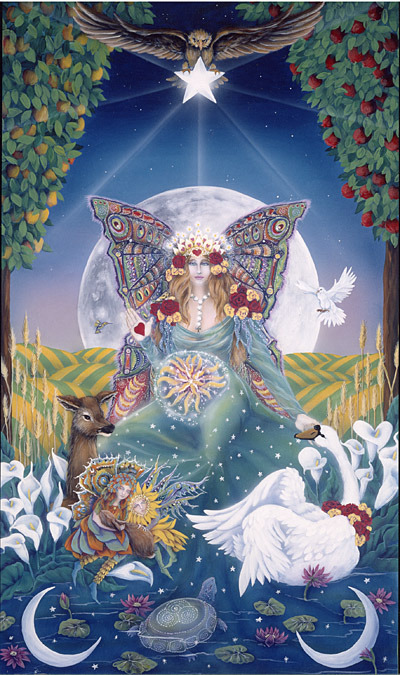

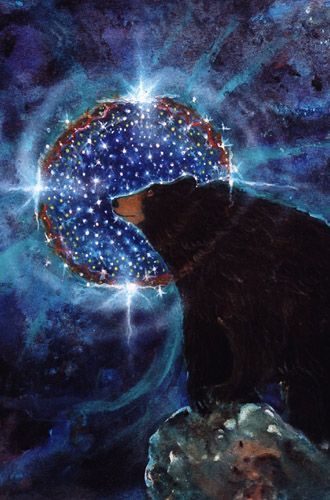
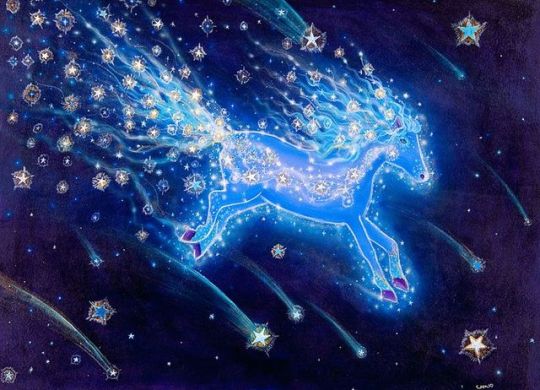
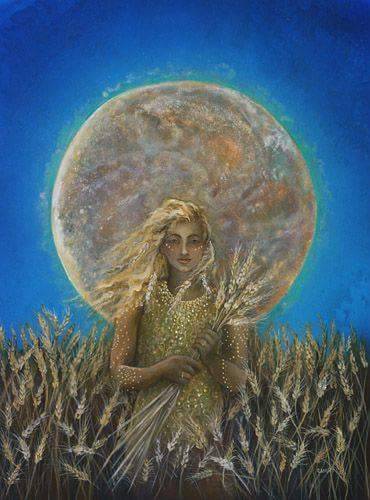



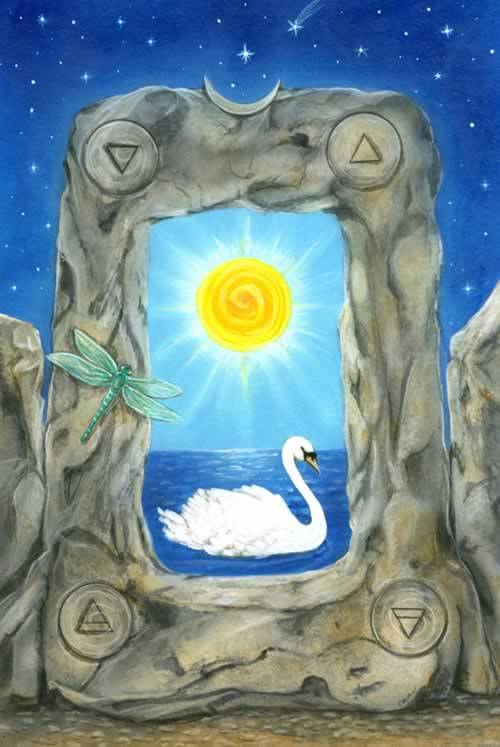

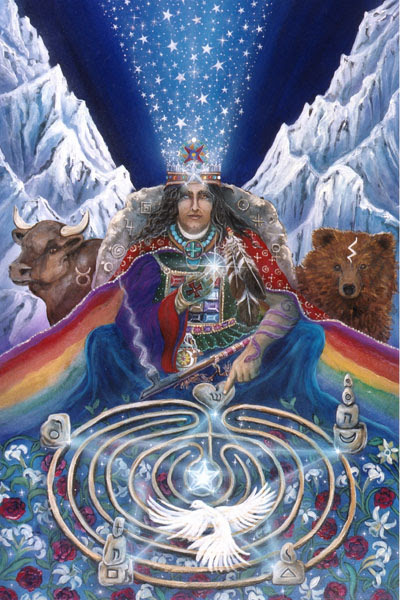
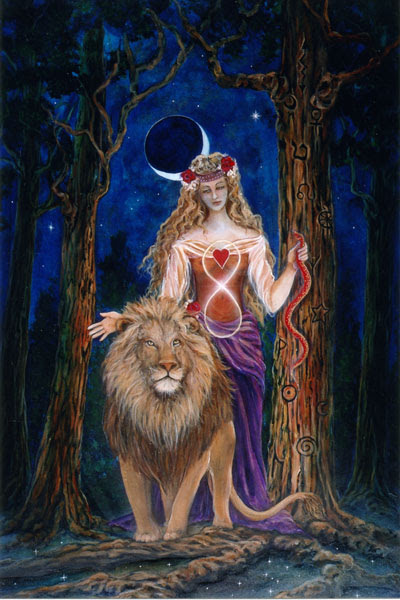


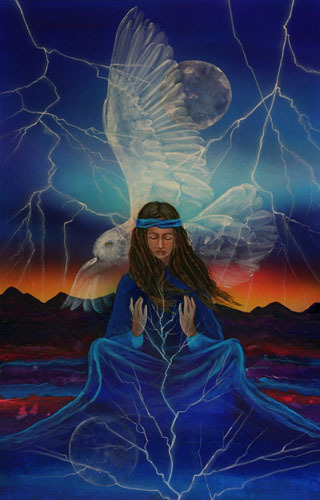

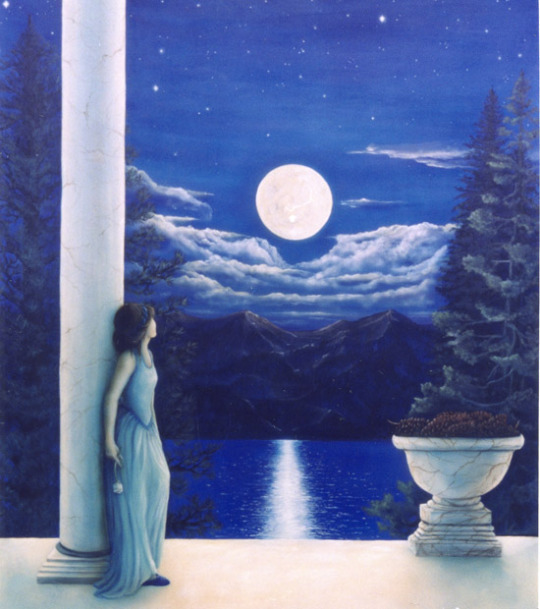
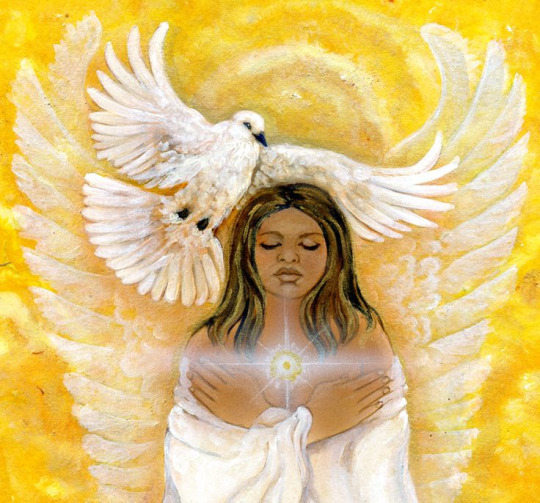
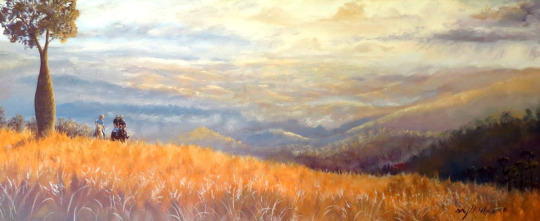

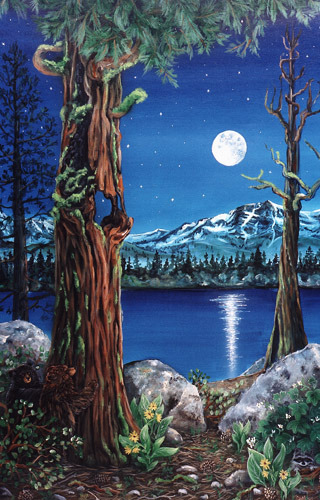


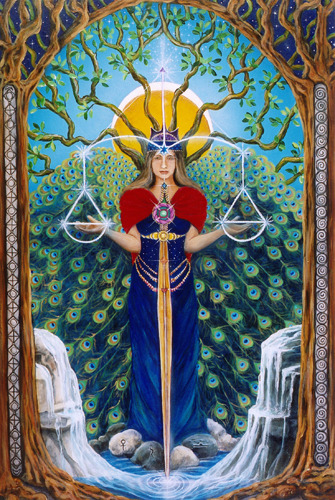



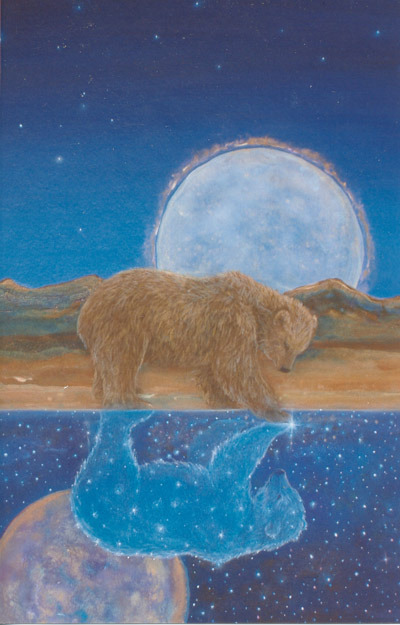


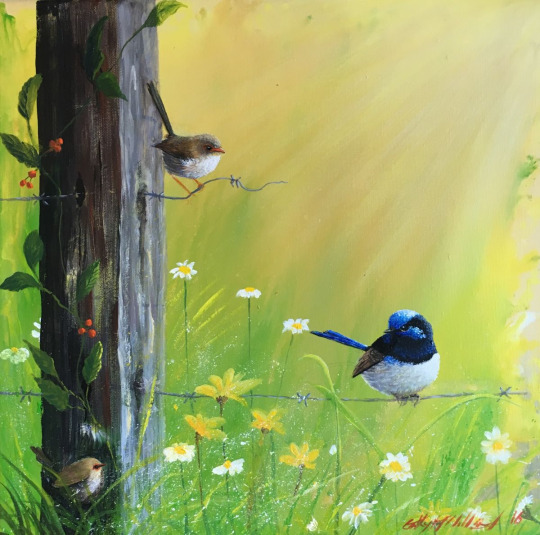

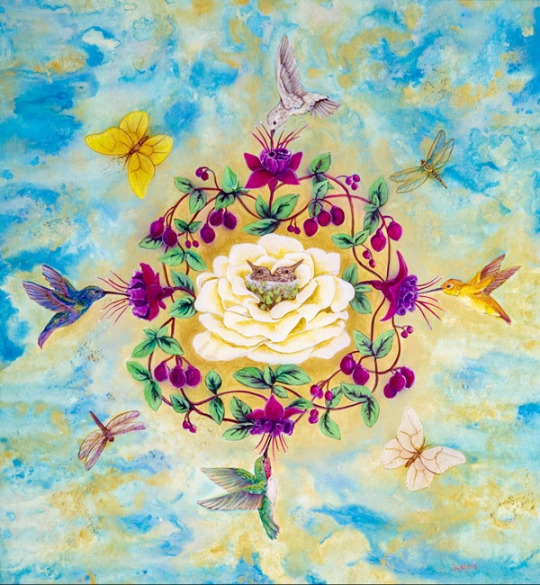
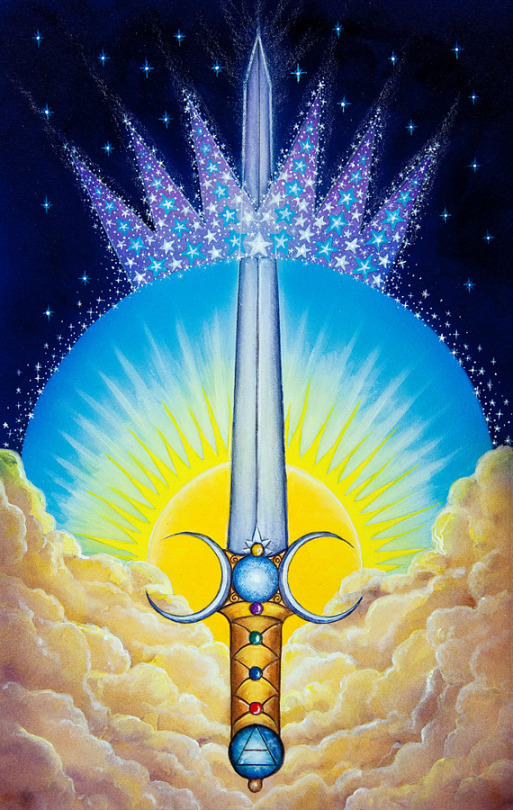


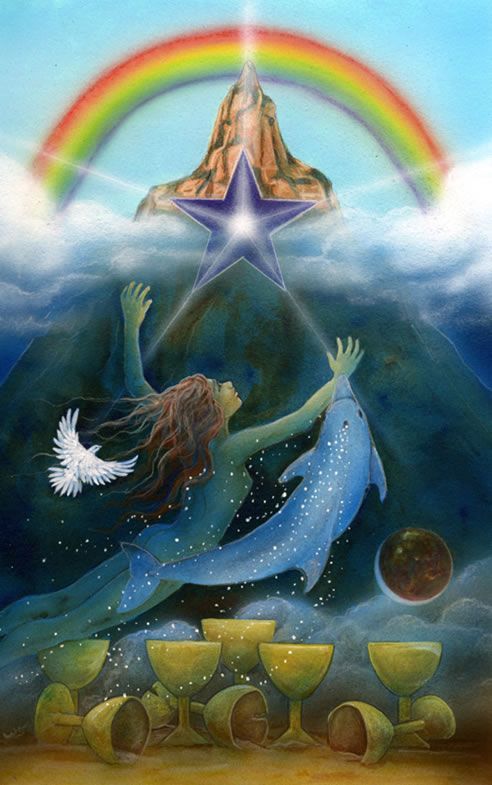
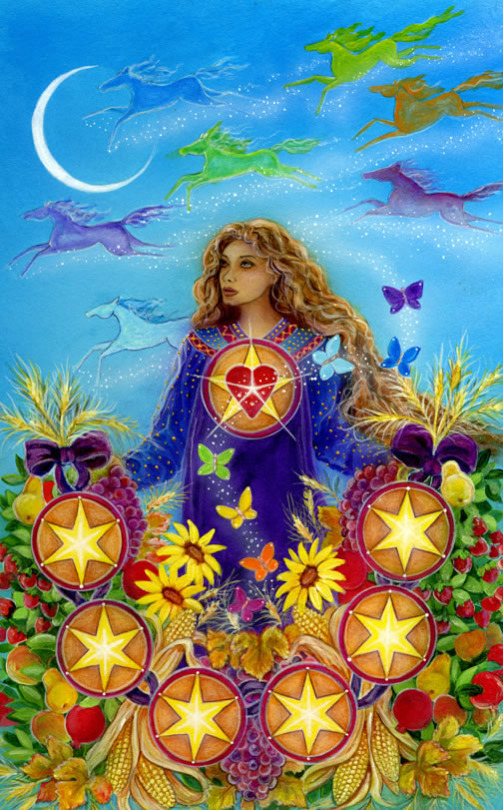
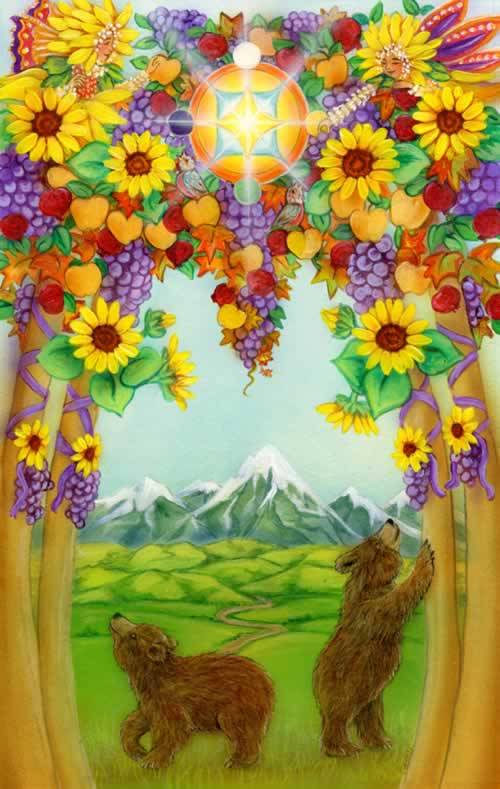
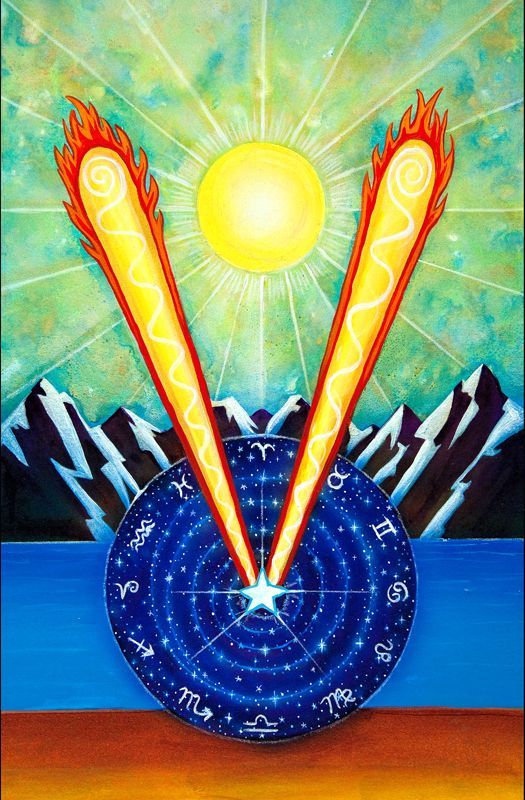

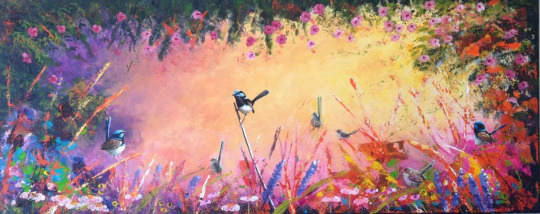

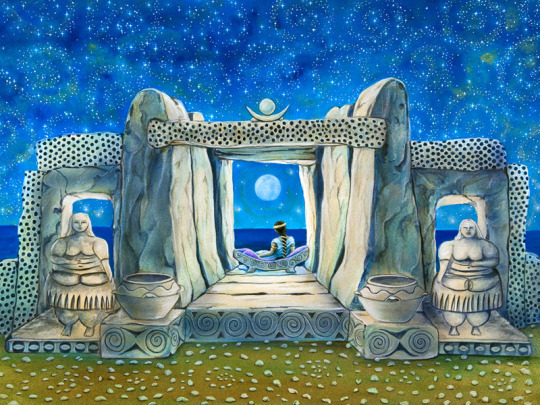
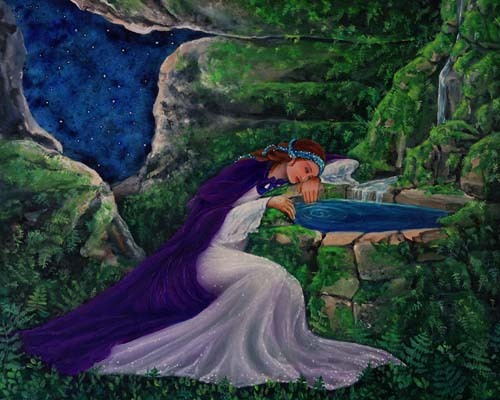


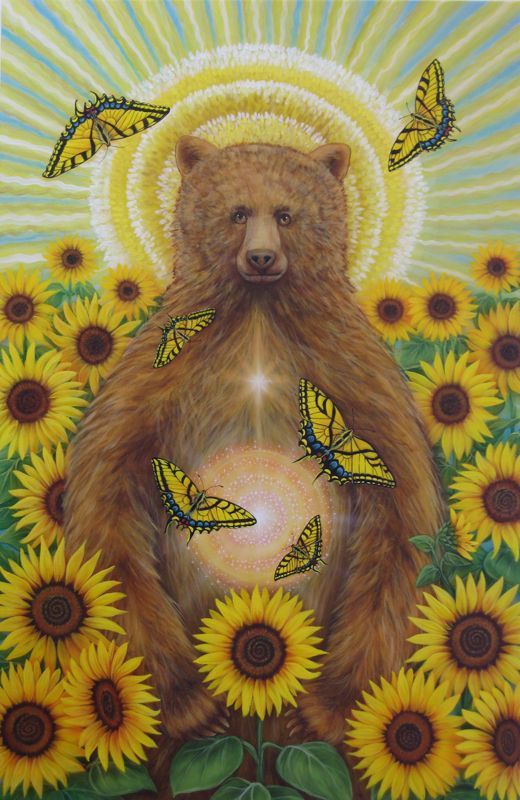
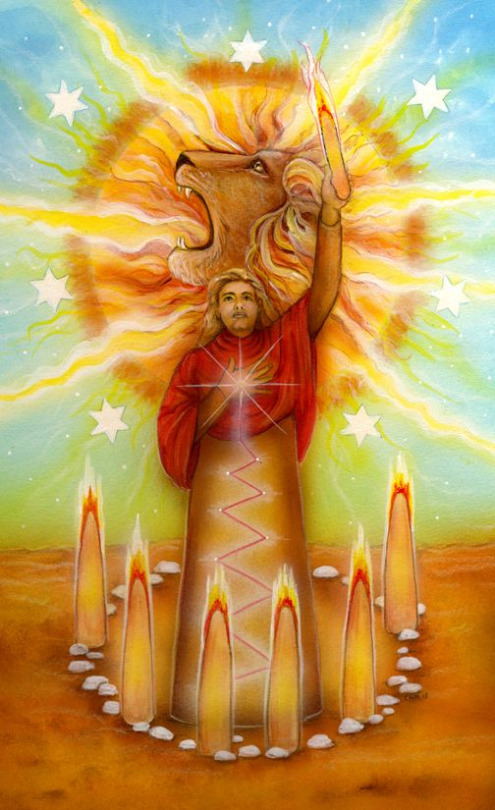
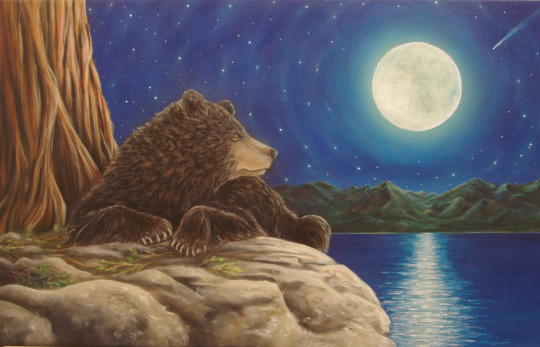
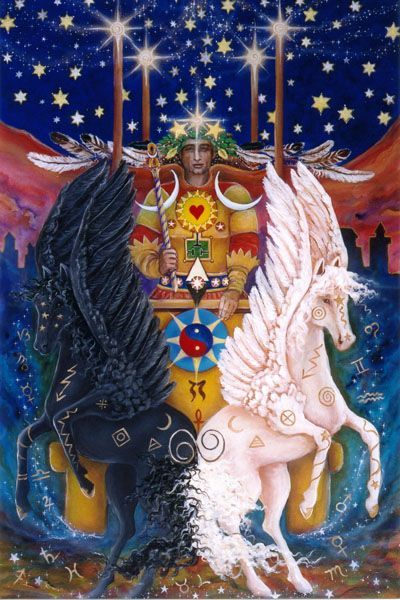


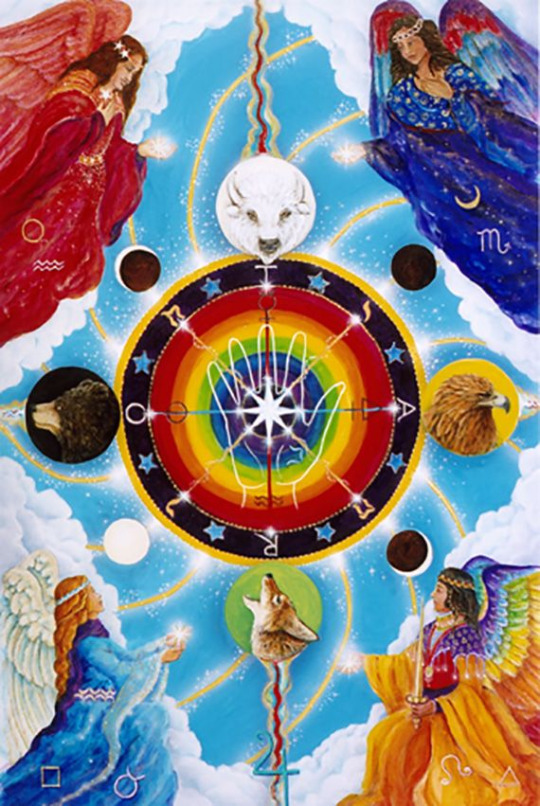
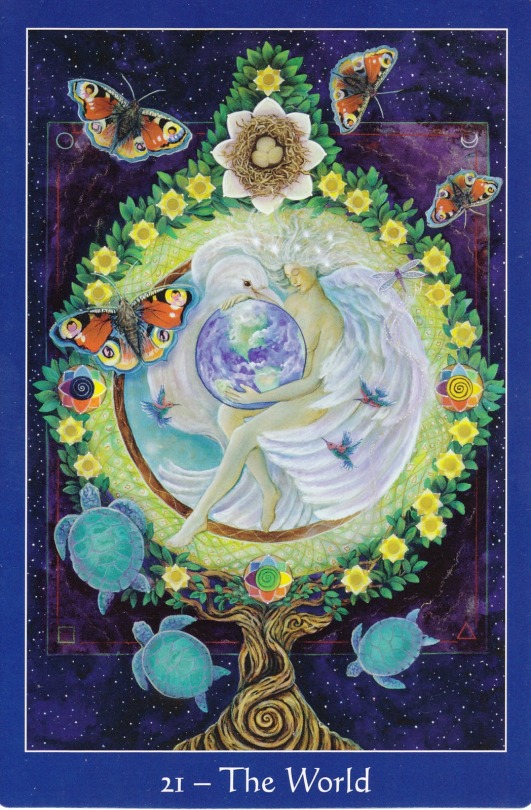
Cathy McClelland
Australian Painter
Cathy McClelland is a contemporary realist, wildlife and landscape Australian artist, working in acrylic, oils and mixed media.
A member of the prestigious International Guild of Realism, Australian Guild of Realist Artists, Wildlife Art Society of Australasia and Queensland Wildlife Artist Society Inc. and is a globally collected painter with work in private and corporate collections Australia wide and worldwide.
Cathy’s goal is to capture that fleeting moment in time that causes us to stop and pause from our busy day to appreciate nature and God’s beauty around us.
The paintings of Cathy McClelland show her love of the landscapes that surround her, she is a fifth generation cattle farmer at Bell where her pretty farm is snuggled into the foothills of the Bunya Mountains National Park and surrounded by beautiful views. It is here with her husband Wayne they raised four wonderful children, multitudes of animals, and have happy contented cattle grazing throughout their pastures. Cathy loves family, animals, photography and travelling.
Owning a cattle farm in the Western Downs, Queensland and being surrounded with big skies, wide open spaces and beautiful panoramic views, Cathy is passionate about country life and all things rural. Horses, dogs, old sheds, family farms and people are some of the subjects in her western paintings.
Being outdoors is her favourite place, it motivates her and is the source for studio work, the challenge is to capture that magic moment in time that caused her to go 'Wow look at that!' To capture the light that is flitting across the landscape or the birds that are singing around her, whether she's in a tangled rainforest or out in the wide open spaces of the Australian outback, the challenge is to paint what she's seeing and feeling at that present moment. Cathy is generationally tied to the local landscape as her ancestors were loggers and bullock team drovers on the Bunya Mountains cutting down the rain forest for their survival, and now she paints the wildlife and landscapes to help protect and bring awareness to them worldwide. Here you can journey with her as she hikes with her brushes through this beautiful national park discovering never ending vistas, secluded corners, trickling streams and tumbling waterfalls.
The Tapdancer paintings have proven to be very popular with Cathy's collectors and this idea was birthed after a long morning mustering in the hot summer sun, Cathy and her family were resting in the cool shade of an old tank stand, having lunch and watching a little Blue Wren playing around an old tap, her youngest daughter said, 'look Mummy he's a Tapdancer' and as they say the rest is history!
A new chapter in her life has started as Cathy and Wayne moved to the beautiful garden city of Toowoomba, she is enjoying hiking with her camera and painting en plein-air, discovering historical quaint cottages, tree shrouded streets, hidden rainforest gullies and magnificent panoramic views. These historical buildings invite us to enter into the world of earlier Australians. We stand where others stood. We see their homes, their gardens, their workplaces, some restored to their former glory and some as they stand, being weathered by time, but all inviting us to ponder for a moment about those who have journeyed before us, the lives they lived, the times they had and the work they did.
COMMISSIONS ARE AVAILABLE SUBJECT TO SIZE, COMPLEXITY AND SCHEDULE. If you wish to order an original 'Memory Painting' of your favourite place maybe the family farm that's been in your family for generations, the family home or somewhere that's incredibly special to you, your favourite animal, bird or the unique Australian countryside, please feel free to contact Cathy and you can discuss your ideas for your original commission painting. Cathy Creates Memories in Paint!
Cathy has exhibited in International Exhibitions in New York and London and won many awards, her works hang in private and corporate collections worldwide.
She paint’s with honesty and integrity the subject of choice with a flowing composition that sits easy on the eye. She has a gift of portraying the essence of the place, “You feel like you can walk right into the painting” and she has a natural ability to see beyond the ‘picturesque’ beauty of a scene. She can also feel the spirit of the landscape and paints this feeling – an emotional response to the scene – rather than painting a literal depiction”.
Born in Dalby, Queensland, Australia and being the fifth generation to live and work on the family farm, she has always had a passion for nature. As a child Cathy rode and hiked around her farm and local National Parks, observing and drawing the birds and wildlife in their natural habitat. This passion has turned into her life as she now paints what she has seen and experienced, her paintings are the diary of her life lived through the brush. They show and embrace the awe Cathy feels when out in the landscape; it is the little things that inspire, a sunbeam lit up through the clouds, a scene that is touched with golden light, the unique flora and fauna of Australia. Cathy has had the opportunity to closely study how animals and birds relate to each other and observe the ever changing effects of the beautiful landscapes and this observation shows in her artwork.
As with most Artists, Cathy’s work is ever evolving, developing interesting textures, new colours and experimenting with new techniques. She paints as she feels on the day and is not constricted by a singular style, just enjoying the freedom to experiment and create pictures that are often sentimental, compelling, soul stirring and memories for collectors.
Cathy McClelland is the fifth generation to own the family farm since selection in the 1860s in Bell, Queensland. A beautiful spot in the hills, cloaked with sub-tropical vine scrub, Brigalow and Bottle Trees in an area surrounded with character, history and faded beauty but all of that adds to the charm of this small community in the foothills of the Bunya Mountains, to the north east of Dalby, that is being overseen day and night by the brooding mystery and grandeur of the Bunya Mountains and it is here that her love with painting began. The Bunya's are in her blood with her ancestors being bullock team drovers and loggers on the Bunya's, Cathy now paints to protect this unique environment. This passion, when combined with a natural talent for art and a flair for color, was apt to become a potent force. Inspired by the native birds and animals that visit her farm to the panoramic views of the local region, she started creating visual stories through her paintings, creative narratives that explore her emotive responses to the landscape and her experiences within it. Cathy loves the wildlife, the chaos of the bush and the vast outback panoramas and her generational connection to the land adds layers of history and culture that are intricately woven together within her art. Her love of color originally attracted Cathy to training as a beauty therapist; then motherhood took command of her creative energies for many a year raising four children. During those years she tinkered with painting. But now devotes herself full time to what has become a lucrative expression of her deep and abiding knowledge of the local countryside of which she is so intrinsic a part. While working on the farm at Bell or hiking in the National Parks; Cathy is always observing the natural environment, a student of nature. This time spent studying the landscape, birds and wildlife has ensured authentic paintings that are rich in color and reflect her knowledge and innate understanding of her subjects. This passion has turned into her life as she paints what she has seen and experienced; Cathy's paintings embrace the awe she feels when out in the landscape. It is the little things that inspire her, a sunbeam lit up through the clouds, a scene that is touched with golden light, the unique flora and fauna of Australia. Cathy is always searching for that ‘special moment’ and uses photography as a reference tool to capture that split second movement of a bird or animal flitting through the bush. Cathy is fortunate in her lifetime to witness platypus playing in the cool Bunya Mountains streams and have dingoes, wallaby's, kangaroos, koalas, emus, pelicans, brolga's goanna's, shingle back and blue tongue lizards, sugar gliders and a myriad of birds visit her farm from the tiniest of superb blue wrens to the soaring majestic wedge-tailed eagles. While exploring the Australian countryside, she has loved discovering the amazing Great Barrier Reef ecosystem, the little fairy penguins coming ashore to their nesting burrows at Phillip Island, mutton birds at Muttonbird Island Nature Reserve, fur seals at Port Fairy, the endangered rufous bristle bird and the wandering albatross along the Great Ocean Road scenic drive. Cathy believes the national parks in Australia are essential for our native flora and fauna to survive and continue to thrive in a protected environment for our future generations. Being inspired by such great artists as J. M. W. Turner & Robert Bateman, Cathy's work is quintessentially about trying to capture the poetic subtleties of the light and the beauty of the moment. Although her paintings vary in style and subject the underlying concept remains the same, she is exploring that particular moment in time through the essence of who she is, negotiating different ways to find the poetry and truth in the subject. This process enables her to connect on a deeper level where she can tease out the individual likeness of what she sees: exploring marks, color and texture to bring the subject to life. Demand for Cathy's paintings continue to grow as she strives to create artworks for the discerning collector, her Tapdancers are proving very popular among her collectors.
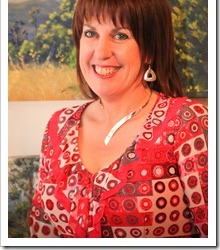
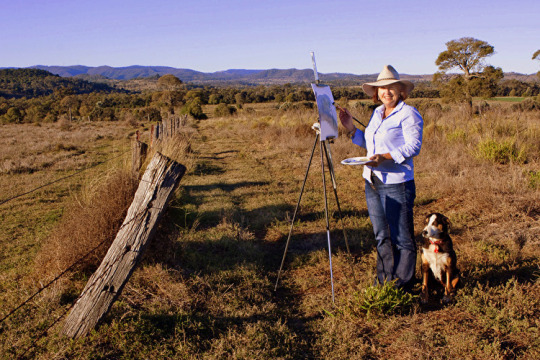
0 notes